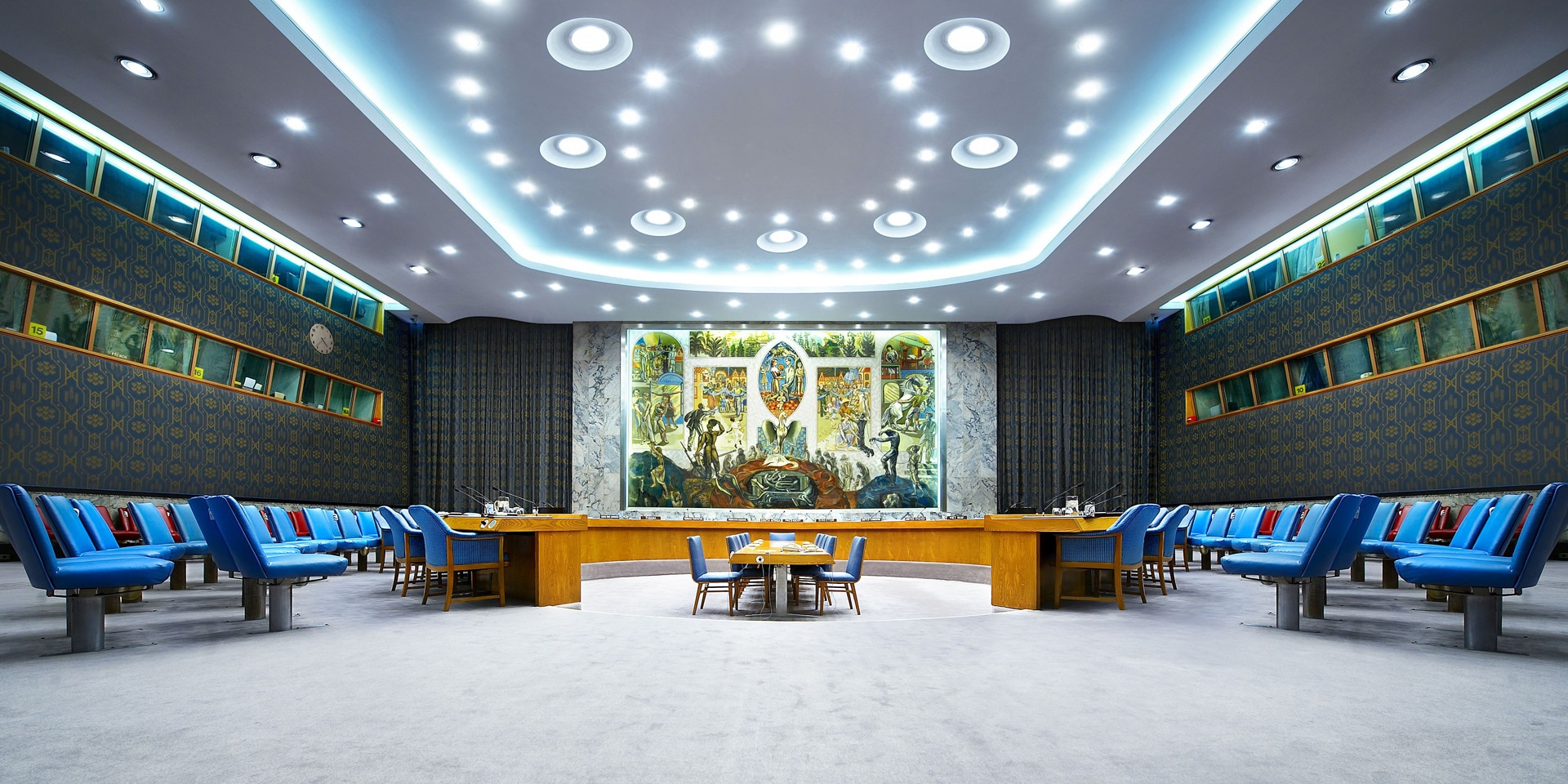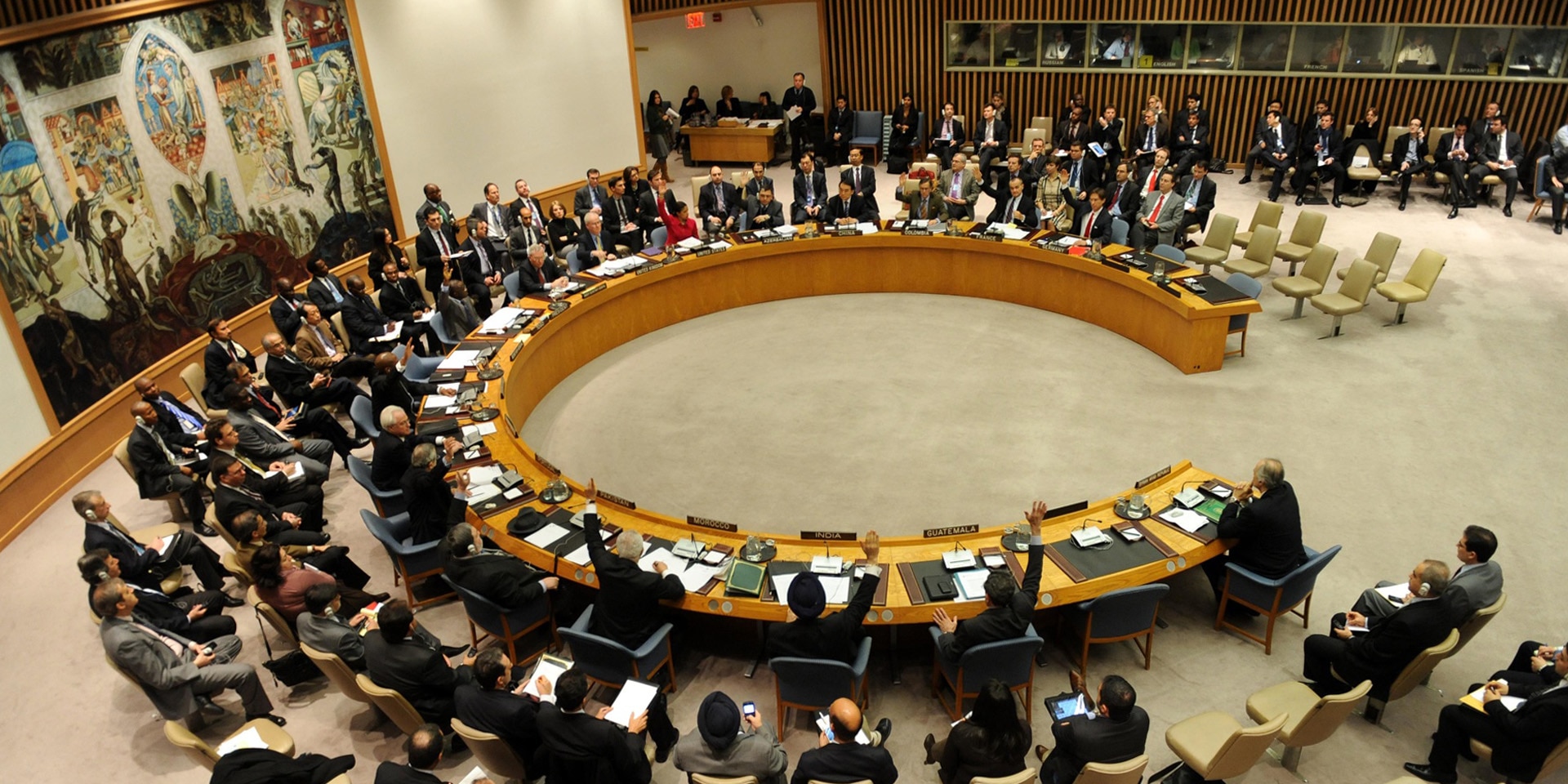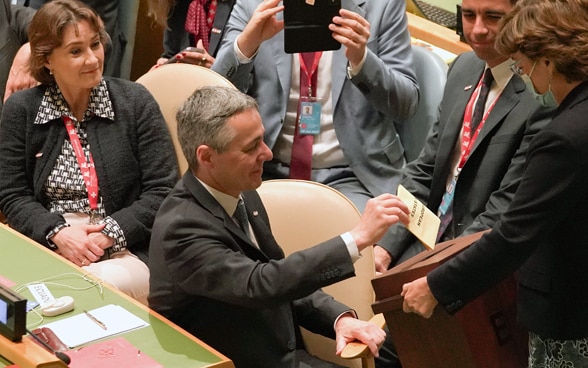Switzerland’s seat on the UN Security Council
In 2023 and 2024, Switzerland held a seat on the UN Security Council. A two-year term of office marked by geopolitical tensions. In spite of these challenging conditions, Switzerland was able to make an impact and contribute to advancing its foreign policy goals. Scroll the newsticker for background information about Switzerland's Security Council activities and statements.
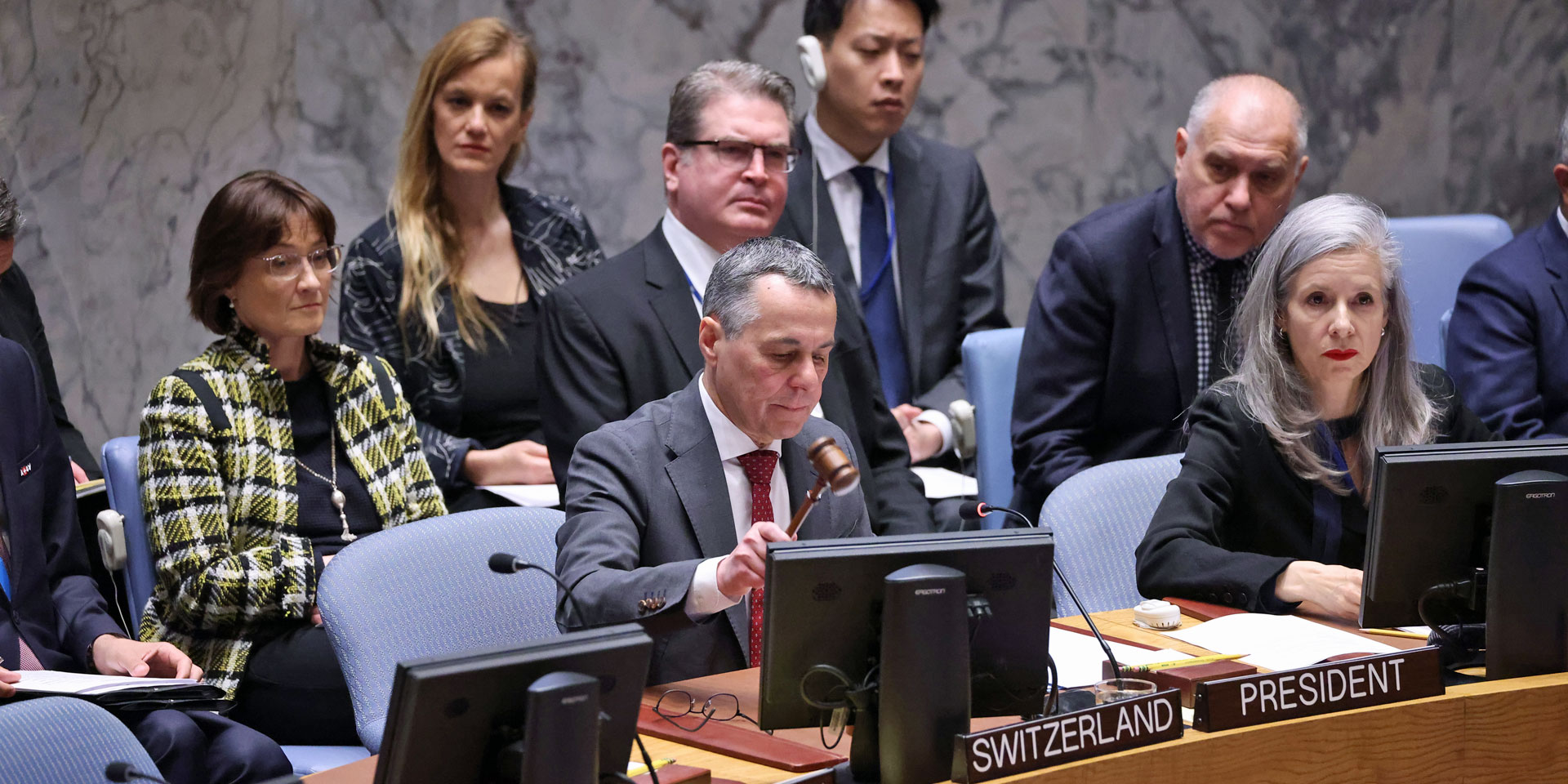
Federal Councillor Ignazio Cassis chaired a debate of the UN Security Council on 3 May 2023, which focused on building trust. © FDFA
Composition of the UN Security Council 2024
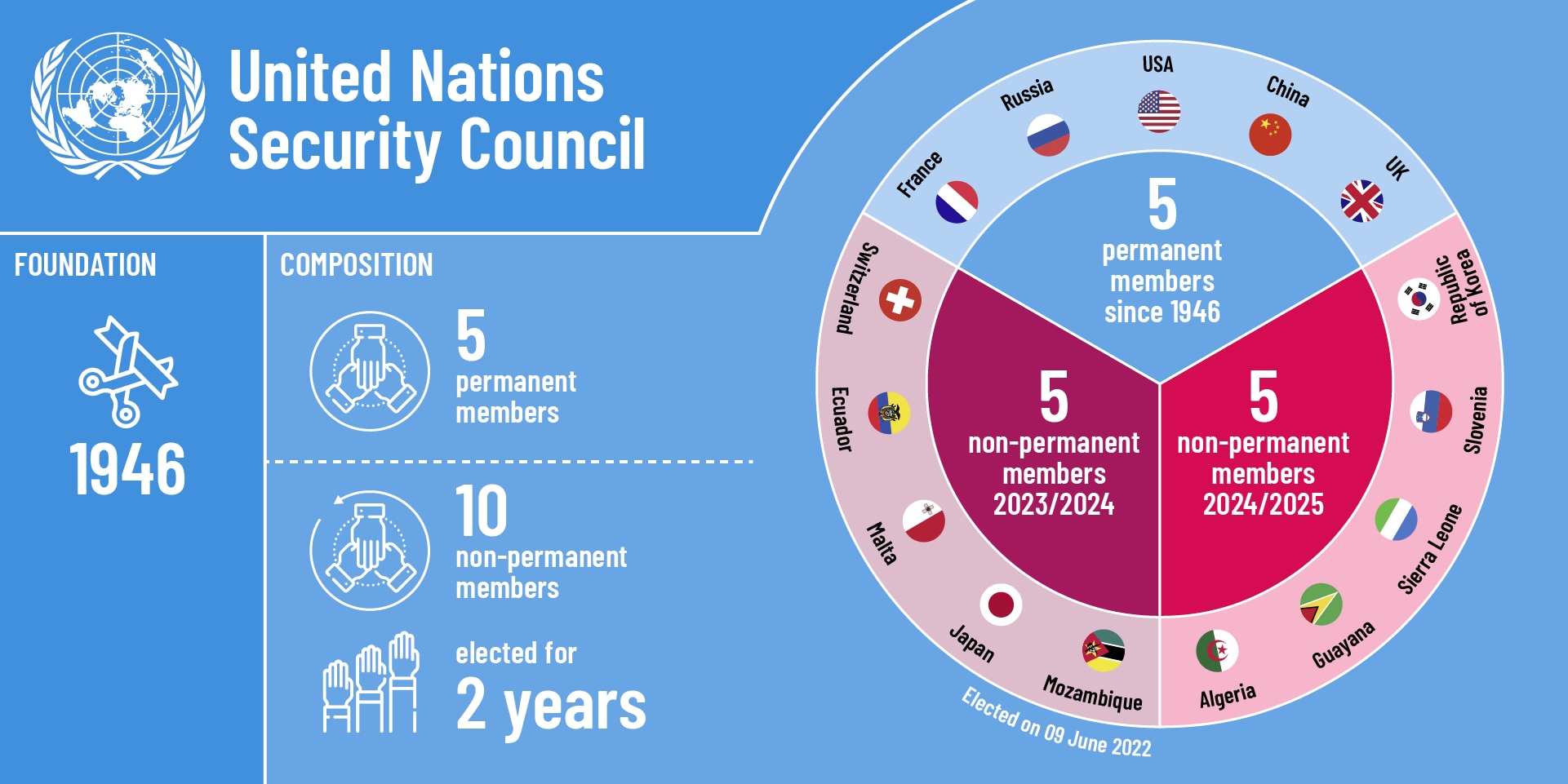
Switzerland's priorities and roles in the UN Security Council
Priorities
On 31 August 2022, the Federal Council outlined four priorities for Switzerland's seat on the UN Security Council:
- Building sustainable peace
- Protecting civilians
- Enhancing effectiveness
- Addressing climate security
Switzerland strives for credible engagement in the Security Council across the full range of its agenda.
The Swiss priorities in detail
Roles of Switzerland
Lead / Penholderships:
- Co-penholdership for Syria (humanitarian)
- Co-penholdership for the UN Office for West Africa and the Sahel (UNOWAS) jointly with Sierra Leone
Chair of subsidiary bodies:
- Chair of the Sanctions Committee on the Democratic Republic of North Korea
- Co-chair of the Informal Expert Group on Women, Peace and Security, jointly with Sierra Leone
- Co-Chair of the Informal Expert Group on Climate and Security, jointly with Mozambique
- Focal Point on Hunger and Conflict, co-chaired with Guyana
- Focal Point on the International Criminal Court (ICC), jointly with Japan
- Co-chair of the Informal Expert Group on the Protection of Civilians, jointly with the United Kingdom
Switzerland’s Working Methods Commitments in the UN Security Council (PDF, 1 Page, 74.4 kB, English)
Voting behaviour of Switzerland and monthly overview
Voting behaviour of Switzerland in the UN Security Council
Monthly overview
Work Programme of the UN Security Council, UN
Commented work programme of the UN Security Council, Security Council Report
14.03.2025 – Review of Switzerland's UN Security Council seat
At the Federal Council meeting of 14 March 2025, the FDFA reported on Switzerland's first membership of the UN Security Council (2023–24), a two-year term of office marked by geopolitical tensions. In spite of these challenging conditions, Switzerland was able to make an impact and contribute to advancing its foreign policy goals.
The Swiss delegation to the Security Council focused on four main areas: building sustainable peace, protecting civilians, enhancing the Council's effectiveness and addressing climate security. These are the same priority fields of action as for Swiss diplomacy and peace policy.
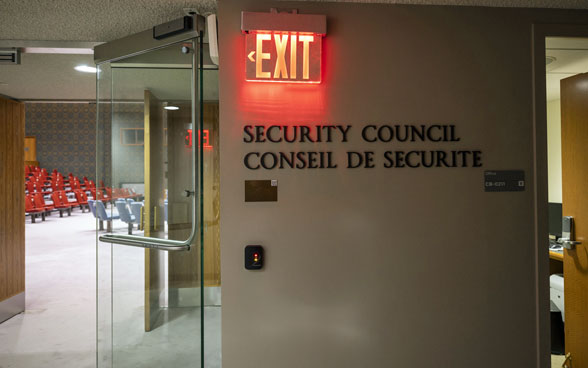
The FDFA's overall evaluation of Switzerland's first Security Council membership is positive. As the Council is a reflection of global power politics and its growing polarisation, it is not flawless – but it is still a key instrument for maintaining international peace. Despite global crises such as the war in Ukraine and the conflict in the Middle East, Switzerland was able to make an impact and contribute to the Council's ability to act.
Outcomes
The Swiss delegation introduced key initiatives and set important priorities during its Council membership, such as Resolution 2730 on the protection of humanitarian and UN personnel in conflict zones. This was tabled by Switzerland, which also chaired a Council meeting resulting in a presidential statement (PRST 2024/6) on the impact of scientific developments on peace and security. In addition, Switzerland organised a visit of Council members to Geneva to mark the 75th anniversary of the Geneva Conventions, which enshrine humanitarian protection in international law. During its membership period, Switzerland maintained its advocacy for compliance with international law, particularly international humanitarian law and human rights, in all relevant contexts.
Cooperation with Federal Council and Parliament
As agreed prior to taking up the Swiss seat on the Security Council, the FDFA ensured that all decisions of major importance to domestic or foreign policy were taken in close consultation with the Federal Council and the Foreign Affairs Committees. The FDFA also made regular reports to the Federal Council and Parliament on Security Council developments so as to ensure transparency and coordination in terms of Swiss foreign policy.
Setting the course for the future
These last two years have shown that Switzerland has the necessary skills and diplomatic experience to assume responsibility in multilateral bodies again in future. With its membership of the UN Human Rights Council (2025–27) and OSCE chairpersonship (2026), Switzerland continues to be an active voice, contributing to a rules-based world order and more peaceful future.
Final report on Switzerland's UN Security Council seat (2023–24) (PDF, 33 Pages, 1.3 MB, German)
01.01.2025 – Switzerland's term on the UN Security Council has come to an end
Switzerland's term as a non-permanent member of the UN Security Council came to an end on 31 December 2024. Its membership of the Council has fallen at a geopolitically tense time with conflicts in Ukraine, the Middle East and Sudan. During this time, Switzerland has been active in the framework of its four thematic priorities (building sustainable peace, protecting civilians, addressing climate security and enhancing the effectiveness of the Security Council). The FDFA will now analyse in detail the achievements and challenges of the past two years. On the basis of the results of this analysis, the FDFA will take stock at the beginning of 2025 and prepare a political assessment for the attention of the Federal Council and Parliament.
Twenty years after joining the UN, Switzerland sought its first non-permanent seat on the UN Security Council for a two-year term. The Federal Council approved the candidature and submitted it in 2011 after extensive consultations with Parliament. On 9 June 2022, the UN General Assembly elected Switzerland with 187 of 190 votes in New York. Switzerland took up its seat on the Security Council on 1 January 2023.
30.12.2024 – Switzerland condemns the spiral of violence in the Middle East
The UN Security Council held an emergency meeting today to discuss the escalating situation between the Yemeni Houthis and Israel. The Houthis' unacceptable drone and rocket attacks on Israel have increased sharply in recent days, destroying a school in Ramat Gan and hitting a playground in Jaffa, among other things, and causing casualties. Israel also carried out air strikes in Yemen, including on the civilian airport in Sana'a. These attacks killed and injured people. One of the wounded was a UN employee. The delegation of the Director-General of the World Health Organization, which was at the airport in Sana'a, escaped unharmed. Switzerland condemns the spiral of violence and calls on all parties to respect international law and exercise restraint.
In New York, Switzerland emphasised three key points:
- Respect for international law
The use of force must be strictly limited to the exercise of self-defence. During the conduct of hostilities, the principles of distinction, proportionality and precaution must be respected in order to protect the civilian population and civilian infrastructure. This also includes UN Security Council Resolution 2730, which emphasises the protection of humanitarian and UN personnel. - Arms embargo
The embargo against the Houthis must be strictly adhered to in order to contain the spread of weapons in the region. - Return to dialogue
Diplomacy, de-escalation and political solutions are the only way to achieve peace and stability. This applies to the entire region: the attacks in Yemen, Israel and Syria must stop. In Gaza, a ceasefire and the release of all hostages are urgently needed.
Switzerland emphasised that it remains committed to upholding international law and protecting civilians, even after its term on the Security Council has ended, and called on the UN Security Council to do the same and to contribute to diplomatic solutions for peace and stability.
Statement of Switzerland's on the situation in Yemen, UN Security Council, 30.12.2024
20.12.2024 – The Security Council extends the mandate of the UN observer force in the Golan Heights
The UN Security Council today unanimously extended the mandate of the United Nations Disengagement Observer Force (UNDOF) in the Golan Heights for a further six months. UNDOF was established by the UN Security Council in 1974. Its main task is to monitor respect for the ceasefire between Israel and Syria and the demilitarised zone.
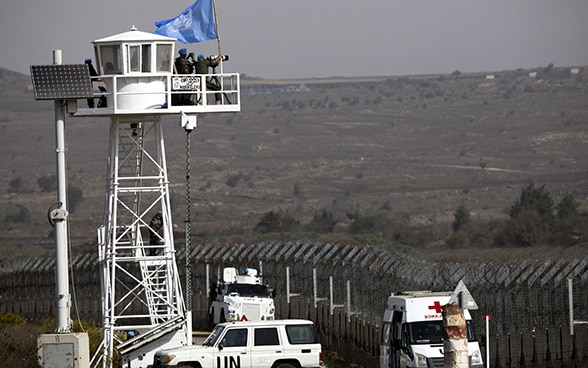
Switzerland voted in favour of the extension in the Security Council. UNDOF makes a crucial contribution to preventing further destabilisation in this region. The current situation highlights the importance of the mission.
Switzerland is deeply concerned about the recent developments in the occupied Syrian Golan. It calls for an immediate end to all violations of the 1974 agreement. The Golan Heights are occupied territory and Israeli settlements there are illegal under international humanitarian law.
20.12.2024 – Adoption of measures to improve the working methods of the UN Security Council
For the first time since 2017, the UN Security Council has adopted a comprehensive revision of the framework document that sets out the Council's working methods and procedural practices. The so-called Presidential Note 507 serves as a guide to the Council's working methods and aims to improve transparency, efficiency and cooperation with non-members of the Council. As part of Switzerland's priority of enhancing effectiveness, Switzerland advocated in the negotiations for improving the processes, the ability to act and the accountability of the Council. For example, the use of the veto is for the first time specifically reported in the annual report. The updated measures help to streamline and modernise the Council's working methods, promote cooperation with the Peace Building Commission and support the participation and enhanced protection of external briefers, including civil society.
20.12.2024 – Opportunities and challenges for security in West Africa and the Sahel
The UN Security Council today discussed the challenges in West Africa and the Sahel region and the corresponding UNOWAS regional office. Switzerland is co-penholder in the Security Council on this issue. In this role, it contributed to the three-year extension of the UNOWAS mandate in January 2023.
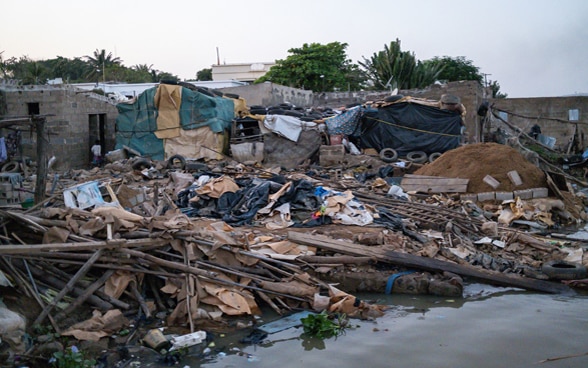
Insecurity remains one of the greatest challenges for the region. The ongoing threat of terrorism and violent extremism hinders not only peace and stability but also socio-economic and humanitarian development. In its statement in the Security Council, Switzerland called for increased international support for regional initiatives. It emphasised the importance of dialogue and social cohesion, as well as addressing the root causes of terrorism. In Burkina Faso, for example, Switzerland supports projects that address the root causes of conflict in order to create a basis for long-term peace and stability.
In the Security Council, Switzerland also emphasised the importance of inclusive dialogue, political stability and good governance in the region. Despite challenges and setbacks in some countries, the region is also showing positive developments, such as successful elections and power transitions in Nigeria, Senegal and Ghana. The inclusion of marginalised groups, women and young people in political processes is key to this.
Furthermore, the consequences of climate change pose significant security risks in West Africa and the Sahel. Climate change can intensify existing challenges such as humanitarian crises and development deficits. Events such as floods, droughts and desertification increase instability and can fuel extremism. However, Switzerland also sees climate change as an impetus to promote regional cooperation and strengthen social cohesion and resilience. In this context, it highlighted workshops and dialogues supported by UNOWAS in the Security Council to better understand and respond to climate risks.
19.12.2024 – Sudan: Switzerland calls for an improvement of the humanitarian situation and a cessation of hostilities
The situation in Sudan was at the centre of a briefing of the UN Security Council on 19 December, chaired by US Secretary of State Antony Blinken. In view of a further escalation of violence between the parties to the conflict, Switzerland emphasised the need for an immediate cessation of hostilities. During the briefing, Switzerland also reiterated the need for full compliance with international humanitarian law and human rights law, as well as the Jeddah commitments, by all parties to the conflict.
The humanitarian situation in Sudan has significantly deteriorated since the fighting began in April 2023. ‘We must continue to work to improve the humanitarian situation. During our term as a non-permanent member of the Security Council, we repeatedly called for rapid, safe and unhindered humanitarian access across all borders and front lines and for the removal of all obstacles,’ said Switzerland's representative, Ambassador Thomas Gürber. Switzerland is committed to maintaining its support in response to the situation in Sudan and has increased its humanitarian aid. So far, it has provided around CHF 100 million to its partner organisations, including the ICRC, the World Food Programme, the Office of the United Nations High Commissioner for Refugees and international NGOs. This aid is intended for activities in Sudan and in neighbouring countries that are also affected by the consequences of the crisis.
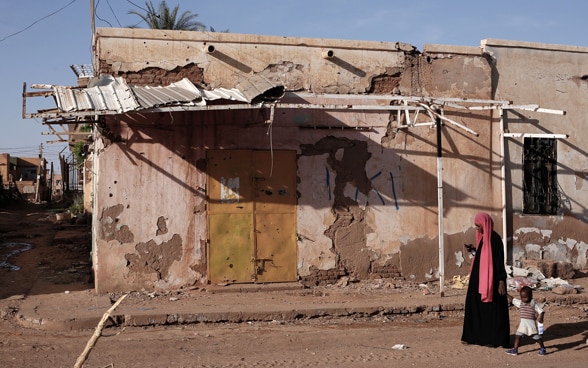
Accountability, which has been largely absent over the last 20 years, must also be ensured. ‘Without it, peace will remain out of reach,’ Gürber emphasised in New York. Finally, Switzerland called for diplomatic efforts to facilitate a Sudanese-led political process to be intensified. In this regard, Switzerland welcomes and supports the important engagement of the African Union and Sudan's neighbouring countries. As part of its good offices, Switzerland hosted the proximity talks held in Geneva under the auspices of the UN and continues to be available to support this process. It is also a member of the diplomatic coalition ‘Advancing Lifesaving and Peace in Sudan’ (ALPS), which was formed in connection with the Sudan Conference held in Switzerland in August 2024.
Switzerland's statement on the situation in Sudan, UN Security Council, 19.12.2024
19.12.2024 – The significance of artificial intelligence for peace and security
The UN Security Council, chaired by US Secretary of State Anthony Blinken, has addressed the growing significance of artificial intelligence (AI) for peace and security. In New York, Thomas Gürber, the FDFA's deputy state secretary, who represented Switzerland at the debate, emphasised that the rapid progress of AI must take place within the existing framework of international law, in particular the UN Charter, international humanitarian law and human rights.
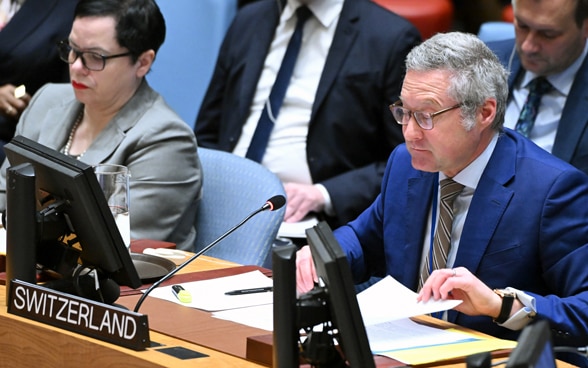
Switzerland highlighted three points in its statement:
1. Inclusive discussion on the governance of AI:
The Security Council should promote a comprehensive and inclusive discussion on the regulation and governance of AI. The countries that are leading the development of AI systems bear a special responsibility in this regard. At the same time, the UN offers an important platform for developing globally coordinated approaches. The involvement of all relevant actors – both state and non-state – is crucial in this regard.
2. The potential of AI for more effective implementation of the Security Council's mandates:
As a tool, AI can facilitate the implementation of Security Council mandates. Switzerland demonstrated this potential in May 2024 at an Arria-Gruppa meeting of the Council. In collaboration with the DiploFoundation in Geneva, it used an AI-based analysis tool that evaluated the data from ten Council meetings, with a particular focus on the ‘New Agenda for Peace’. Such tools can help to better substantiate decisions and to better target operational measures.
3. 1. Promoting safe and responsible artificial intelligence:
The Security Council must recognise the risks posed by AI and take preventive action. It is important to consider the impact of AI on peace and security at an early stage. Switzerland drew attention to its initiative in October 2024, which led to a briefing and a presidential statement. In it, the Security Council reaffirmed its intention to assess technological advances more systematically in order to anticipate possible implications for international security.
Thomas Gürber also highlighted the consequences of AI in crisis situations. During its two terms as president of the Security Council, Switzerland raised awareness of these challenges at the UN in New York through initiatives such as the ‘Digital Dilemmas’ and ‘Deep Fakes' exhibitions, which were organised in partnership with the ICRC. Furthermore, Switzerland is working with the UNHCR to use AI to improve the protection of refugees and displaced persons from digital risks, in particular misinformation, disinformation and hate speech.
In conclusion, Switzerland called on the Security Council to systematically incorporate the opportunities and risks associated with the further development of AI into its work and to take concrete political action.
18.12.2024 – UN Security Council: Israeli settlements in occupied Palestinian territory are illegal and an obstacle to peace
The UN Security Council discussed the situation in the Middle East today as part of the quarterly meeting on Security Council resolution 2334 from 2016, which relates to Israeli settlements in the occupied Palestinian territory.
In its statement in New York, Switzerland emphasised the protection of the civilian population and humanitarian personnel. Their safety remains precarious, particularly in Gaza, where the violence continues. Since the terrorist attacks by Hamas on 7 October 2023, which Switzerland has condemned in the strongest possible terms, more than 330 aid workers and tens of thousands of civilians have lost their lives in Gaza. Switzerland condemns such attacks in the strongest possible terms and calls for strict compliance with international humanitarian law.
In this context, Switzerland recalled the importance of its draft resolution 2730, which was adopted by the Security Council last May and which emphasises the protection of humanitarian and UN personnel in conflict zones. Switzerland reiterated its call in the Security Council for an immediate, unconditional and permanent ceasefire, the immediate and unconditional release of all hostages, and rapid and unhindered access for humanitarian aid.
In addition, Switzerland deeply regretted that the four resolutions adopted by the UN Security Council since 7 October 2023 had not been implemented. The same applies to resolution 2334. In this context, Switzerland reiterated its support for the advisory opinion of the International Court of Justice of 19 July 2024. There is no doubt about the illegality of the Israeli occupation of Palestinian territory since 1967. This occupation must end as soon as possible.
Violence in the West Bank, including East Jerusalem, is at an all-time high due to attacks by settlers and operations by Israeli security forces. Switzerland also expressed concern about the violence related to the presence of armed groups, particularly in Jenin. It reiterated its call on all parties to fulfil their obligations under international law. Operations in the West Bank must meet the criteria of necessity and proportionality and respect the right of every individual to life and personal security. All those who commit violence against civilians and deliberately destroy civilian property and infrastructure must be held accountable. Switzerland also reiterated that the Israeli settlements in the occupied Palestinian territory are illegal under international law, further fuel the spiral of violence and are a major obstacle to peace.
In conclusion, Switzerland reaffirmed its full support for the two-state solution, which is the only option for Israelis and Palestinians to live side by side in peace, security and dignity within secure and recognised borders.
Switzerland's statement on the situation in the Middle East, UN Security Council, 18 December 2024
17.12.2024 – Syria: appeal for an inclusive and orderly transition process
On 17 December, the UN Security Council once again addressed the situation in Syria following the overthrow of the government. After years of civil war, the Syrian population faces major challenges. At the Security Council, Switzerland emphasised that it is ready to support Syria in addressing these challenges. Switzerland's priorities are promoting justice, dialogue and reconciliation, and rebuilding the country based on the rule of law.
For years, Switzerland has emphasised that the conflict in Syria can only be resolved through an inclusive political solution. This solution must be developed by and for the Syrian people, mediated by the UN and its special envoy, and based on international law. In this context, Switzerland stated in New York that it remains ready to offer Geneva as a venue for peace talks and initiatives under the auspices of the UN. The basis for achieving a lasting solution is a nationwide ceasefire, respect for international humanitarian law and human rights, inclusive governance that involves women and civil society, and conducting free, transparent and fair elections.
The conflict, which has been ongoing since 2013, has left a lasting mark on Syria: more than half a million people have lost their lives, large parts of the civilian infrastructure have been destroyed, and over 90 per cent of the population lives below the poverty line. Switzerland has taken on a leading role in humanitarian issues in the Security Council. Particularly after the devastating earthquakes in February 2023, it was strongly committed to ensuring that humanitarian aid reached all those in need, regardless of the lines of conflict. In addition, 16 million people have been displaced by the civil war, many of whom are planning to return home. In the Security Council, Switzerland called for this return to be voluntary, safe and in accordance with international refugee law.
In conclusion, Switzerland reaffirmed its solidarity with the Syrian people. To this end, it provided an additional two million francs last week to respond to the latest developments. Switzerland thus continues to work for peace, justice and humanitarian support in Syria.
Statement by Switzerland on the current situation in Syria, UN Security Council, 17 December 2024
06.12.2024 – Humanitarian aid must reach those in need despite UN sanctions
Humanitarian aid often takes place in contexts affected by UN sanctions. On 6 December 2024, the UN Security Council unanimously adopted a resolution setting out humanitarian exemptions for all UN financial sanctions. The resolution underlines Switzerland's long-standing commitment to reducing the negative impact of sanctions on the civilian population and on humanitarian work. It protects the civilian population – a priority of the Federal Council for Switzerland's membership of the Council in 2023–24. Switzerland, together with the United States, put the resolution to the vote in the Security Council.
Article: Humanitarian aid must reach those in need despite UN sanctions
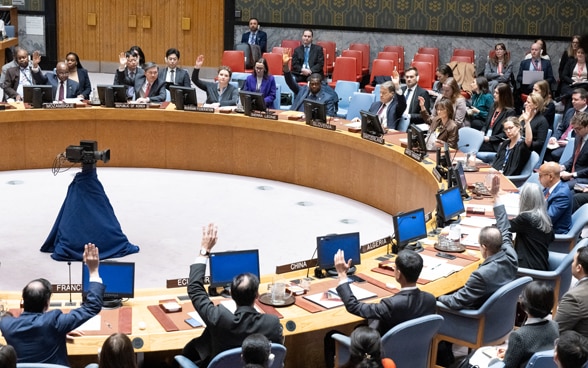
03.12.2024 – Syria: Switzerland calls in the Security Council to end hostilities
The UN Security Council held an emergency meeting today to address the latest developments in Syria. Speaking in New York, Switzerland expressed grave concern over the hostilities in the province of Idlib and the city of Aleppo. "This further escalation could have serious repercussions for peace and security in the country and across the entire region. It must stop immediately," Switzerland told the Security Council. It condemned the offensive by armed groups and the Syrian government's retaliatory attacks, which have led to the deaths of numerous civilians. In this context, Switzerland called on all parties to fulfill their obligations under international law, including international humanitarian law.
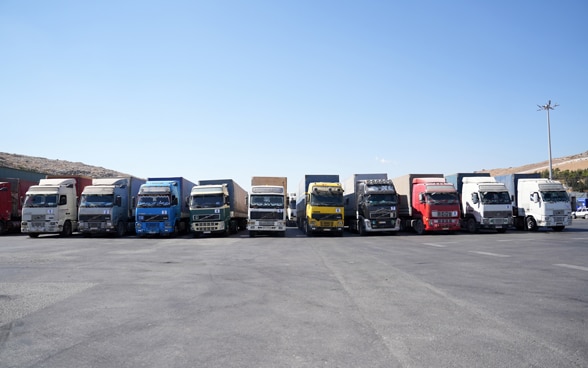
After 14 years of conflict, over 16 million people in Syria are in need of humanitarian aid. Switzerland is alarmed by reports that recent hostilities are jeopardizing the delivery of humanitarian assistance to northern and north-western Syria. The rapid, safe, and unimpeded delivery of aid is an obligation for all parties under international humanitarian law. It is therefore crucial that cross-border humanitarian aid to Syria continues without interruption. Furthermore, Switzerland emphasized that the safety of humanitarian and UN personnel must be guaranteed by the parties to the conflict, as mandated by the Security Council in Resolution 2730.
This escalation of hostilities is a consequence of the political vacuum and the absence of a political process in Syria. In New York, Switzerland called on all parties to the conflict to resume dialogue and commit to a credible peace process. “Only a political solution can bring an end to this devastating conflict,” Switzerland stated in the Council, reaffirming its readiness to support any initiatives and to facilitate peace talks under the auspices of the UN in Geneva, as a host state providing its good offices.
Switzerland's statement on the situation in Syria, UN Security Council, 03.12.2024
27.11.2024 – Emergency meeting on the current situation in Ukraine
During an emergency meeting of the UN Security Council, Switzerland condemned Russia's recent attacks on several regions in Ukraine. In New York, Switzerland recalled that attacks on the civilian population and civilian infrastructure are prohibited under international humanitarian law. All parties to the conflict are called upon to comply with international law, to protect the civilian population and to respect human rights. The precarious situation of nuclear facilities, in particular the Zaporizhzhia nuclear power plant, is a matter of particular concern. Attacks on Ukraine's energy infrastructure endanger nuclear security and safety and require urgent further attention.
At the emergency meeting, Switzerland deplored the damaging effects of Russia's aggression on the international disarmament and arms control architecture. It condemned in particular Russia's repeated nuclear threats and deplored reports of the use of a long-range ballistic missile against Ukraine. Switzerland also expressed concern about the use of irritants in combat in violation of the Chemical Weapons Convention in the context of war, as recently confirmed by the Organisation for the Prohibition of Chemical Weapons. Switzerland also expressed its deep concern about Russia's repeated use of anti-personnel mines and the recent report of the transfer of anti-personnel mines to Ukraine. It called on all states to fulfil their obligations under international law, including the obligations under the Ottawa Convention.
Finally, Switzerland called on Russia to immediately cease hostilities and withdraw its troops from Ukraine. As an elected member of the UN Security Council, Switzerland reaffirmed its support for the search for a just and lasting peace in Ukraine based on international law and the UN Charter. An end to the violence as well as a peaceful solution are urgently needed to prevent further suffering in Ukraine.
Statement by Switzerland on the current situation in Ukraine, UN Security Council, 27 November 2024
26.11.2024 – UN Security Council discusses Swiss resolution on the protection of humanitarian and UN personnel
The UN Security Council today discussed Resolution 2730, initiated by Switzerland, which was adopted on 24 May 2020. The resolution obliges UN member states to strengthen the protection of humanitarian and UN personnel. In view of the increasing violence against those providing assistance to millions of people worldwide, Switzerland emphasised in its statement that consistent implementation of the measures adopted in this resolution is important for the protection of civilians.
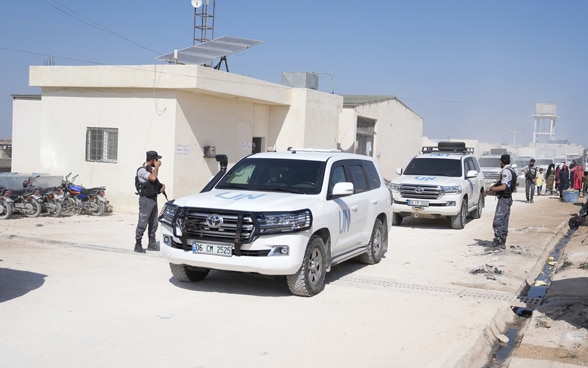
The briefing focused on the recommendations of the UN Secretary-General on how attacks on humanitarian and UN personnel can be better prevented and their protection strengthened. The Security Council had given the Secretary-General the mandate to develop these recommendations when it adopted Resolution 2730. The recommendations offer specific ways of improving the implementation of the resolution and international humanitarian law. In New York, Switzerland supported these recommendations and stressed the central role of international law, which is intended to ensure the protection of humanitarian personnel and accountability for violations. Among other things, it called on states to adapt national regulations to facilitate humanitarian work, reduce bureaucratic obstacles and introduce legal exemptions for humanitarian operations.
Switzerland also emphasised the responsibility to take targeted action against disinformation that undermines trust in humanitarian organisations. It is essential to provide factual information about the important work of humanitarian personnel and to ensure support for people in need.
Switzerland called on Security Council members to set aside political differences and put the protection of human life at the centre of their decisions. Resolution 2730 was co-sponsored by 98 states when it was adopted by the Security Council last May. Switzerland will continue its efforts to protect the lives of those who assist millions of people in need worldwide. In addition, in the run-up to the meeting, more than 100 states and the European Union reiterated their support for this resolution in a joint media stakeout.
26.11.2024 – Call to strengthen the Geneva Conventions
During a media stakeout at the UN headquarters in New York, Switzerland, as a member of the Security Council, called together with representatives of humanitarian organisations and more than 100 UN member states for compliance with international humanitarian law and the protection of the civilian population. Switzerland presented chairs, each with a letter of the message ‘War has limits’. These chairs, presented by Federal Councillor Ignazio Cassis during a visit by members of the Security Council to Geneva last August, symbolise the international community's responsibility to the Geneva Conventions and the millions of civilians they have saved over the last 75 years. These chairs will be presented to the members of the Security Council in the coming days.
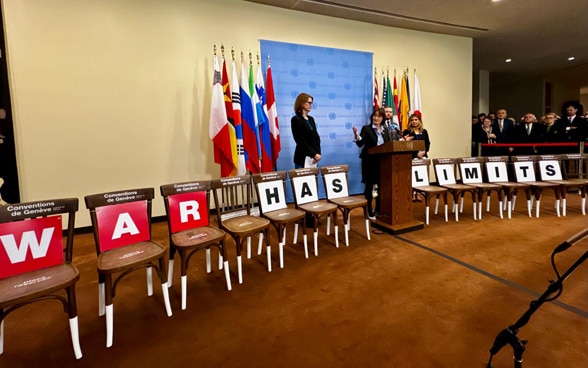
The message ‘War has limits’ on the chairs indicates that compliance with international humanitarian law must be made a political priority. The symbolic handover of the chairs to the UN Security Council reminds us that no state can bear this responsibility alone. Cooperation is the key to ensuring the effectiveness of the Geneva Conventions and preserving humanity even in the darkest of times.
War has limits
The Geneva Conventions set clear limits: wars must not be waged in defiance of humanity. With Resolution 2730, drafted by Switzerland and adopted by the Security Council in May 2024, a significant step was taken to enforce these rules. It reaffirms the protection of humanitarian and UN personnel, who in turn need security in order to provide assistance. International commitment is needed to improve the protection of civilians, to hold to account those responsible for violations, and to reaffirm the common commitment to alleviate human suffering.
The 75th year of the Geneva Conventions in 2024 is more than a commemoration – it is a call to the international community to recommit to the rules that protect lives. War has limits, and upholding those limits is a shared duty.
20.11.2024 – Middle East: Resolution for an immediate ceasefire and the release of hostages fails in the UN Security Council
A draft resolution for a ceasefire in Gaza was vetoed today by a permanent member of the UN Security Council. The resolution was negotiated and put to the vote by Switzerland together with the other nine non-permanent members of the Security Council. Among other things, the resolution would have called for:
- an immediate, unconditional and lasting ceasefire as well as the immediate and unconditional release of all hostages
- immediate access for the civilian population in Gaza to basic services and the facilitation of rapid and unimpeded import of large-scale humanitarian aid to and within the Gaza Strip
- full compliance by all parties with international law, including international humanitarian law, in particular for the protection of the civilians.
Switzerland supported the resolution in New York because it reflects the position of the Federal Council on the current situation in the Middle East. By adopting the draft resolution, the Security Council would have shown its grave concern about the ongoing catastrophic situation in Gaza, the lack of adequate health care and the threat of famine in Gaza. In addition, the Council would have deplored all attacks against civilians and all acts of terrorism. Furthermore, the Council members would have reaffirmed their commitment to the vision of a two-state solution, in which two democratic states, Israel and Palestine, coexist in peace within secure and recognised borders.
Switzerland supported the resolution in New York and regretted its failure. In its statement after the vote, it recalled that the obligations of all parties under international law remain unchanged regardless of the adoption or non-adoption of resolutions by the Security Council. "The violence and dehumanisation in this conflict must be brought to an end," Switzerland emphasised.
Switzerland's position following the vote, UN Security Council, 20.11.2024 (en, fr)
18.11.2024 – Ukraine: “Building peace requires courage and energy”
Federal Councillor Ignazio Cassis attended a United Nations Security Council briefing on the situation in Ukraine on 18 November, organised by the United Kingdom. On behalf of Switzerland, the Swiss foreign minister expressed deep concern about the recent massive attacks on Ukraine's energy infrastructure. These attacks pose a significant threat to the civilian population as winter approaches. In light of the human suffering caused by the ongoing illegal war against Ukraine, the head of the FDFA reiterated in New York Switzerland's call for strict compliance with international law, including international humanitarian law.
Recent developments on the ground underscore the gravity of the situation: reports of foreign military support for Russia – including troops allegedly deployed from the Democratic People's Republic of Korea – indicate an increasingly widespread conflict. This is compounded by the destabilisation of food security and energy supplies, as well as the nuclear threat and risks related to nuclear safety.
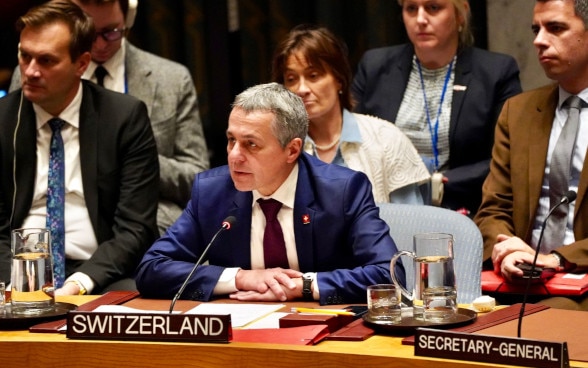
“After 1,000 days of war, the guns must fall silent! It is time to find a diplomatic solution,” said Mr. Cassis at the Security Council, urging Russia to end its military aggression against Ukraine. However, building peace requires courage and a united commitment to advance the diplomatic process, engage all parties – including Russia – in dialogue, and consistently advocate for adherence to the UN Charter, the Geneva Conventions, and the principles of humanity.
In June 2024, Switzerland hosted the first high-level discussion on peace at the Conference on Peace in Ukraine, held on the Bürgenstock. Switzerland remains ready to take on further responsibility in dialogue and mediation initiatives to promote peace in Ukraine, in full accordance with international law and the UN Charter.
18.11.2024 – Middle East: Federal Councillor Ignazio Cassis underlines the importance of the two-state solution at the UN Security Council
During the UK's presidency of the Council, Federal Councillor Ignazio Cassis participated in a UN Security Council meeting on the ongoing situation in the Middle East. “After more than a year of this appalling conflict, it is high time to decisively abandon the path of violence and dehumanisation,” emphasised the head of the FDFA in New York. Hamas continues to hold hostages, famine looms in the Gaza Strip, and regional tensions are escalating. Survivors in Gaza are suffering from hunger, injuries, and disease, as the health system has been nearly destroyed. At the Security Council, Mr Cassis, on behalf of Switzerland, condemned the hostilities of last weekend, during which Israeli fire destroyed a residential building, causing numerous civilian casualties, including many children. He also condemned Hamas's ongoing rocket attacks on Israel.
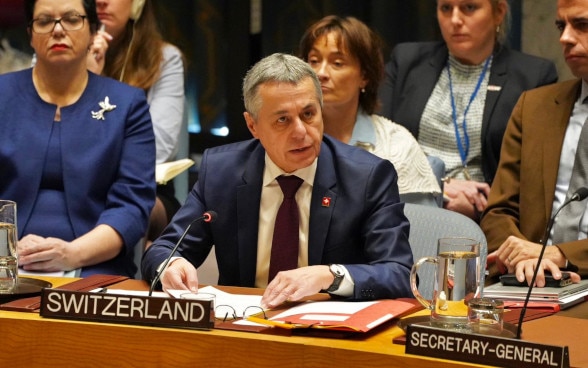
“Immediate action is needed by all actors involved in the conflict to protect civilians,” said Mr. Cassis. A ceasefire in Gaza and Lebanon, the immediate and unconditional release of hostages, and the rapid, unhindered delivery of humanitarian aid are urgently required. International law, including the UN Charter and international humanitarian law, must be respected by all parties without exception.
The adoption by the Knesset on 28 October 2024 of two laws concerning UNRWA, which are largely incompatible with international law and threaten humanitarian aid in Gaza, was also addressed. In this context, Switzerland reminded Israel at the Security Council of its obligations under international law as an occupying power to ensure that the basic needs of the population in the occupied Palestinian territory are met.
A new dynamic is essential to rediscover a shared sense of humanity and to work toward peace in accordance with international law and the UN Charter. “We know the political solution: It is the two-state solution that offers Israelis and Palestinians the prospect of living in peace and security,” said Cassis. The head of the FDFA expressed Switzerland's support for the efforts of the 94 states (including Switzerland) and organisations that convened in Riyadh at the end of October for the Global Alliance Conference on the Implementation of the Two-State Solution. Concrete proposals are needed to strengthen and reform the Palestinian Authority through legal, political, and economic measures. Switzerland will also participate in the Alliance's follow-up conference in Brussels on 28 November.
The head of the FDFA further stressed that investing in young people is crucial for achieving lasting peace in the Middle East: “I firmly believe that the younger generations are capable of pursuing the path of reconciliation and combating hatred and extremism. It is to these young people that we must be accountable for our actions.”
14.11.2024 – UN Security Council renews the mandate of the peacekeeping mission in the Central African Republic
The UN Security Council today unanimously renewed the mandate of the UN peacekeeping mission in the Central African Republic (MINUSCA). Despite several peace agreements, armed conflict continues in the country, regularly resulting in deaths and injuries, including among the civilian population. More than three million people are in need of humanitarian aid. The protection of the civilian population is one of the main concerns of MINUSCA, which is helping to stabilise the situation on the ground and to advance peace efforts in the country.
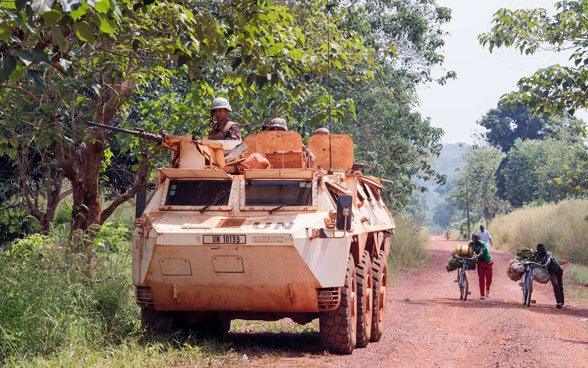
Switzerland is committed to sustainable peace and the protection of civilians in the UN Security Council and as part of its foreign policy, and supported the renewal of MINUSCA's mandate in New York. Further stabilising the country and strengthening national and local institutions are key to consolidating peace in the Central African Republic, where parts of the population are still affected by daily violence. Switzerland sees opportunities to address the uncertainties in the Central African Republic, particularly in inclusive political processes that take into account the rights of women, as well as compliance with international humanitarian law and human rights.
Since 2022, Switzerland has been one of the very few countries to be represented in the capital Bangui with a humanitarian office and has close and high-level exchanges with the government, MINUSCA and other partners. The engagement focuses particularly on the protection of the civilian population, respect for human rights and international humanitarian law, the fight against impunity and the strengthening of democracy. Together with MINUSCA and other actors, Switzerland is thus supporting the Central African Republic on its way to a more stable and secure future.
12.11.2024 – Emergency meeting on the threat of famine in Gaza
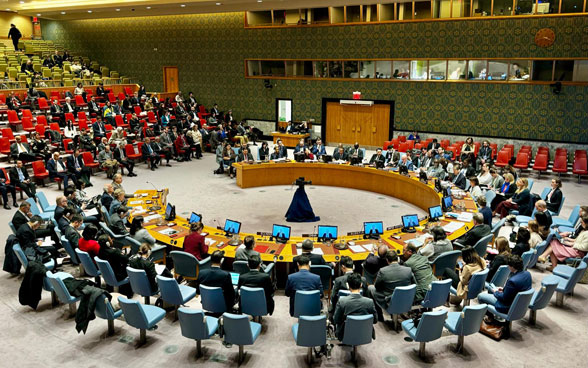
Switzerland, together with Guyana, has requested an emergency meeting on the humanitarian situation in Gaza in its role as ‘Co-Focal Point for Conflict and Hunger’. Switzerland is deeply concerned about the latest report of the ‘Integrated Food Security Phase Classification’ (IPC), which warns of an imminent famine in the Gaza Strip. According to the IPC, the probability of the worst-case scenario of famine in the Gaza Strip, particularly in the north, is increasing. Under international humanitarian law, all parties to the conflict are obliged to ensure rapid and unimpeded humanitarian access to all civilians in need. As the occupying power, Israel must also ensure, within its means, that the basic needs of the population in the Gaza Strip are met. At the Security Council, Switzerland recalled that the use of starvation as a method of warfare is prohibited by international humanitarian law and constitutes a war crime for which those responsible must be held accountable.
In view of the current situation in the Middle East, a ceasefire is essential. Switzerland also calls for the immediate and unconditional release of hostages. It is constructively engaged in ongoing negotiations for a potential new resolution on the situation in the Gaza Strip.
In New York, Switzerland once again urged all parties to comply with international humanitarian law under all circumstances and to take immediate action to protect the civilian population. It also reiterated that humanitarian personnel must be protected and must not be targeted. In this context, Switzerland stressed to the Security Council the importance of local staff of humanitarian organizations in the Middle East and the central role of UNRWA in providing basic services.
In conclusion, Switzerland called on Council members to take action to end human suffering and restore a political horizon for peace in the Middle East.
Switzerland's statement on the situation in the Middle East, UN Security Council, 12.11.2024
12.11.2024 – Sudan: an immediate ceasefire must be the top priority
The UN Security Council addressed the situation in Sudan today. Fighting and violence against civilians continue to escalate and humanitarian needs are enormous. “Attacks on civilians must stop immediately. Protecting them is not a choice, but an obligation”, Switzerland emphasized in New York. It also stated that an immediate cessation of hostilities must be a priority. This is the most effective and only way to strengthen the security and protection of the Sudanese civilian population.
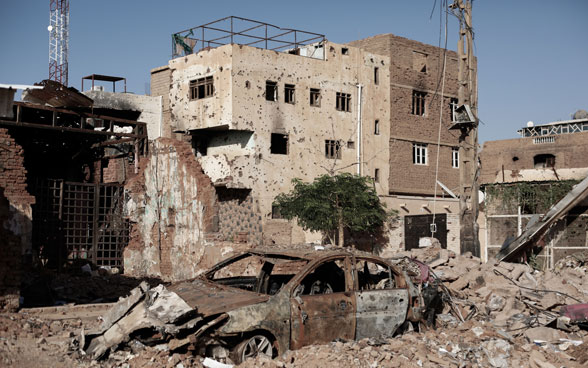
In addition, Switzerland emphasised that international humanitarian law and human rights must be respected by all parties to the conflict under all circumstances. The humanitarian situation also urgently needs to be improved. Thousands of people are starving or being forced to flee. Humanitarian organisations are reaching their limits and urgently require additional financial resources to cope with the situation. In view of this, Switzerland called on all parties to the conflict in the Council to ensure rapid, safe and unhindered humanitarian access across borders and front lines.
Conflict prevention in the regions of Sudan that are not affected by the fighting is also crucial. In these areas, the civilian population is also suffering from the effects of the conflict. These include food insecurity, the massive influx of internally displaced persons and scarcity of resources.
Since the outbreak of the war, Switzerland has already provided substantial support with its good offices for peace in Sudan. For example, it hosted UN talks with the conflicting parties and provided a framework for confidential negotiations in Switzerland between a wide range of Sudanese political players. Switzerland is also working to end the war through its special envoy for the Horn of Africa.
In New York, Switzerland called for diplomatic efforts to be stepped up to find a solution to the conflict by means of an inclusive political process. The Security Council also has an obligation to act. In this context, Switzerland is constructively committed to the adoption of a resolution to protect the civilian population in Sudan.
Switzerland's statement on the situation in Sudan, UN Security Council, 12.11.2024
30.10.2024 – UN Security Council approves transition mission in Somalia
The UN Security Council today unanimously approved the creation of a transition mission for Somalia (UN Transitional Assistance Mission in Somalia, UNTMIS). This decision was based on a proposal by the Somali government. UNTMIS will replace its predecessor, the United Nations Assistance Mission in Somalia (UNSOM), on 1 January 2025. The objectives of UNTMIS include supporting Somalia in the area of state-building and promoting human rights, as well as the gradual transfer of individual tasks to the Somali government and international actors on the ground.
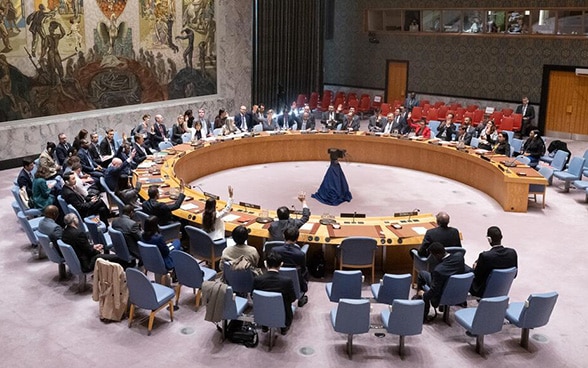
Switzerland supported the resolution in New York, addressing Somalia’s complex and ongoing internal security challenges. Central to these issues is the persistent threat posed by the armed group Al-Shabaab, which continues to carry out deadly attacks and destabilize the country despite efforts by the Somali government and international partners. Climate change also impacts the security situation, with the escalation in fighting against Al-Shabaab coinciding with the effects of a prolonged drought, worsening an already precarious humanitarian situation. At the same time, Somalia is undergoing a transition, and the newly adopted resolution supports the continued transfer of responsibilities from the UN to the Somali government, including child protection initiatives.
During negotiations on the UNTMIS resolution, Switzerland actively advocated for prioritizing civilian protection and adherence to international humanitarian law in the Security Council’s mandate, given the ongoing conflict with Al-Shabaab. Switzerland regrets that the resolution does not explicitly address climate change’s adverse effects on Somalia’s humanitarian crisis or the necessity of involving women in peace processes. Nonetheless, this resolution marks an important milestone in further defining Somalia’s transition process. Throughout the negotiation process, Switzerland emphasized that addressing Somalia's challenges requires a holistic, preventative approach beyond military solutions.
29.10.2024 – Middle East: Federal Councillor Ignazio Cassis leads high-level debate at the UN Security Council
On 29 October 2024, under the leadership of Federal Councillor Ignazio Cassis, the UN Security Council addressed the current situation in the Middle East. Since the terrorist attacks by Hamas on 7 October 2023, violence has escalated in Israel, the Gaza Strip, the West Bank and East Jerusalem and has now spread to the entire region. Hamas is still holding 97 hostages, hostilities in Gaza continue, countless civilians have been killed and the humanitarian situation of the inhabitants of the Gaza Strip is catastrophic.
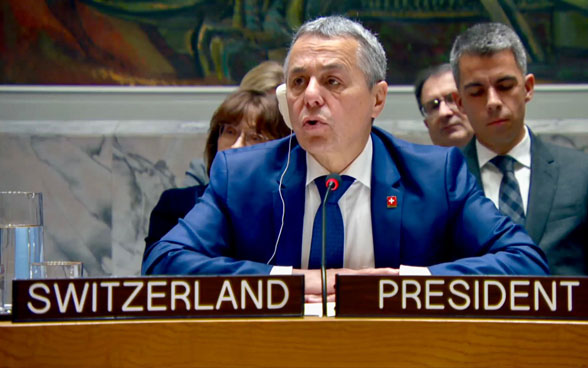
Words are no longer enough
The resolutions that the UN Security Council has since adopted with Switzerland's support call for the immediate and unconditional release of the hostages, a ceasefire in Gaza, compliance with international law, the protection of the civilian population and unhindered access for humanitarian aid. ‘None of these resolutions has been implemented. The Geneva Conventions, like international law, are regularly violated by all actors, state and non-state,’ the head of the FDFA emphasised in New York. Appeals to the parties to a conflict to implement Security Council resolutions lose their meaning when all parties fail to fulfil their responsibilities.
Responsibility to protect civilians
In view of this, states must take responsibility for greater humanity in war, a responsibility incumbent on them as signatories to the Geneva Conventions. ‘We need a strong commitment from all the High Contracting Parties,’ Mr Cassis told the Council. In this context, Switzerland, as depositary state of the Geneva Conventions, is preparing to organise a conference of high contracting parties on the implementation of the Fourth Geneva Convention relative to the Protection of Civilian Persons in the occupied Palestinian territories, including East Jerusalem, in Geneva.
The laws adopted yesterday in the Knesset that are aimed at preventing the presence of UNRWA in Israel and its activities in the occupied Palestinian territory are not only largely incompatible with international law, but also threaten the humanitarian aid for the civilian population, which is suffering greatly. Aid that has been provided through UNRWA to date. Switzerland expects Israel to fulfil its obligations under international law, including the UN Charter and international humanitarian law.
A ceasefire and a two-state solution
Humanitarian aid is crucial for civilians in need, but it does not provide a lasting solution to this conflict. ‘It is time to find a way out of this conflict,’ emphasised the Swiss foreign minister. Peace must be achieved through political means. In concrete terms, a short-, medium- and long-term ceasefire agreement can help. Furthermore, Switzerland remains convinced that a negotiated two-state solution is possible to enable the Israeli and Palestinian people to live in peace and security. In this context, Switzerland supports any initiative in this direction. These include the mediation efforts of the United States, Qatar and Egypt for the release of the hostages and a ceasefire in Gaza, as well as the launch of the ‘International Alliance for the Implementation of the Two-State Solution’, which will take place in the presence of Switzerland in the Saudi Arabian capital Riyadh on 30 October 2024. ‘Switzerland calls on all parties to the conflict to participate in good faith in the negotiations and to fulfil their obligations under international law,’ Mr Cassis told the Security Council.
28.10.2024 – Middle East: Switzerland condemns regional escalation of the conflict at the UN Security Council
The UN Security Council convened today in an emergency session on the Middle East, called by Iran. Switzerland condemns the dangerous escalation of violence in the Middle East of which Israel's air strikes on Iran from Friday night into Saturday as well as Iran's firing of ballistic missiles into Israel earlier this month are part. Switzerland stressed that all hostilities in the region must cease immediately: "A regional war will not benefit any party and will endanger countless lives," it stated in New York.
In light of this, Switzerland called on all Council members to act within the limits of international law and to uphold international humanitarian law under all circumstances. It also urged the full implementation of Security Council resolutions on the Middle East, including those mandating an immediate ceasefire in Gaza, the unconditional release of hostages, and safe, unhindered access for humanitarian aid. Switzerland further called for a ceasefire in Lebanon and the implementation of Resolution 1701.
In closing, Switzerland emphasized the urgent need to break the cycle of violence in the Middle East and avert a regional war, urging all parties to de-escalate and engage in dialogue. Switzerland supports all diplomatic efforts to immediately end the violence across the region.
Switzerland's statement on the situation in the Middle East, UN Security Council, 28.10.2024
25.10.2024 – Pilot project: Using artificial intelligence to unlock UN Security Council meetings
Switzerland, together with Diplo Foundation, has developed a pilot project to use artificial intelligence to make UN Security Council meetings more accessible. As of today, AI-powered reports – including a chatbot – on ten selected meetings are online. This includes the open debate on women, peace and security on October 24.
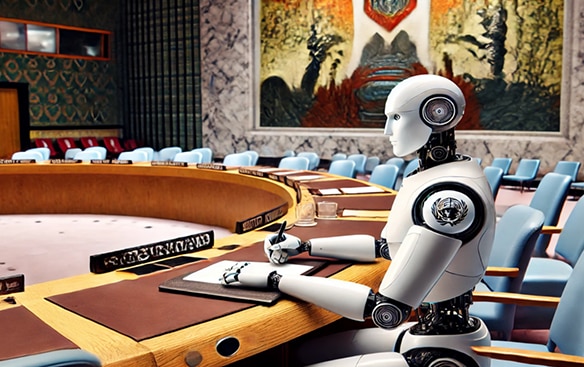
In 2023 alone, the UN Security Council (UNSC) met for approximately 600 hours. There is a wealth of information contained in its meetings, but it is difficult to make use of it: While public meetings are streamed live on UN Web TV, it can take several weeks for official UN meeting records to be released. The transcripts are also delivered in long PDF files, making content analysis time-consuming.
Artificial intelligence has great potential to unlock UNSC meetings as a source of information, especially for actors with limited resources. For this reason, Switzerland has partnered with Diplo Foundation, a non-profit organization (NPO) established by Switzerland and Malta, to train its AI solution, DiploGTP, on UNSC meetings and issues. This project is in line with Switzerland's priority as an elected member to enhance the Council's effectiveness – and with its longstanding efforts for a transparent Council, which go well beyond the current mandate.
AI-powered reports on 10 selected UNSC meetings
The scope of the pilot project was limited to ten UNSC meetings. Eligible meetings were signature events of the rotating presidencies of the UNSC that discussed, implicitly or explicitly, aspects from A New Agenda for Peace.
Each of the ten reports contains a Q&A based on “A New Agenda for Peace”, a knowledge graph, a report per speaker, a report by key themes, and an automated transcript of the livestreamed meeting. In addition, there is an overall report sourcing content from all ten debates. This overall report includes a chatbot, a Q&A, and statistics on speech length and more.
AI solution “DiploGPT”
The AI solution used in the project is called DiploGPT and is developed by Diplo Foundation. DiploGPT combines state-of-the-art speech-to-text, information retrieval, and text generation, – both proprietary and open-sourced – to create specialized tools for diplomatic use cases.
While DiploGPT has already been used to report on several hundred multilateral meetings, it is largely specialized on topics from cyber and tech diplomacy. The UN Security Council is relatively new terrain for the tool. For this reason, Switzerland and Diplo Foundation worked together to train DiploGPT. The training material included the official transcripts of roughly 20 UNSC meetings as well as the New Agenda for Peace, which served as the framework for the AI-powered reporting.
24.10.2024 – President of the Swiss Confederation Viola Amherd chairs debate on ‘Women, Peace and Security’
The UN Security Council, under the chairmanship of the President of the Swiss Confederation, Viola Amherd, addressed the theme of ‘Women, Peace, and Security’ (WPS) in today’s session. This annual open debate, held every October, provides a platform to advance this crucial issue. During its second presidency of the Security Council, Switzerland seized the opportunity to highlight the critical role of women’s increased participation in peacebuilding and mediation. 'Promoting sustainable peace' is one of Switzerland’s key priorities for its term on the UN Security Council in 2023–24.
In her speech, the President underscored the importance of involving women in peace processes from the very beginning. Equal participation is essential for the success of peace agreements. Research shows that peace accords in which women play a significant role are 30% more likely to last at least 15 years.
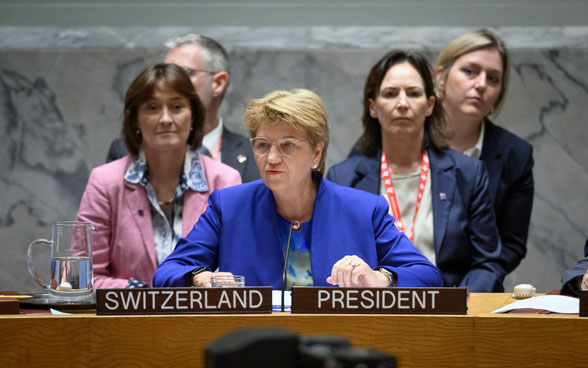
Despite these findings, the President emphasised, progress in the participation of women in peace processes has stagnated. Violence against women and girls has increased worldwide, particularly in the digital space, where women are increasingly exposed to attacks, intimidation and harassment. This situation is alarming. Ms Amherd also expressed concern that international instruments and agreements, such as Resolution 1325, which emphasises the right of women to fully participate in peace processes, are still not being adequately implemented. Women are still only marginally considered in many negotiations and often have no voice in crucial talks. She emphasised that it is crucial not to see women only in advisory or supportive roles, but to ensure that they have an equal place at the negotiating table.
Another key topic for the President of the Swiss Confederation was the protection of women who are politically active. Women who work publicly for peace and equality often face considerable risks. The threats and attacks they suffer, both online and offline, hinder their work and must be urgently stopped through better protection and stronger legal measures. Amherd called on the international community to show more political resolve in advancing gender equality for women in peace processes.
Speech by President Viola Amherd on women, peace and security, UN Security Council, 24 October 2024
22.10.2024 – The UN Security Council adopts Swiss presidential statement on the impact of scientific developments on peace and security
The UN Security Council has agreed for the first time on a Presidential Statement (PRST) addressing the impact of scientific developments on international peace and security. This followed the UN Security Council meeting in New York on 21 October 2024, chaired by Federal Councillor Ignazio Cassis. The PRST, presented by Switzerland, was negotiated among the Council members.

What is a presidential statement?
A Presidential Statement (PRST) is a formal statement by the UN Security Council that is adopted by consensus and read out by the respective President of the Security Council. In such a statement, the Council comments on a geographical situation or a current peace or security policy issue. A Presidential Statement may reaffirm elements of previous resolutions or serve to pave the way for future Security Council resolutions.
With the adoption of the PRST, the Security Council reaffirms its responsibility to maintain international peace and security in accordance with the UN Charter, while emphasizing that scientific developments play an important role in fulfilling this responsibility and in strengthening mutual trust and cooperation. The Council also underscores in the PRST that groundbreaking scientific advancements and their applications must align with international law and the principles of the UN Charter. Furthermore, the Security Council reaffirms its commitment to anticipating and more systematically incorporating science into its work, given the opportunities and risks these developments may present for international peace and security.
During its term on the UN Security Council, Switzerland succeeded in placing the consideration and anticipation of the consequences of scientific developments on international peace and security on the agenda. With the adoption of the Presidential Statement, Switzerland has made a significant contribution to its priority of ‘promoting sustainable peace.’
Opportunities and Risks of New Technologies for Peace and Security
21.10.2024 – Federal Councillor Cassis chairs Council meeting on opportunities and risks of scientific developments for peace and security
Federal Councillor Ignazio Cassis chaired a meeting of the UN Security Council today on the opportunities and risks that science and new technologies pose for global peace and security. As president of the Council in October 2024, Switzerland introduced this topic into the Council’s discussions. The rapid advances in science are having a profound impact on every aspect of our daily lives, including peace and security.
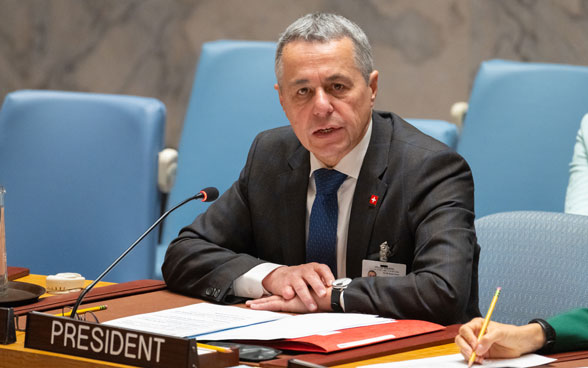
‘What was science fiction ten or fifteen years ago is now becoming our new reality,’ the Swiss foreign minister said in New York. He used the example of neurotechnology to illustrate what this could mean for warfare. Neurotechnology could soon increase soldiers’ precision, stamina, and pain tolerance. The combined use of artificial intelligence and neurotechnology will enable rapid decision-making, including in the conduct of war. The UN Charter, international humanitarian law, and the principles of humanity must be upheld in the face of these risks.
In this context, maintaining international peace and security – the core task of the Security Council under the UN Charter – is more urgent and complex than ever. The Council must therefore act with foresight. ‘We must prepare to meet the future challenges of science. The future is here and now,’ emphasised Mr. Cassis. The Security Council should closely examine the consequences of groundbreaking scientific developments and new technologies, drawing on the expertise of specialists, including the Geneva Science and Diplomacy Anticipator (GESDA) foundation, established by Switzerland in 2019.
‘The Security Council has a duty to invest in anticipation,’ stressed the head of the FDFA, recommending that the UN Secretary-General regularly inform the Council about scientific advances and their potential consequences for peace. Switzerland offers to continue supporting the exchange of knowledge between the Security Council and scientific actors, particularly those based in International Geneva.
With this Council meeting – the first flagship event of its second term – Switzerland highlighted its priority of promoting ‘sustainable peace.’ During Switzerland’s first term as president of the Council in May 2023, Federal Councillor Cassis emphasised in New York that building mutual trust is essential for peace and security, with science playing a crucial role.
16.10.2024 – Gaza: Humanitarian aid must be sufficiently provided in a safe environment
‘We need an immediate ceasefire in Gaza,’ Switzerland emphasised today at an emergency meeting of the UN Security Council. On the occasion of World Food Day on 16 October, Switzerland recalled in New York that the famine in Gaza threatens the lives of hundreds of thousands of people, especially children. It emphasised that the use of starvation as a method of warfare constitutes a war crime. The people in the Gaza Strip are facing a catastrophic humanitarian situation: schools that have become places of refuge and hospital complexes are being bombed. The almost complete lack of humanitarian aid is also exposing the civilian population to epidemics. These include polio. The humanitarian situation of the hostages still being held by Hamas is also catastrophic.
In this context, Switzerland calls on all parties – including Hamas and other armed groups in the Gaza Strip – to strictly comply with international humanitarian law. Hamas' violations of international law do not suspend Israel's duty to respect international humanitarian law. This includes Israel's urgent need to take effective measures to provide the civilian population in Gaza with basic services and humanitarian aid, as required by the International Court of Justice. This requires Israel to work closely with humanitarian agencies of the United Nations, including WHO, UNICEF and UNRWA, to ensure that they have rapid, safe and unimpeded humanitarian access to carry out their work, including the second phase of the polio vaccination campaign.
At the Security Council, Switzerland reiterated its call for the immediate and unconditional release of all hostages and reaffirmed its condemnation of the terrorist acts carried out by Hamas on 7 October 2023.
In the face of the massive escalation of violence in the occupied Palestinian territory and the region, compliance with international humanitarian law and the implementation of Security Council resolutions are indispensable steps on the road to de-escalation and peace. Switzerland therefore supports all efforts towards a negotiated two-state solution, with Israel and Palestine existing within secure and recognised borders.
Switzerland's statement on the situation in Gaza, UN Security Council, 16 October 2024
15.10.2024 – Switzerland supports the full implementation of the peace agreement in Colombia, a visionary treaty also thanks to the equal participation of women
On 15 October, the Security Council held a briefing and consultations on the current situation in Colombia under Swiss presidency. In the presence of several representatives of the Colombian government – Foreign Minister Luis Gilberto Murillo and Interior Minister Juan Fernando Cristo – Switzerland reaffirmed its full support for the comprehensive implementation of the 2016 final peace agreement.
As part of its long-standing peace policy in Colombia, Switzerland is acting as a guarantor state in the peace negotiations between the Colombian government and the Estado Mayor Central de las Fuerzas Armadas Revolucionarias de Colombia (EMC FARC-EP), a splinter group of the former FARC-EP. It is also a co-sponsoring state in the negotiations between the government and the Ejército de Liberación Nacional (ELN).
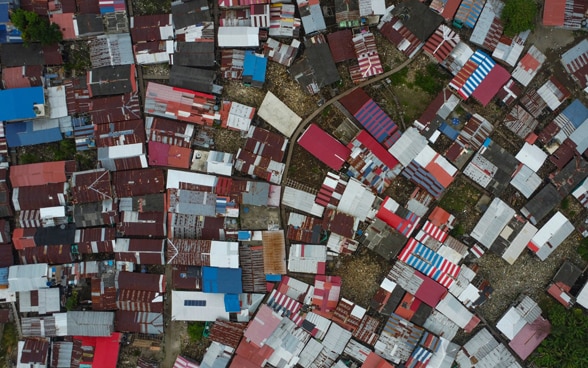
In this sense, Colombia is a priority context during Switzerland's mandate on the Security Council. In February 2024, it co-led a visit to Colombia by the 15 Council members, together with Guyana and the United Kingdom, to see for themselves the reality in the country and the peace policy of the current government, including the state of implementation of the peace agreement, and to jointly support the establishment of a lasting peace.
At this meeting, Switzerland welcomed the new momentum given to the implementation of the final peace agreement. It recognised the progress made in the negotiations between the government and the EMC FARC-EP, as well as the progress in negotiations with other armed groups. It also called for the effective resumption of negotiations between the government and the ELN and the renewal of the ceasefire. To ensure the coherence of the peace process, Switzerland called for better coordination between the various peace efforts.
As the mandate of the verification mission in Colombia is to be extended at the end of October, Switzerland used today's Security Council meeting to reiterate its priorities. These include the good offices of the Special Envoy to support the ongoing political peace negotiations and the preservation of the existing capacities of the mission.
Participation of women in the sustainable peace process
On the sidelines of the meeting, Switzerland organised a joint statement by the signatory states of the Joint Commitments on Women, Peace and Security. This initiative highlighted in particular the influence of women in peace-building efforts in Colombia and elsewhere. Despite numerous obstacles to their participation – including ongoing threats to their safety and that of their families – Colombian women have consistently shown an unwavering commitment to the peace process. During its two years on the Security Council, Switzerland advocated for their participation in the decision-making process, as provided for in the Colombian peace agreement.
Switzerland's statement at the UN Security Council, 15 October 2024
Article: Colombia and the UN Security Council: towards a lasting peace
14.10.2024 – “Are you really who you think you are?”: Deepfakes exhibition opens at UN Headquarters
“Deepfake and You”: this is the exhibition that Switzerland, the Swiss Federal Institute of Technology in Lausanne (EPFL) and the International Committee of the Red Cross (ICRC) opened today at the UN Headquarters in New York.
The exhibition aims at raising awareness of the risks of image manipulation. Visitors walk through an interactive maze and experience first-hand – or rather, face to face – how easy it is to manipulate images today: with artificial intelligence, completely fake but deceptively genuine videos, known as deepfakes, can be created in minutes. These can be misused, including in conflict settings, for example to incite violence and undermine peace efforts. A fake video could show a politician reporting on alleged atrocities by a particular population group; a well-known peace activist suddenly spreading hate speech; or an officer promising the population ceasefires that never materialize.
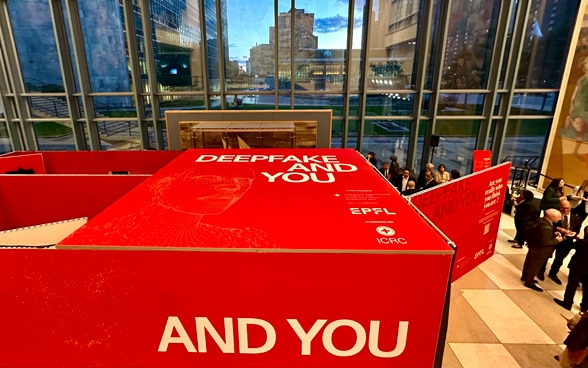
Women are particularly at risk. Fake defamation videos, especially of a sexual nature, are widespread and have real consequences for the women affected. These range from damage to mental health, exclusion from public life and forced career interruptions to physical attacks. This also creates another obstacle for women's participation in peace processes.
However, “Deepfake and You” not only aims at raising awareness of the risks, but also to show ways forward. “The exhibition serves as both a warning and a call to action. It should open our eyes on how easily truth and facts can be twisted, but also show that solutions are within reach,” emphasized Ambassador Pascale Baeriswyl, Switzerland's Permanent Representative to the UN, at the opening. Armandeep Singh Gill, the UN Secretary-General's Envoy for Technology, Martin Vetterli, the President of the EPFL, and Laetitia Courtois, the ICRC's Permanent Observer to the UN, also addressed the audience of around 50 people.
“Deepfake and You” is held in October as part of Switzerland's presidency of the UN Security Council. It is in line with Switzerland's commitment to protecting civilians in conflicts, to strengthening the role of women in peace and security, and to ensuring that science and technology serve, rather than harm, peace efforts. The exhibition will be on display at UN Headquarters Delegates Entrance from 14 to 25 October. A UN badge is required to access the exhibition.
14.10.2024 – Switzerland condemns attacks on UNIFIL
The UN Security Council will meet today in closed consultations to discuss the current situation in Lebanon and the recent attacks on UNIFIL troops. At the request of France, Switzerland, in its role as President of the Council, has scheduled the meeting. Switzerland is alarmed by the escalation of the conflict between Hezbollah and Israel. It calls for an immediate ceasefire and strict compliance with international humanitarian law by all parties.
In view of the recent attacks by the Israeli armed forces on UNIFIL facilities, Switzerland fully emphasises its support for UNIFIL and its mandate. The peacekeeping mission's task is to monitor the implementation of Resolution 1701 of 2006, which calls for a full cessation of hostilities by Hezbollah and Israel. Lebanon and Israel are responsible for implementing the resolution.
Switzerland condemns all attacks against UNIFIL forces. It calls on the Israeli army to cease attacks against UNIFIL installations and emphasises that Hezbollah is equally obliged to refrain from any action that endangers the security of UNIFIL. In view of its mandate for UNIFIL, the Security Council must assume responsibility for the security of the troops.
10.10.2024 – Lebanon: Switzerland condemns hostilities and calls for compliance with international law
At the request of France, the UN Security Council today held an emergency meeting to discuss the situation in Lebanon. In New York, Switzerland expressed its grave concern over the escalation of the conflict between Hezbollah and Israel. Switzerland condemns the attacks by Hezbollah against Israel and its people, as well as all other violations of international law for which this group is responsible. It also condemns all violations of international law by Israel in Lebanon, in particular the air strikes that have caused numerous civilian casualties. In view of this, Switzerland called on all parties to agree to an immediate ceasefire.
‘There is no military solution to this conflict,’ Switzerland stated in the Council. Further escalation fuels hatred on both sides and hinders the search for a peaceful solution. In this context, Switzerland supports all efforts to achieve a diplomatic solution.
The situation for the civilian population in Lebanon continues to deteriorate. The Lebanese healthcare system is on the verge of collapse and more than 600,000 people have already been internally displaced. In New York, Switzerland reiterated that attacks on civilians and civilian infrastructure constitute violations of international humanitarian law and war crimes. It called on all parties to comply with international humanitarian law under all circumstances. In order to alleviate the suffering of the people affected, the Federal Council announced on 9 October 2024 its intention to provide additional humanitarian aid of CHF 7 million for the affected population. These funds still have to be approved by the Swiss Foreign Policy Commissions of the National Council and the Council of States.
In conclusion, Switzerland called on all parties to exercise restraint, to strictly adhere to international law and to work urgently towards a de-escalation in Lebanon and the entire region.
Switzerland calls on all parties to guarantee the security of the United Nations Interim Force in Lebanon (UNIFIL) troops. It reiterated that UN personnel – as well as humanitarian personnel – must be respected and protected by all parties to the conflict, as stated in Resolution 2730, which the Council adopted at the end of May. In this context, Switzerland condemns the recent attacks by Israeli forces on UNIFIL facilities that have caused casualties.
Switzerland's statement on the situation in Lebanon, UN Security Council, 10 October 2024
09.10.2024 – Gaza: Switzerland condemns Hamas' terrorist acts and calls for respect for international law
The UN Security Council, under Switzerland’s presidency, held an emergency meeting to address the humanitarian situation in Gaza. One year after 7 October 2023, Switzerland remains deeply concerned about Hamas’ terrorist acts and the hostage-taking in Israel. In New York, Switzerland once again condemned these acts and reiterated its demand for the immediate and unconditional release of all remaining hostages. At the same time, Switzerland condemned Hamas’ indiscriminate rocket fire at Israel, as seen two days ago.
The massive escalation of violence, particularly following the Israeli military operations in response to the 7 October 2023 attacks, has caused untold suffering for Gaza’s civilian population: Over 41,000 people have lost their lives in the Gaza Strip, and 2.2 million people—the entire population—are living in catastrophic conditions, exposed to constant fighting, hunger, and epidemics without protection. Switzerland called on the Council to end the hostilities and violence in the occupied Palestinian territories, including the West Bank, where numerous civilian casualties continue to mount. In this regard, Switzerland reiterated its appeal for all parties to implement an immediate ceasefire and adhere to the four legally binding Security Council resolutions adopted since 7 October 2023.
As the UN prepares for the second phase of its polio vaccination campaign, and beyond, rapid and unhindered humanitarian access must be ensured across all border crossings and throughout Gaza. Hunger in Gaza is spreading, and the humanitarian aid entering the area is far from sufficient. Switzerland emphasized that using hunger as a method of warfare constitutes a war crime. Additionally, humanitarian workers must be protected, as reaffirmed by Resolution 2730, which Switzerland drafted and the UN Security Council adopted last May. Switzerland calls on all parties to strictly respect international humanitarian law and reminded all states of their duty to enforce it, urging them to use their influence to that end.
Switzerland stressed that respect for international law, including international humanitarian law, is the first step toward resolving disputes and is essential to prevent further regional escalation and limit civilian suffering. For lasting peace in the Middle East, a negotiated two-state solution is needed—two democratic states, Israel and Palestine, living side by side in peace within secure and recognized borders. This solution remains the only viable path for Israelis and Palestinians to live together in peace and dignity.
Switzerland's statement on the situation in Gaza, UN Security Council, 09.10.2024
08.10.2024 – Great Lakes: Opportunities for lasting peace must be seized
The UN Security Council today turned its attention to the Great Lakes region in Central Africa. The conflict in the region, particularly in the east of the Democratic Republic of Congo (DRC), is fuelled by long-standing ethnic tensions, competition for natural resources and the involvement of various armed groups and neighbouring countries. This complex situation has led to decades of ongoing violence, severe humanitarian crises, the displacement of 7.3 million people and regional instability.
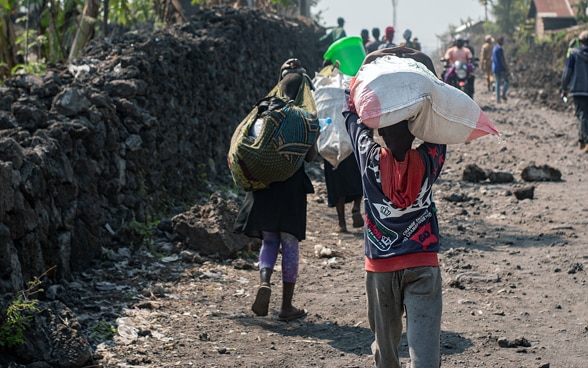
In New York, Switzerland expressed its concern at the worsening regional tensions and ongoing violations of international humanitarian law. It called for efforts to find viable political solutions to be stepped up in order to create the basis for lasting peace in the region. Switzerland welcomed the ceasefire signed by the DRC and Rwanda and facilitated by Angola on 30 July 2024. This is an important step towards peace and has already led to a decrease in violence. "It is crucial that this agreement is fully respected and that all commitments made are fully implemented," Switzerland emphasised to the Security Council.
The protection of civilians is equally important. The ongoing violence has led to an alarming humanitarian crisis in the Great Lakes region. The effects of this crisis are particularly devastating for women and girls, who are suffering from extreme forms of sexual violence and exploitation. This situation is unacceptable. Switzerland reiterated its appeal to all parties to respect international humanitarian law without exception.
As President of the Council, Switzerland emphasised the need to seize current opportunities to build sustainable peace in the region. To this end, the Security Council must fully assume its role in supporting the states of the region in their search for lasting solutions. Switzerland remains strongly committed to supporting regional initiatives and promoting peace and stability in the region, both bilaterally and multilaterally. The situation in the Great Lakes region and ongoing peace initiatives were also among the topics discussed at today's working meeting between Federal Councillor Ignazio Cassis and the Angolan foreign minister in Bern.
Switzerland's statement on the situation in the Great Lakes region, UN Security Council, 08.10.2024
02.10.2024 – UN Security Council briefing with the African Union on cooperation
The UN Security Council held its annual briefing with the African Union on cooperation under Swiss leadership. The focus was on aspects of the strategic partnership for addressing challenges to peace and security in Africa.
During the discussion, Switzerland emphasised that cooperation between the UN and the African Union is a central pillar for peace and development in the world and particularly in Africa. However, both organisations must strengthen prevention and early warning systems, as poor governance, political marginalisation, inequality, security challenges, disregard for human rights and climate change can lead to crises and conflicts. In particular, the younger generation must be supported, since around 40 per cent of young people will live in Africa by 2050. ‘By investing in young people, strengthening cooperation between the United Nations and the AU, and tackling common challenges, we can build a more peaceful, just and prosperous continent,’ said the Swiss representative at the briefing.
02.10.2024 – Middle East: Switzerland condemns regional escalation and calls for an end to hostilities
At an emergency meeting of the UN Security Council, Switzerland expressed its concern at developments in the Middle East and the growing risk of a regional war. It condemned the spiral of violence in recent weeks and called on all parties to cease hostilities. ‘Dialogue is the only way to avoid a regional war. Switzerland supports all efforts to find diplomatic solutions that can lead to an immediate halt to the violence throughout the region’, said Switzerland's Permanent Representative, Pascale Baeriswyl.
Switzerland also reminded all parties of their obligations under international law, and more specifically international humanitarian law. The sovereignty and territorial integrity of all countries and the relevant Security Council resolutions for the region must also be respected. Finally, Switzerland renewed its support for the commitment and good offices of the UN, in particular UNIFIL (United Nations Interim Force in Lebanon) and UNSCOL (Office of the United Nations Special Coordinator for Lebanon). Its staff work in an extremely dangerous environment and play an important role in reducing tensions and ensuring liaison between the parties.
01.10.2024 – Second Swiss presidency of the UN Security Council
Today, Switzerland has assumed the presidency of the UN Security Council for the second time. During its presidency in October, Switzerland will place its priorities at the centre of the Security Council's work, in particular promoting sustainable peace and protecting civilians –Swiss President Viola Amherd and Federal Councillor Ignazio Cassis will be traveling to New York for this purpose.
Press release «Second Swiss presidency of the UN Security Council», 01.10.2024
30.09.2024 – Security crisis in Haiti: UN Security Council renews mandate of Multinational Security Support Mission in Haiti (MSS)
The United Nations Security Council today approved the renewal of the mandate of the Multinational Security Support Mission in Haiti for a further year. The Haitian National Police still do not have sufficient resources to stem the escalation of violence and cope with a serious deterioration in the security situation. This decision once again sends a strong signal of solidarity with the Haitian people, and responds to persistent calls for help in a situation of grave crisis, which is also reflected in an alarming humanitarian situation.
The deployment of the MSS in Haiti was approved by the Security Council on October 2, 2023. This multinational support mission composed of security forces was one of the measures advocated by the UN Secretary-General to restore security to the population of this Caribbean state. Kenya proposed to lead this force.
For Switzerland, the renewal of the MSS mandate is part of an ongoing deployment. The Mission must therefore be coordinated with other international support efforts underway on the ground, in particular the United Nations Office in Haiti (BINUH). Switzerland continues to insist that international law, and in particular human rights, must be respected and be an integral part of this mission, if it is to fulfill its mandate successfully.
27.09.2024 – Switzerland reiterates its appeals at an emergency meeting of the Security Council on the situation in the Middle East
Against a backdrop of increasing escalation in Lebanon and on both sides of the Blue Line, the situation in Gaza also remains extremely precarious. The Security Council met today to discuss the situation once again at a high-level meeting. Switzerland reiterated its position and priorities, calling for an immediate ceasefire, the immediate and unconditional release of all hostages, safe, rapid and unhindered humanitarian access, the protection of humanitarian personnel and respect for international law, in particular international humanitarian law.
Statement by Switzerland to the UN Security Council, 27.09.2024
25.09.2024 – Switzerland calls on the parties to put an end to hostilities at an emergency meeting of the Security Council following the attacks in Lebanon
An emergency meeting on Lebanon was convened at the request of France at the UN Security Council on Tuesday evening in New York.
Over the last few days, intense Israeli air strikes on Lebanese territory have caused numerous civilian casualties, including around fifty children. At the same time, indiscriminate rocket fire from Hezbollah has caused injury, damage and constant fear among the Israeli population. Tens of thousands of inhabitants of southern Lebanon and the Bekaa are fleeing, and many displaced persons in Israel are still unable to return home. Against this alarming backdrop, Switzerland condemned the strikes that caused civilian casualties and stressed that dialogue and de-escalation are the only means of bringing this conflict to an end. Switzerland also called on Israel and Hezbollah to put an end to hostilities and on all parties to commit to the implementation of Resolution 1701.
In her statement, Ambassador Baeriswyl also called for full respect for international humanitarian law by all parties – in particular the principles of distinction, proportionality, and precaution in the conduct of hostilities. Taking all possible precautions to protect civilians and humanitarian and medical personnel is an obligation under international humanitarian law.
A further regional conflagration, for which the civilian population would pay the highest price, must be avoided at all costs. Switzerland therefore supports all efforts to find a diplomatic solution.
Statement by Switzerland to the UN Security Council, 25.09.2024
24.09.2024 – UN Security Council: No diplomatic solution found after 1,000 days of war
Federal Councillor Ignazio Cassis represented Switzerland at a meeting of the UN Security Council dedicated to the war in Ukraine. In the presence of Ukrainian President Volodymyr Zelenskyy, the Russian representative to the UN in New York and UN Secretary-General António Guterres, the head of the FDFA emphasised that the United Nations Charter, international humanitarian law and the Geneva Conventions are instruments that have been in place since the Second World War. ‘Nevertheless, we have not managed to silence the weapons,’ he said in New York. So far, the UN Security Council has not lived up to its responsibility: ’After 1,000 days of war, we still have not found a diplomatic solution.’
Making peace takes courage, the head of the FDFA emphasised. Switzerland showed this when it organised the Peace Conference on Ukraine during the war. The conference had helped to alleviate blockades caused by the war. However, continued dialogue would have to be conducted together with Russia.
Mr Cassis emphasised that reconstruction must also be well prepared for lasting peace. In this context, he referred to the conference on humanitarian demining that Switzerland is organising in Lausanne on 17 and 18 October 2024.
20.09.2024 – Emergency meeting of the UN Security Council on the explosions in Lebanon
The UN Security Council met today in an emergency session in response to the latest developments in Lebanon. In New York, Switzerland expressed its deep concern regarding the explosions of communication devices over the past few days and condemned the fact that these explosions have also claimed civilian lives. Switzerland emphasised the need to clarify the circumstances and responsibilities.
The consequences of the explosions are alarming. On the one hand, they have caused panic and overwhelmed hospitals, particularly impacting the civilian population. On the other hand, the explosions could further jeopardize stability and security in Lebanon and the broader region. In this context, Switzerland called on all parties in the Security Council to exercise the utmost restraint to avoid a major regional escalation. The protection of civilians on both sides of the Blue Line between Israel and Lebanon is imperative, which is why dialogue, de-escalation, and compliance with international humanitarian law and human rights by all parties must be given the highest priority. "Military escalation is not a solution. It would drag the region into the abyss of a regional war," Switzerland emphasized at the Council.
A ceasefire is urgently needed in Gaza, along with the unconditional release of hostages and swift, unimpeded humanitarian access to alleviate the suffering of civilians and prevent further regional escalation. The ongoing negotiations, led by the United States, Qatar, and Egypt, must be continued with urgency to achieve these objectives.
Switzerland's statement on the situation in Lebanon, UN Security Council, 20 September 2024
19.09.2024 – Israeli settlements in the occupied Palestinian territory are an obstacle to the two-state solution
At today's meeting of the UN Security Council, Switzerland reiterated its support for the International Court of Justice and its advisory opinion of 19 July. The illegality of Israel's occupation of Palestinian territory since 1967 is thus beyond doubt. The occupation must end and a political horizon must be restored.
In New York, Switzerland condemned the Israeli government's announcement that it would expand settlements in Palestinian territory, underlining that this would undermine the two-state solution.
Switzerland is convinced that a negotiated two-state solution in accordance with international law is the only way to achieve lasting peace in the region. Switzerland welcomes the fact that the resolution adopted by the UN General Assembly on 18 September 2024 recognises the need to restart a process towards a two-state solution. Furthermore, the General Assembly's decision mandates Switzerland, in its role as depositary state of the Geneva Conventions, to organise a conference of high contracting parties to the Fourth Geneva Convention within six months. The conference will address the arrangements that need to be made to implement the Fourth Geneva Convention in the occupied Palestinian territory, including East Jerusalem, and to ensure that it is respected in accordance with the Common Article 1.
In the Security Council, Switzerland also reiterated its grave concern regarding the catastrophic humanitarian situation in Gaza and stated that the successful completion of the first phase of the UN polio vaccination campaign shows that large-scale humanitarian operations in Gaza can be carried out with the necessary political will of the parties to the conflict. However, the successful completion of this first phase is not enough. The parties must respect their obligations under international law and allow safe, rapid and unhindered humanitarian access to the civilian population. This includes the hostages, whose immediate and unconditional release Switzerland is calling for. Furthermore, an immediate ceasefire is urgently needed. In this context, Switzerland supports the mediation efforts of the United States, Qatar and Egypt to reach an agreement as quickly as possible.
A ceasefire in Gaza is also essential to avoid further escalation in the region. Switzerland expressed its grave concern over the explosions in Lebanon on 17 and 18 September and the reports of numerous civilian casualties. It called on the parties to exercise the utmost restraint and to work for an immediate de-escalation.
Switzerland's statement on the situation in the Middle East, UN Security Council, 19 September 2024
12.09.2024 – Storms in Yemen exacerbate the humanitarian situation
Severe storms have hit Yemen hard in recent weeks. The storm not only displaced thousands of people, but also destroyed important infrastructure. These extreme weather events, which are further exacerbated by climate change, are significantly worsening the humanitarian crisis in Yemen. Food and water supplies are particularly affected, further aggravating the already precarious humanitarian situation of the population.
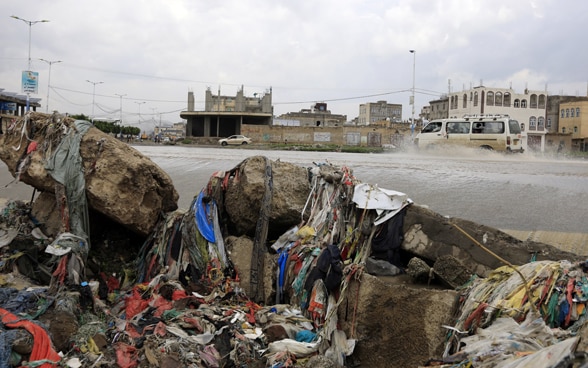
At a meeting of the UN Security Council, Switzerland emphasised areas for action to support the Yemeni people in this difficult situation. In New York, it called on all parties to the conflict to refrain from actions that could further damage the environment. This applies in particular to attacks on oil tankers in the Red Sea in order to prevent an impending environmental catastrophe.
In addition, humanitarian aid must have access to all regions of the country. It must not be politically instrumentalised. The population has a right to an unhindered supply of vital relief supplies. Humanitarian personnel must be protected, as required by international humanitarian law. Switzerland supports the United Nations' call for the immediate and unconditional release of all arbitrarily detained UN staff and humanitarian aid workers.
Switzerland emphasised that in the long term, a political solution to the conflict is the only way to meet the needs of the Yemeni people in a sustainable manner and to strengthen their resilience to crises. Switzerland calls on all parties to the conflict to maintain the progress made in the peace talks and to continue them under the auspices of the United Nations. Every measure to restore trust between the parties to the conflict must be encouraged.
In conclusion, Switzerland emphasised that stepping up international efforts is crucial to stabilising the situation in Yemen.
Statement by Switzerland on the situation in Yemen, UN Security Council, 12.09.2024
09.09.2024 – UN peacekeeping missions express solidarity and protect lives
During an open debate at the UN Security Council, Switzerland reaffirmed its close cooperation with international organisations and its strong commitment to UN peacekeeping. In particular, Switzerland thanked the peacekeepers who carry out important work every day in difficult and often dangerous situations. The many lives saved reflect the success of their work.
In New York, Switzerland emphasised that the adoption of Resolution 2719 in December 2023 marked an important milestone in strengthening cooperation between the UN and the African Union (AU). The resolution is an important step towards improving peace operations in Africa.
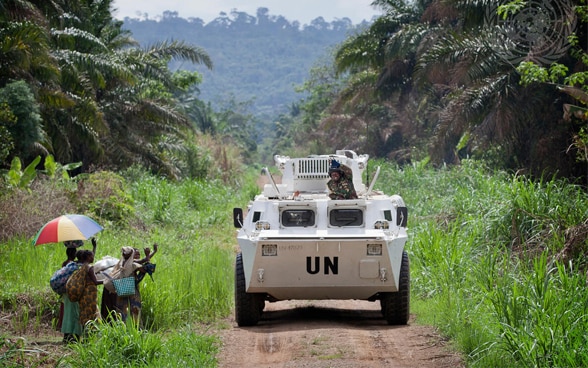
To further strengthen peacekeeping, Switzerland stressed that peacekeeping operations must always be adapted to local realities. They should not be seen in isolation from the historical, cultural and social context in which they operate. The participation of women, in particular, is crucial to increase the chances of a sustainable peace solution. In addition, the impact of climate change and resource scarcity must be systematically taken into account in the planning of peace missions.
In New York, Switzerland emphasised that there is no universal solution for peace missions. Instead, flexible mission models should be developed that are in line with the specific requirements of the respective conflict areas. Cooperation with regional organisations such as the AU plays a central role in such efforts. Innovation, for example through the use of new technologies, is also important for success.
UN peacekeeping is a collective effort. Co-operation, trust and transparency between the UN Security Council, the UN General Secretariat, troop-contributing countries and host countries are essential for success. Unity among the members of the Security Council is particularly important for the acceptance and effectiveness of UN missions, and thus for the safety of the blue helmets.
Peacekeeping operations are an expression of solidarity between States and have proven their worth over the past 75 years. Switzerland underlined that UN peacekeeping must remain a priority in order to continue to protect lives and thus remain relevant. During the debate, Switzerland reaffirmed that it will continue to actively support UN peacekeeping operations in terms of personnel, funding and conceptual support.
Statement by Switzerland on UN peacekeeping, UN Security Council, 09.09.2024 (en, fr)
04.09.2024 – Middle East: Switzerland calls for compliance with international law, the unconditional release of hostages and an immediate ceasefire
At an emergency meeting following the execution of six hostages by Hamas last weekend, Switzerland expressed its deep shock at this act in the UN Security Council. It once again condemned in the strongest terms the acts of terrorism and hostage-taking by Hamas and other armed groups since 7 October. The taking of hostages and their execution are war crimes. In New York, Switzerland demanded the immediate and unconditional release of all remaining hostages. In addition, both the hostages and the people held by Israel in connection with the conflict must receive immediate medical assistance.
The humanitarian situation in Gaza remains catastrophic. Switzerland recalled that civilians and civilian infrastructure are protected and condemned all attacks on any civilians. Humanitarian personnel must be protected in order to help the suffering civilian population, in particular for the continued implementation of the UN immunisation campaign to protect 640,000 children in Gaza from polio. On the Council, Switzerland welcomed the fact that the first phase of the immunisation campaign is proceeding without major incidents and called on the parties to continue to facilitate this campaign.
Switzerland emphasised once again that a ceasefire in Gaza is crucial. Against this backdrop, it supports the mediation efforts of the USA, Qatar and Egypt to reach a consensus on a corresponding agreement. This would also contribute to regional de-escalation.
Compliance with international law, including international humanitarian law and human rights law, by all parties is urgently needed. This also applies to the West Bank, where an increase in violence can be observed, including settler violence and in the context of operations by the Israeli security forces. Switzerland emphasised in the Security Council that Israel must take particular account of the criteria of necessity and proportionality in the use of force and respect the rights to life and security of every individual. In New York, Switzerland also recalled that Israel, as the occupying power, is responsible for maintaining law and order in the West Bank and must ensure the protection and well-being of the population.
Compliance with international law by all parties is the first step on the road to peace in the Middle East, which must lead to a negotiated two-state solution.
Statement by Switzerland on the situation in the Middle East, UN Security Council, 04.09.2024
29.08.2024 – Middle East: Emergency meeting at Switzerland's request on the humanitarian situation in Gaza
While the humanitarian situation for the civilian population in Gaza is deteriorating daily, the precarious security situation does not allow humanitarian personnel and UN staff to do their work. For this reason, the UN Security Council met today in an emergency session, which was requested by Switzerland together with the United Kingdom.
Against the background of an imminent polio epidemic in the Gaza Strip, some 640,000 children under the age of ten are to be immunized. In order to carry out this immunization campaign, the UN and its partners require safe and unimpeded humanitarian access throughout Gaza. This is not currently guaranteed, and the current conditions of insecurity, ongoing fighting and evacuation orders are making UN operations extremely difficult. It is imperative that the vaccination campaign be carried out in complete safety for humanitarian workers and the civilian population," Switzerland emphasized at the emergency meeting. Switzerland is supporting the polio vaccination campaign with CHF 1 million, Federal Councillor Ignazio Cassis announced last Monday in Geneva.
In New York, Switzerland reiterated the urgency of an immediate ceasefire in Gaza and the release of the hostages. In this context, it also reiterated its support for the mediation by Egypt, Qatar and the US. It also reiterated its call for all parties to respect international humanitarian law and human rights in all circumstances. This also applies to armed groups such as Hamas.
In the Security Council, Switzerland also expressed its deep concern about the situation in the West Bank. “We are witnessing a sharp increase in Israeli operations," Switzerland said. Against this background, it reminded Israel of its obligations under international law. Among other things, the use of force must meet the criteria of necessity and proportionality, and the right to life and security of every individual must be guaranteed.
Finally, Switzerland emphasized that respect for international law and the implementation of Security Council resolutions is also an indispensable prerequisite for de-escalation and a first step towards a lasting peace based on a negotiated two-state solution in which Israel and Palestine live side by side in peace and security within secure and recognized borders.
Statement by Switzerland on the situation in the Middle East, UN Security Council, 29.08.2024
28.08.2024 – The Security Council extends the UN mission in Lebanon for another year
The UN Security Council today unanimously extended the mandate of the UN mission in Lebanon (UNIFIL) for another year. UNIFIL is one of the oldest UN missions still active. It was first mandated by the Security Council in 1978. The situation along the Blue Line is currently unstable. Due to the escalating violence on both sides of the line in recent months, UNIFIL plays an important role in efforts to de-escalate the situation. With the adoption of today's resolution, the Security Council reaffirms its call from 2006 for a complete cessation of hostilities and full respect for the area along the Blue Line.
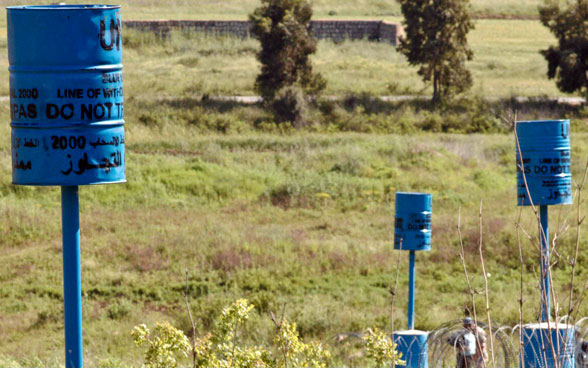
Switzerland voted in favour of the resolution in New York. The presence of UNIFIL contributes to improving stability in the region. During the negotiations, Switzerland worked to ensure that the protection of the civilian population and compliance with international humanitarian law by all parties are part of the resolution.
Switzerland is extremely concerned about the situation in the Middle East and calls on all parties to the conflict to exercise the utmost restraint and to implement de-escalating measures. Switzerland welcomes all efforts to achieve a diplomatic solution. This includes in particular the ongoing negotiations by the USA, Qatar and Egypt on a ceasefire in Gaza, which could also contribute to de-escalation in the region along the Blue Line.
26.08.2024 – Innovation, science and technology support efforts for preventing emerging security risks
During their visit to Geneva on 26 August, members of the UN Security Council (UNSC) met with different Geneva-based organizations and actors. They exchanged on ways to enhance the prevention of emerging security risks through new technologies and scientific anticipation. Provided with different examples of geographic contexts, the participating members of the UNSC learned about tools and policy practices that could help support the organ’s mandate to maintain international peace and security.

Emerging risks to international peace and security, such as climate change, require rethinking prevention. To strengthen its role in this regard, it is important for UNSC members to have access to reliable information. Aiming to facilitate this rethinking, Switzerland invited UNSC members to exchange and interact with some scientific and innovative actors in Geneva. After a morning programme dedicated to the 75th anniversary of the Geneva conventions, members of the UNSC were welcomed at the World Meteorological Organization (WMO) building, a few steps from the Palais des Nations. After opening remarks by the UN Institute for Training and Research (UNITAR), they had the opportunity to exchange with various Geneva-based actors experienced in data collection and analysis, tools development, technological innovation and anticipation. Indeed, the United Nations Satellite Centre (UNOSAT), the WMO and the UN Environment Programme (UNEP) presented concrete and visual examples of their work. The presentations were followed by a panel discussion with the International Federation of the Red Cross and Red Crescent Societies (IFRC) and UNEP, allowing a deep-dive into relevant geographic contexts affected by conflict.
26.08.2024 – Members of the UN Security Council on an informal visit to Geneva
Around 200 people gathered today on the Place des Nations to mark the Geneva Conventions’ 75th anniversary. Federal Councillor Ignazio Cassis reminded the UN Security Council members, representatives of International Geneva, the City and Canton of Geneva, various NGOs and academia of the Geneva Conventions’ essential role. These pillars of international humanitarian law set limits to war and commit all states to respecting their duty of humanity in combat.
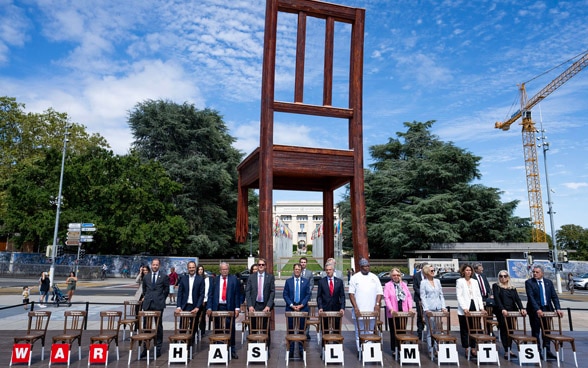
Symbolic action
The representatives of the institutions and organisations present then put back in an upright position, chairs created for the occasion by the Federal Department of Foreign Affairs and inspired by the famous "Broken Chair" on the Place des Nations. This symbolic gesture was intended to show that, despite the current challenges, the fundamental rules and principles of the Conventions remain relevant and more topical than ever to protect human dignity and limit suffering at a time when there are more than 120 conflicts in the world. After today's event on the Place des Nations, the chairs will be placed in international locations to ensure that the message of humanity and action they represent continues.
Members of the United Nations Security Council visit Geneva
Before heading to the Place des Nations, the members of the Security Council, who had travelled from New York for the occasion, took part in a panel discussion at the UN's European headquarters, opened by Foreign Minister Ignazio Cassis and Timothy Musa Kabba, his counterpart form Sierra Leone, which holds the Security Council Presidency in August. "Switzerland is determined to make respect for the Geneva Conventions a political priority," said the head of the FDFA in his speech.
The Geneva Conventions and the test of time
Ignazio Cassis also reminded those present at a round table discussion organised at the end of the day at the Maison de la Paix that, 75 years after their adoption, the Geneva Conventions continue to save millions of lives; that the world has no more effective tool for protecting the victims of armed conflicts; and that it is not the rules of international humanitarian law that are inadequate, but the will to respect them that is lacking. Finally, the Federal Councillor reiterated that the protection of civilians and humanitarian personnel in armed conflicts is one of Switzerland's priorities for its mandate on the Security Council and beyond.
Address by Federal Councillor Ignazio Cassis at the Place des Nations, 26.08.2024 (fr, en)
22.08.2024 – Risk of polio epidemic in Gaza: Switzerland calls for immediate, safe and unhindered humanitarian access
The UN Security Council today addressed the situation in the Middle East. The humanitarian situation in Gaza, and in particular the risk of a polio epidemic, was at the centre of discussion after first cases became known and the WHO found traces of polio in sewage. Polio mainly affects children under the age of five. The disease attacks the nervous system and can lead to complete paralysis within a few hours. There is no treatment, prevention is the only solution. The destruction of the infrastructure, the lack of clean water and sanitary facilities and the insufficient access to healthcare increase the risk of the disease spreading on a large scale in Gaza. According to UNICEF figures, 640,000 children under the age of ten are at risk of polio in the Gaza Strip. ‘The United Nations and its partners have been advocating for months for safe, rapid and unhindered humanitarian access and are ready to take measures to prevent and contain polio,’ emphasised Switzerland in the Security Council. The UN is planning to carry out a polio vaccination campaign in the Gaza Strip. Switzerland stated in the Security Council that it welcomes this campaign and is examining the possibility of providing financial support.
A ceasefire agreement, as called for by the Security Council in its Resolution 2735 of 10 June 2024, must be concluded as soon as possible. Switzerland therefore welcomes the mediation efforts of Qatar, Egypt and the United States and calls on the parties to participate constructively in these negotiations. In New York, Switzerland recalled that regardless of the outcome of these negotiations, international humanitarian law must be respected by all parties to the conflict and all hostages still being held must be released immediately and unconditionally.
In New York, Switzerland also emphasised the continuing risk of a major regional escalation. In this context, it also condemned the ongoing violence by settlers in the West Bank against the Palestinian civilian population. Furthermore, Switzerland reiterated in the Council its urgent call for de-escalation, to which an immediate ceasefire in Gaza can also contribute. Switzerland also reiterated its support for the two-state solution as the foundation for peace in the Middle East.
Statement by Switzerland on the situation in the Middle East, UN Security Council, 22.08.2024
21.08.2024 – Conflict prevention often does not receive the recognition it deserves
In an open debate under the presidency of Sierra Leone on consolidating and maintaining peace in the UN Security Council, Switzerland emphasised the central importance of preventing conflicts and violence. Preventive measures often do not receive the recognition they deserve, even though they can save countless lives and prevent humanitarian disasters. Preventive measures are still not prioritised enough. Not only do they save countless lives and prevent disasters, they are also more successful and cost-effective than post-conflict reconstruction, as studies demonstrate. In New York, Switzerland welcomed the Council's discussion in the context of the New Agenda for Peace, which calls for the prioritisation of conflict prevention and the development of national prevention strategies.
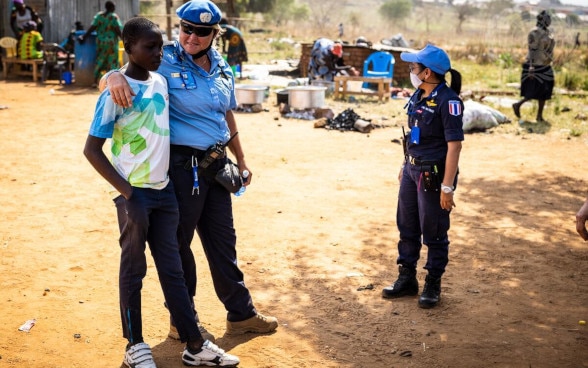
During the debate, Switzerland emphasised aspects that are central to strengthening the prevention of conflict and violence. The trust of societies in security, state institutions, the justice system and the guarantee of freedom as well as the inclusion of marginalised groups in political decision-making processes has a preventive effect. The Universal Declaration of Human Rights, which was adopted by the international community more than 75 years ago, postulates the right of everyone to participate in society in addition to basic civil and social rights. They must be observed and strengthened in order to promote trust in societies and thus conflict prevention.
Switzerland also pointed out that prevention is not only relevant for countries that are directly threatened by armed conflict. Violence in all its forms is a challenge that affects all states. Switzerland recognises this by delegating numerous competencies to the regional and local level and, for example, promoting civil society initiatives to combat extremism, violence and marginalisation.
Finally, Switzerland called on the Security Council to fully utilise its preventive role by making greater use of its instruments and providing better support to regional missions mandated by the Council in order to identify conflict risks on the ground at an early stage and mitigate them sustainably.
Statement by Switzerland on conflict prevention, UN Security Council, 21.08.2024
15.08.2024 – Somalia in a phase of transition
The situation in Somalia remains fragile. The country, which was elected to the UN Security Council for the years 2025-2026, faces major challenges in terms of its internal security. At the centre of this is the ongoing threat posed by the armed group Al-Shabaab. Despite the efforts of the Somali government and international partners, Al-Shabaab continues to carry out deadly attacks and destabilise the country. Climate change is also having an impact on the security situation. The escalation of fighting against Al-Shabaab coincides with the effects of a prolonged drought and complicates the precarious humanitarian situation.
In this context, the Security Council is currently discussing the termination of the peacekeeping mission in Somalia (ATMIS) led by the African Union (AU). At the same time, a follow-up mission, the African Union Support and Stabilisation Mission in Somalia (AUSSOM), is being planned. The AU has submitted an operational concept to the UN Security Council, which describes the tasks that AUSSOM is to take over seamlessly after the departure of ATMIS beginning in January 2025.
The aim is to ensure that Somalia can ensure its own security. AUSSOM is to focus in particular on training and equipping the Somali security forces. The Security Council confirmed this fundamental decision in its resolution on 15 August 2024. Switzerland supported this resolution. During the negotiations on this matter, Switzerland emphasised that a purely military approach cannot be a solution to the unstable security situation. It was able to enshrine this approach in the resolution. Another priority is that the AUSSOM mandate should include the protection of the civilian population and respect for international humanitarian law and human rights.
As a member of the Security Council, Switzerland will continue to work to ensure that the transition from ATMIS to AUSSOM can be carried out seamlessly and without a security vacuum that could be exploited by Al-Shabaab. The transition must be carefully planned and will require a collective effort by the international community to prevent a resurgence of military threats and to consolidate the progress made in Somalia over the past decade.
14.08.2024 – Switzerland reaffirms its full support for UNMISS in New York
Since its independence in 2011, South Sudan has been the scene of armed conflicts and humanitarian crises. Almost five years ago, a peace agreement ended the war at national level. But this peace is fragile. The many problems that have torn society apart are still present and the deep traumas of past wars remain. Elections are scheduled for January 2025. Switzerland recognises that the holding of elections is a South Sudanese process and in a UN Security Council briefing today encouraged the authorities and parties to intensify their efforts and work constructively and consensually to advance the holding of these elections. ‘Time is short,’ Switzerland told the Council.
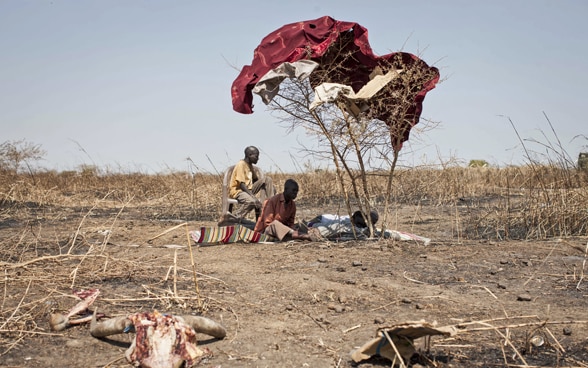
Switzerland is active on the ground in the areas of peace policy, development cooperation and humanitarian aid. In the UN Security Council, Switzerland has also supported the extension of the mandate of the UN Mission in South Sudan (UNMISS), which plays a critical role in peace and security, on several occasions - most recently on 29 April 2024. At today's Council meeting, Switzerland emphasised its three main priorities.
Firstly, the need to reach a consensus in order to clarify the way forward with regard to the election timetable. Switzerland also emphasised the importance of constructive dialogue between the parties. On the other hand, it is crucial to create a safe and secure environment. This appeal comes at a time when the developments of recent months continue to give cause for concern. Widespread attacks on civilians, particularly in the context of sub-national violence, continue to take place across the country. ‘The parties must respect international humanitarian law and human rights. We welcome the efforts of UNMISS to protect the civilian population and the continued commitment between the mission and the government to respect the Status of Forces Agreement,’ Switzerland said in its statement.
Finally, efforts to meet humanitarian and protection needs must continue. These needs are constantly increasing, which is deeply concerning. The country is characterised by ongoing violence and the impact of the conflict in Sudan. In addition, South Sudan has already been severely affected by floods, which, according to the UN Secretary-General's report, will continue this year and affect millions of people. The combined risks of conflict-fuelled food insecurity, displacement of people and the negative effects of climate change are a difficult challenge for more than half of South Sudan's population. Support is urgently needed. Rapid and unimpeded humanitarian access is crucial to provide assistance to people in need. Humanitarian personnel must also be protected at all costs.
In all these areas, Switzerland reiterated its full support for UNMISS and the Trilateral Task Force, whose continued support along the complex path is crucial for South Sudan. At the end of its statement, it also reaffirmed its strong commitment to the government and people of South Sudan to achieve democratic, legitimate governance and lasting peace.
13.08.2024 – Middle East: Emergency meeting after strike on al Tabeen school in Gaza
The UN Security Council met in emergency session following the Israeli strike on the al Tabeen school in Gaza last Saturday. "In Gaza today, schools are often the last resort for finding food, water or shelter. But even these schools, which have become makeshift shelters, often offer no refuge to civilians," Switzerland said in New York.
Switzerland condemns all violations of international humanitarian law. It also condemns the fact that hostilities in Gaza continue to cause numerous civilian casualties, such as the attack on the school last Saturday. According to the UN High Commissioner for Human Rights, at least 93 people were killed in this attack.
International humanitarian law prohibits – including armed groups such as Hamas – from using civilians to protect a military objective from attack. Even when this rule is violated, this in no way suspends Israel's obligation to comply strictly with international humanitarian law in the conduct of hostilities. This includes the principles of distinction, precaution and proportionality. "75 years ago, yesterday, the Geneva Conventions came into being. By adopting these Conventions, the member states committed themselves to preserving humanity, even in times of war," emphasised Switzerland in the Security Council and underlined that international humanitarian law must be respected by all parties to the conflict in the Middle East.
The humanitarian situation for the civilian population in Gaza remains intolerable: there is a risk of the spread of disease - as demonstrated by the resurgence of polio - and people are starving. Switzerland reminded the Council that the use of starvation as a method of warfare against the civilian population constitutes a war crime. In this context, it reiterated that the statements made by the Israeli Finance Minister last week were unacceptable and called for the immediate unhindered delivery of humanitarian aid to the civilian population throughout the Gaza Strip.
Switzerland reiterated its call for the release of all hostages and urged the parties to participate constructively in the ceasefire talks led by the United States, Qatar and Egypt. A ceasefire in Gaza is crucial for regional de-escalation in the face of the threat of a major escalation in the entire Middle East region. Finally, Switzerland reiterated the need to restore a political horizon based on the two-state solution.
Statement by Switzerland on the situation in the Middle East, UN Security Council, 13.08.2024
07.08.2024 – Women are key architects of peace
The UN Security Council today discussed the impact of the withdrawal of a peacekeeping mission on the role of women in peace and security and on women's rights. In New York, Switzerland emphasised how important it is to enable women to participate fully and equally in peace processes. Experience shows that this is crucial to achieving sustainable results.
Gender-specific measures must be taken to ensure that the withdrawal of peacekeeping missions does not jeopardise women's rights and equality. With Resolution 2594, the Security Council already emphasised in 2021 the importance of women's participation and special attention to gender-specific aspects during such transition processes. However, not all available instruments have been utilised optimally to date.
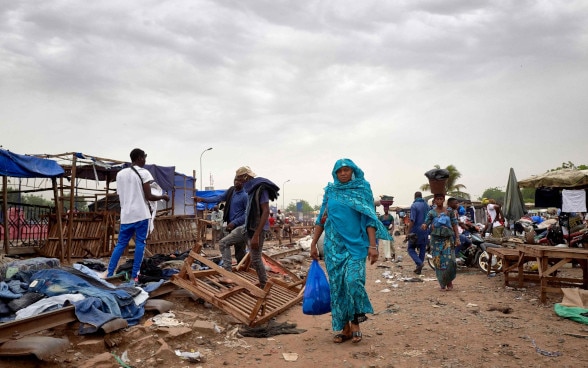
The integration of gender-specific criteria is central to all areas of new and existing UN missions. In this way, national security institutions on the ground can be supported in protecting the civilian population and respecting human rights. Women must be able to participate in decision-making processes for the future of their country, including in connection with the withdrawal of a peacekeeping mission. The main responsibility here lies with local governments, for example through a national action plan to implement the Women, Peace and Security Agenda.
Documentation from past withdrawals of UN missions and the exchange of experiences are crucial to avoid negative impacts on women's rights, empowerment and security in similar scenarios. Examples such as Mali and Sudan show that the dismantling of UN structures can have negative consequences for women's rights on the ground. Transition phases must be planned accordingly in the long term and with sufficient resources.
Finally, Switzerland emphasised that the decisions taken today lay the foundations for future peace efforts. Women and girls must also be given the opportunity to fulfil their active role as architects of peace and their own future during transition phases.
Statement by Switzerland on women, peace and security, UN Security Council, 07.08.2024
31.07.2024 – UN Security Council: Switzerland Expresses Grave Concern About the Escalation in the Middle East
During an emergency meeting of the UN Security Council today, Switzerland expressed its grave concern about the recent escalation in the Middle East. "We reject this spiral of violence and emphatically call for a return to diplomacy," said Switzerland in New York. It called on all actors, and those who have influence over them, to exercise the utmost restraint and to choose the path of diplomacy to reduce tensions and seek solutions in accordance with international law. "There is no military solution to this conflict. Dialogue and de-escalation are the only means to avoid plunging into the abyss of a regional war and to find the path to peace again," Switzerland emphasized.
Switzerland demands respect for international law, including the UN Charter. All UN resolutions must be implemented.
Switzerland also called on all parties to the conflict to comply with international humanitarian law and to protect the civilian population. Furthermore, it reiterated its call for an immediate ceasefire in Gaza and the release of all hostages, stating that these measures would also help calm the situation in the region. "Negotiations must continue as a matter of urgency," Switzerland emphasized.
Statement by Switzerland on the Situation in the Middle East, UN Security Council, 31.07.2024
26.07.2024 – Gaza: Respect for international law is indispensable
The UN Security Council met today to discuss the humanitarian situation in Gaza, in the presence of UNRWA Deputy Commissioner-General Antonia Marie De Meo. Switzerland expressed its gratitude for the important humanitarian work carried out by the UN, including UNRWA, in a particularly difficult context.
In a situation where men, women and children are living in unacceptable conditions, Switzerland reiterated its call for strict compliance with international humanitarian law and an immediate ceasefire in Gaza - demanded by Security Council resolutions - as well as the immediate and unconditional release of all hostages.
Switzerland has strongly condemned all violations of international humanitarian law, including indiscriminate attacks and violence against civilians, non-combatants and civilian objects, as well as human rights violations. In addition, humanitarian aid must be able to enter Gaza through all crossing points and be distributed throughout the Strip in a safe, rapid and unhindered manner.
These elements are only the first steps towards a political solution of the conflict, which must be based on the two-state solution, in which two democratic states, Israel and Palestine, live side by side within secure and recognized borders.
23.07.2024 – Transboundary water management in Central Asia as a tool for peace and stability
Sustainable and equitable water management is essential to sustaining healthy livelihoods and enhancing food security as well as strengthening the resilience of societies to the effects of climate change. The availability of water resources in Central Asia plays a vital role in the well-being and economic growth of around 75 million people. As the region continues to grow economically, addressing water resource challenges with effective and informed governance will support sustainable development and enhance the prosperity of its people.
In response to the pressing need for a transboundary approach to managing the regions water resources, the Blue Peace Central Asia (BPCA) initiative was launched by Switzerland in 2017. The initiative aims to support countries of the region (Kazakhstan, Kirgizstan, Tajikistan, Turkmenistan and Uzbekistan) in establishing a system of shared benefits for water resource allocation (sanitation and drinking water, irrigation, energy, and environment) that accommodates the interests of upstream and downstream countries. In Tajikistan and Uzbekistan efforts are made to rehabilitate the joint transboundary hydropost and to establish the operational management framework. For Switzerland, the inauguration of the hydropost marks an important step forward in regional collaboration. It confirms the political will for transboundary cooperation between Tajikistan and Uzbekistan. Additionally, the establishment of a BPCA Dialogue Platform facilitates dialogue among riparian States to jointly and systematically manage the shared large river basins.
The United Nations Regional Centre for Preventive Diplomacy (UNRCCA) also promotes dialogue among Central Asian States on transboundary water management. UNRCCA provides a space for dialogue between the governments of those countries in order to find common solutions. It further keeps regular contacts with international organizations operating in the region to stimulate their peace efforts and cooperates with other UN agencies working in the field of sustainable development and conflict prevention. The Special Representative of the Secretary-General and Head of UNRCCA regularly briefs the Security Council on UNRCCA’s work. Such a meeting took place on 23 July where Switzerland shared its experiences in the region.
Switzerland supports efforts on water management in Central Asia as well as initiatives in the area of good governance and sustainable economic development in Kirgizstan, Tajikistan and Uzbekistan encouraging measures to mitigate the impacts of climate change and supporting regional cooperation. Federal Councillor Ignazio Cassis also visited Tajikistan and Kyrgyzstan from 1 to 4 July 2024 aiming to bridge economy and cooperation in Central Asia.
More information on Switzerland’s activities in the region:
Switzerland and Central Asian states: 30 years of cooperation
22.07.24 – Switzerland expresses grave concern about the risk of an escalation in the Middle East
The Security Council held an emergency meeting in New York on Monday afternoon following the drone attack on Tel Aviv on Friday 19 July, claimed by the Houthis. This attack was followed by a strike in Hodeïda by the Israeli army in response. Switzerland has expressed its deep concern at these recent developments in the region, both in Yemen and in the Middle East. ‘Every attack in the region, including the latest missile strikes against Eilat, brings us closer to an even more serious regional escalation, a risk that we have a responsibility to mitigate’, said the Swiss representative in the Council. He also recalled that all actors in the region must exercise caution and the utmost restraint, and at all times respect international law, including the UN Charter and international humanitarian law.
Switzerland affirms that only political solutions can bring peace and security to the entire region. A ceasefire in Gaza and an end to attacks by armed groups in the region are urgently required. The Security Council resolutions must be implemented immediately. The same applies to Yemen. The measures taken by the Council to promote a resolution of the conflict in Yemen through dialogue, in particular the arms embargo established by Resolution 2216, must therefore be strictly respected.
17.07.2024 – Middle East: Switzerland places respect for international law at the centre of a peace process
The UN Security Council today held an open debate on the situation in the Middle East. In New York, Switzerland continued to express its alarm at the situation in the entire occupied Palestinian territory and on both sides of the Blue Line between Israel and Lebanon. The civilian population is paying the highest price for the violations of international law committed by all sides and the lack of implementation of the relevant four Security Council resolutions. ‘We must step up our efforts to break the spiral of violence and return to the foundations of humanity that have been trampled on for far too long in this conflict,’ emphasised Switzerland's MENA Special Envoy in New York.
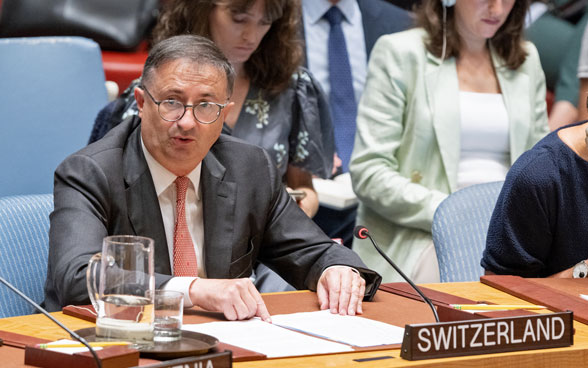
Against this backdrop, an immediate ceasefire in Gaza, as called for in the Security Council resolutions, is essential. In addition, all parties must respect international law, in particular international humanitarian law and human rights. Accordingly, the civilian population and civilian objects such as homes, schools and hospitals must not be attacked. Humanitarian aid must also be able to reach Gaza via all border crossings and be distributed safely, quickly and unhindered throughout the Gaza Strip. Switzerland also called for the immediate and unconditional release of all remaining hostages.
The Swiss special envoy emphasised in the Security Council that international law must also be respected in the West Bank, including East Jerusalem. This also applies with regard to Israel's settlement policy. Accordingly, Switzerland recalled that settlements are illegal under international law and expressed concern about the latest Israeli announcements to build new settlement units, among other things.
Only a political solution can lead to lasting peace. This should be based on the two-state solution, in which two democratic states, Israel and Palestine, exist side by side within secure and recognised borders.
Statement by Switzerland on the situation in the Middle East, UN Security Council, 17 July 2024
Swiss commitment to stability in the Middle East
Switzerland works bilaterally, multilaterally and through its international cooperation to promote peace and stability in the Middle East, including finding a solution to the Middle East conflict. The MENA Strategy 21-24 of the Federal Council is the compass for mitigating the impact of the Syrian crisis and the Middle East conflict on societies in the region. The focus lies on the themes ‘peace, security and human rights’, ‘migration and protection’ and ‘sustainable development’.
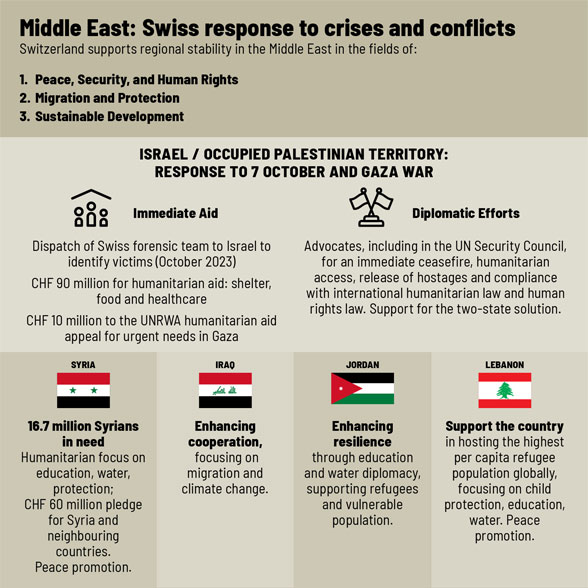
16.07.2024 – Defence of freedoms and invitation to dialogue at the heart of Federal Councillor Ignazio Cassis' speech in New York
Following the conclusion of a trip to Latin America, Federal Councillor Ignazio Cassis took part in an open debate at the UN Security Council in New York on 16 July on the maintenance of international peace and security. Russia holds the presidency of the Council in July. The head of the FDFA defended the principles of a fairer, more democratic and more sustainable world order. In view of the crisis of multilateralism, he recalled the importance of the United Nations Charter and the Geneva Conventions for the defence of individual and collective freedoms. "Since the adoption of the Charter, we, the peoples of the United Nations, have built brick by brick the foundations of our universal commitments; and together we have sought to create a better world: less poverty, alleviated epidemics, humanitarian aid for those who need it," he told the Security Council.
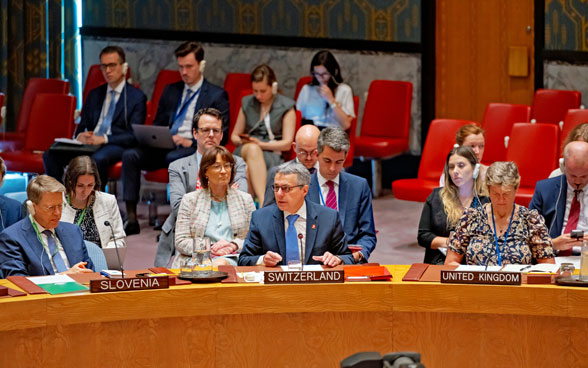
Even if freedom must be at the centre of the multilateral order, it can only be guaranteed for all if it is protected by rules. Federal Councillor Cassis explained this in New York. Rules of principle and rules of law. These include the Universal Declaration of Human Rights, which was adopted over 75 years ago. "These universal norms have made it possible to build a world in which the force of law should ultimately prevail over the law of force."
Anniversary of the Geneva Conventions
In May 2023, the head of the FDFA had already led a debate on the role of trust in diplomacy: a key element for the Security Council to fulfil its mandate. In it, he reaffirmed the need for states to seek dialogue. Switzerland in particular did this by organising the international Summit on Peace in Ukraine at the Bürgenstock in June. "We were far from all in agreement on the paths to peace, but we endeavoured to create a basis of trust for progress," the Federal Councillor assured. He also stated that Switzerland, as the depositary state of the Geneva Conventions, was ready to assume its responsibility for a world order based on humanitarian law, as the Geneva Conventions are celebrating their 75th anniversary this year.
Statement by Federal Councillor Ignazio Cassis to the UN Security Council, 16.07.2024
12.07.2024 – UN Security Council extends the mandate of the UN Office in Haiti
The UN Security Council today unanimously extended the mandate of the UN Office in Haiti (BINUH) for a further year. Switzerland supported the mandate renewal in light of the escalation of gang violence and political instability in the country.
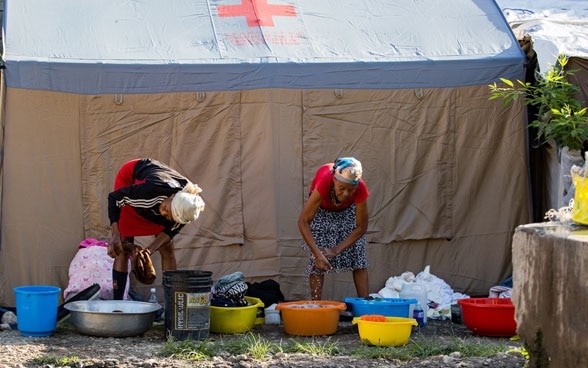
BINUH advises the Haitian government on promoting and strengthening political stability. Specifically, the office promotes an inclusive dialogue within the country. The aim is to foster reforms and implement a national strategy to reduce gang violence. BINUH also assists in the organisation of free and fair elections and is committed to strengthening human rights.
With the adoption of today's resolution, the Security Council encourages the international community to undertake additional efforts to enable the deployment of the multinational police mission. On 2 October 2023, the Council authorised the mission to restore the security of the population in the Caribbean state.
09.07.2024 – Ukraine: Emergency meeting after shelling of paediatric clinic in Kyiv
At the UN Security Council, Switzerland strongly condemned the recent Russian air strikes in the night of 8 July. The attacks resulted in deaths and injuries throughout Ukraine, and the impact of a missile on the largest paediatric clinic in Kyiv once again made girls and boys victims of Russia's military aggression, which has been ongoing for over two years. According to the UN, nearly 2,000 children have been killed or injured since 24 February. "International law, in particular human rights and humanitarian law, must be strictly respected by all parties, and in this context we call on Russia to comply with it and to protect the civilian population and infrastructure," Switzerland stressed in New York. Hospitals are under special protection according to international humanitarian law.
The people, and especially the children, in Ukraine must return to a safe and normal life. For this to become possible, Russia must stop its military aggression against Ukraine, cease hostilities and withdraw its troops from the entire territory of Ukraine. "The UN Charter obliges us all to respect the sovereignty and territorial integrity of states," Switzerland emphasised in its statement. It remains committed to contributing to a just and lasting peace in Ukraine in accordance with the UN Charter and international law. In this spirit, 100 delegations from all regions of the world met on the Bürgenstock in mid-June to inspire a process for such peace.
Statement by Switzerland on the situation in Ukraine, UN Security Council, 09.07.2024
08.07.2024 – UN Security Council extends mandate of UN mission for port security in Yemen
Today, the UN Security Council unanimously extended the mandate of the UN Mission to support the Hudaydah Agreement (UNMHA) in Yemen for another year. On the ground, the mission monitors the ceasefire between the internationally recognised government of Yemen and the Houthis in the ports of Hudaydah, Salif and Ras Issa on the Red Sea. The ceasefire was negotiated in the so-called Hudaydah Agreement between the parties to the conflict in Stockholm in 2019. In view of one of the most serious humanitarian crises of our time, which is taking place in Yemen, security in the port of Hodeidah is crucial for the delivery of humanitarian aid. Switzerland voted in New York for an extension of the mandate.
02.07.2024 – Middle East: The humanitarian situation in Gaza is deteriorating rapidly
The dramatic humanitarian situation in Gaza was the focus of a briefing to the UN Security Council today by Under-Secretary-General Sigrid Kaag, who was appointed UN Humanitarian and Reconstruction Coordinator for Gaza by the Council last December.
Switzerland expressed its deep concern about the ongoing conflict in the Middle East, which continues to cause numerous civilian casualties, and about the humanitarian situation in Gaza. According to the latest independent figures, 95 per cent of the population in the Gaza Strip is facing acute food insecurity. The risk of famine will remain as long as the conflict continues and humanitarian aid is obstructed.
The obligations under international humanitarian law and human rights law must be strictly respected by all parties. These oblige the parties to allow humanitarian access to civilians in need and prohibit the use of starvation as a method of war. The civilian population must have access to essential goods and services such as clean water, food and electricity. The aid arriving in Gaza is far from sufficient given the immense needs. “This must change urgently," emphasised Switzerland in its statement to the Security Council. It appealed for sufficient aid to reach those in need and called on the parties to the conflict in particular to act accordingly.
In New York, Switzerland reiterated the urgency of an immediate ceasefire and the immediate and unconditional release of all hostages. It also emphasised the need to restore a political horizon. Switzerland reiterated its full support for the two-state solution, which is the only basis that can offer the people in the region a life in peace, security and dignity.
26.06.2024 – Efforts to protect children in armed conflict must be stepped up
"There is no second chance for childhood. As we gather here today, children in many armed conflicts around the world fear for their lives," underlined Switzerland at the UN Security Council's annual open debate on children and armed conflict on 26 June.
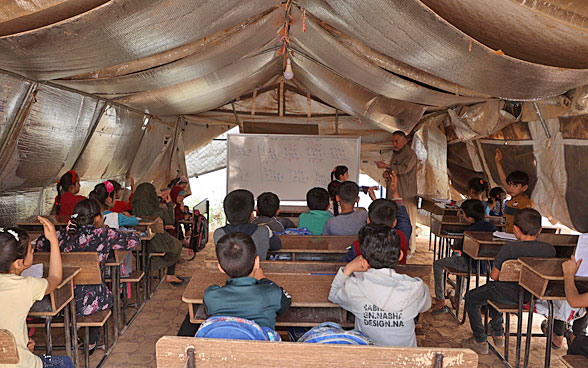
The UN Secretary-General's annual report on children and armed conflict paints a grim picture. It shows the highest number of grave violations of children's rights ever recorded, affecting children in all regions of the world. It includes alarming upward trends in the recruitment of children into armed conflict in Myanmar and the Democratic Republic of Congo, the abduction and killing of children in Israel and northern Nigeria, the overwhelming numbers of children killed and maimed in Gaza and Sudan, and the inadequate humanitarian access in both contexts. The attacks on schools and hospitals in Myanmar and Ukraine and the sexual violence against children by armed gangs in Haiti are also of particular concern.
In its statement, Switzerland stressed the need for the Security Council to step up its efforts to protect children in armed conflicts. A concrete example of this is the transition period for the withdrawal of UN missions from conflict zones. "We note with great concern that the number of serious violations of children's rights has either stagnated or increased in several transition phases, such as in the Democratic Republic of the Congo," said the Swiss representative in New York. It is the duty of the Security Council to ensure that the protection of children remains a priority in such transitional phases. Switzerland contributes to this by funding UNICEF or by sending child protection specialists to UN organizations, as it did after the withdrawal of the UN mission in Mali.
Switzerland also called on all parties to the conflict to respect international humanitarian law, to stop attacks on schools and hospitals, and to ensure access for humanitarian aid.
"Peace and respect for international law are the best protection for children. In particular, international humanitarian law, human rights and international refugee law must be respected. At the same time, it is our duty as members of the Security Council to step up our efforts to find political solutions to conflicts and to prevent them," Switzerland stressed.
Statement by Switzerland on children in armed conflict, UN Security Council, 26.06.2024
25.06.2024 – Middle East: Switzerland calls for implementation of Security Council resolutions
Today, the UN Security Council once again addressed the situation in the Middle East. In its statement, Switzerland emphasised that compliance with international law and the implementation of Security Council resolutions is urgent.
Resolution 2334, which the Council adopted in December 2016, reaffirms that Israel's settlements in the occupied Palestinian territory constitute a violation of international law and an obstacle to the realisation of the two-state solution. In New York, Switzerland criticised the fact that attacks, threats and intimidation by Israeli settlers against the Palestinian population in the West Bank, including East Jerusalem, continue with minimal impunity. It condemns these attacks, calls for an immediate cessation and recalls Israel's obligations under international law as an occupying power, including the obligation to protect the civilian population.
At today's meeting, Switzerland stated that humanitarian personnel, infrastructure and goods must be respected and protected, including the premises of UNRWA and the ICRC. With the adoption of the resolution on the protection of humanitarian personnel, which Switzerland submitted to the Security Council to vote on 24 May 2024, the Council reaffirmed the responsibility of states and parties to conflict to respect and protect the civilian population, including humanitarian personnel, in all conflicts worldwide.
Two weeks ago, the Security Council adopted Resolution 2735, which calls on all parties to immediately and unconditionally implement the three-phase plan presented by the US government, which is intended to lead to a permanent ceasefire in Gaza. When the resolution was adopted on 10 June, Switzerland stressed that this plan currently represents the best chance for a way out of the conflict, which has claimed tens of thousands of victims since the terrorist attacks by Hamas on 7 October last year, which Switzerland condemns in the strongest terms.
Accordingly, Switzerland reiterated its call for an immediate ceasefire, the rapid and unhindered delivery of humanitarian aid to the Gaza Strip, compliance with international humanitarian law by all parties and the immediate and unconditional release of all hostages.
It also reiterated the importance of the two-state solution, which is the only basis for peace and stability in the region.
Statement by Switzerland on the situation in the Middle East, UN Security Council. 25.06.2024
20.06.2024 – International humanitarian law is also applicable in cyberspace
As part of an open debate at the UN Security Council, states discussed developments in cyberspace that could pose a threat to international peace. Switzerland emphasised two aspects that require the attention of the international community. On the one hand, the increasing digitalisation of conflicts and military cyber operations can lead to new dimensions of conflict. On the other hand, the increasing intensity of attacks with ransomware and state-sponsored cyberattacks on critical infrastructure are a cause for concern. The use of ransomware to extort foreign currency and crypto assets or targeted attacks on critical infrastructure threaten to disrupt important structures of societies.

In New York, Switzerland emphasised that the Security Council should reaffirm recognised principles to counter these developments. This applies in particular to the applicability of international law in cyberspace in general and of international humanitarian law to activities in cyberspace in the context of armed conflicts.
Statement by Switzerland on threats in cyberspace, UN Security Council, 20 June 2024
18.06.2024 – Dialogue on peace in Ukraine must continue after the Bürgenstock conference
At the UN Security Council meeting on Ukraine, Switzerland underlined the goal of last weekend's Summit on Peace in Ukraine: "We must have the courage to build peace. And to do this, we need to talk about it."
In the Security Council, Switzerland thanked the 101 delegations who met on the Bürgenstock to inspire a peace process in Ukraine. The intensive dialog at the highest level enabled a better understanding of the positions of the delegations from all regions of the world in order to promote a common vision for a just and lasting peace based on the UN Charter and international law. The Bürgenstock Communiqué, which is supported by a large majority of participating states and delegations, reflects this vision and sets out three key objectives:
- the safe and secure use of Ukraine's nuclear power plants and the inadmissibility of any threat or use of nuclear weapons;
- the unhindered transportation of agricultural products across the Black Sea to improve food security;
- all prisoners of war must be released as part of a comprehensive exchange. All Ukrainian children who have been unlawfully deported and displaced, as well as all other unlawfully detained Ukrainian civilians, must be returned to Ukraine.
Switzerland emphasized in the Security Council that these issues are suitable for building trust. However, peace can only be achieved if all parties are committed and engage in dialog. "Switzerland remains a partner for peace and dialog. It is necessary to continue this commitment beyond this first conference," emphasized Switzerland in New York.
Statement by Switzerland on a peace process in Ukraine, 18.06.2024
13.06.2024 – Resolution on the situation in El-Fasher, Sudan, adopted
On 13 June 2024, the Security Council adopted a resolution on the situation in El-Fasher in Sudan. The capital of North Darfur has been besieged for weeks by the paramilitary militia "Rapid Support Forces" (RSF) and the scene of fierce fighting between the RSF on the one side and the "Sudanese Armed Forces" (SAF) and other armed groups from Darfur on the other. The ongoing fighting has led to a serious deterioration in the humanitarian situation. According to the UN High Commissioner for Human Rights, the civilian population (>1.8 million) is trapped in the city and defenceless against the fighting, or is trying to flee with no hope of safety or protection. Humanitarian aid is barely reaching the embattled areas. There is an imminent threat of famine, affecting Darfur in particular, but also the other parts of the country.
The resolution supported by Switzerland calls on the RSF to end the siege and on all parties to the conflict to fulfil their obligations under international humanitarian law and international human rights law. It also calls on the parties to the conflict to immediately cease hostilities and to protect the civilian population. It also demands that the civilian population be allowed to leave the besieged city and that the warring parties grant access for humanitarian aid. In its role as an focal point for the topic of "hunger and conflict", Switzerland insisted during the negotiations that the resolution explicitly refers to the immediate danger of famine.
Swiss statement after the vote, UN Security Council, 13.06.2024
12.06.2024 – Swiss event discusses measures to combat the disappearance of persons in armed conflicts
Every year, hundreds of thousands of persons go missing in armed conflicts. This is not only a humanitarian tragedy for the people concerned and their families, but also has long-term consequences for the stability of societies and peace efforts. What preventive measures can be taken to ensure that people do not disappear? The UN Security Council addressed this question at an informal meeting on 12 June in the so-called ‘Arria format’. This was organised by Switzerland together with the Global Alliance for the Missing to mark the fifth anniversary of UN Security Council Resolution 2474 (2019) on missing persons in armed conflicts. The event is one of a series of initiatives organised by Switzerland to implement its priority ‘Protecting civilians’.
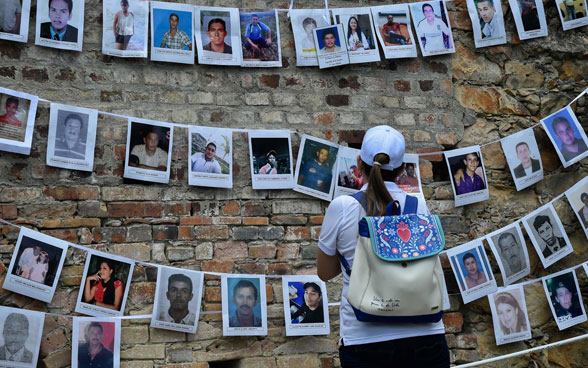
There are many reasons why people disappear: some lose contact with relatives while fleeing wars, others fall victim to arbitrary arrests. Some are never found because their remains are not exhumed or identified. As highlighted in the UN Secretary-General's Annual Report on the Protection of Civilians in Armed Conflict, the ICRC recorded the highest number of missing persons in decades in 2023. In light of these alarming figures, the Arria meeting aimed to raise awareness among the international community and emphasise the legal obligations of all parties to a conflict to prevent and search for missing persons.
At the meeting, Switzerland also emphasised the need to systematically address the issue of missing persons in mediation and peace processes. With the increase in armed conflicts worldwide, the number of missing persons is also rising. In order to prevent further disappearances and to create clarity for those who are missing a relative, those responsible must be held accountable. This is the only way to end impunity and achieve lasting peace.
In addition to accountability, other aspects - humanitarian, political, legal and extrajudicial - were also emphasised. Family members and civil organisations often play a central role in the search for missing persons. Representatives from Kuwait and Colombia shared their experiences in this area. In addition, a civil society representative from Nepal spoke about his personal involvement in reuniting families of missing relatives. The ICRC also shared its many years of experience at the meeting, for example in the work of the Central Tracing Service.
Statement by Switzerland, Arria meeting of the UN Security Council, 12 June 2024
Article: Finding and identifying missing persons is essential to rebuilding countries
10.06.2024 – Middle East: UN Security Council calls for the implementation of US President Biden's three-phase plan
With the adoption of the resolution penned by the US, the UN Security Council calls on Israel and Hamas to reach an agreement on the three-phase plan presented by US President Joe Biden and to implement it fully, immediately and unconditionally. The resolution sets out the phases of the plan as follows:
- Phase 1: an immediate, full, and complete ceasefire with the release of hostages including women, the elderly and the wounded, the return of the remains of some hostages who have been killed, the exchange of Palestinian prisoners, withdrawal of Israeli forces from the populated areas in Gaza, the return of Palestinian civilians to their homes and neighborhoods in all areas of Gaza, including in the north, as well as the safe and effective distribution of humanitarian assistance at scale throughout the Gaza Strip to all Palestinian civilians who need it, including housing units delivered by the international community;
- Phase 2: upon agreement of the parties, a permanent end to hostilities, in exchange for the release of all other hostages still in Gaza, and a full withdrawal of Israeli forces from Gaza; and
- Phase 3: the start of a major multi-year reconstruction plan for Gaza and the return of the remains of any deceased hostages still in Gaza to their families.
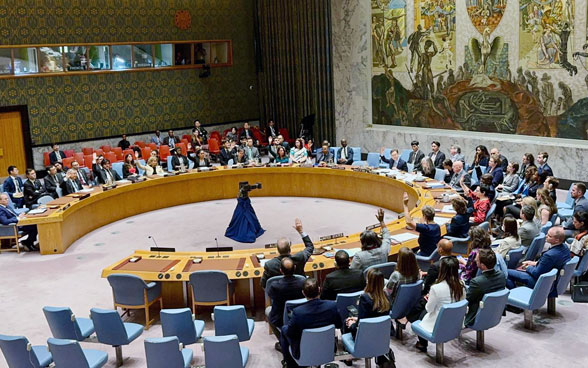
On this basis, the parties to the conflict, with the support of UN member states, should achieve a lasting end to hostilities. The adopted resolution once again underlines the Council's commitment to the two-state solution, in which Israel and Palestine exist side by side within secure and recognised borders. In this context, the resolution also emphasises the importance of the unification of the Gaza Strip with the West Bank under the administration of the Palestinian Authority.
Switzerland supported the resolution in the Security Council. After eight months of war since the terrorist attacks by Hamas on 7 October - which Switzerland condemns in the strongest terms - the restoration of a political horizon in the Middle East is urgent. In its statement after the vote, Switzerland emphasised that the plan presented by the USA is currently the option with the best chance of finding a way out of the violence in the Middle East. Switzerland therefore expects Hamas and Israel to reach an immediate and unconditional agreement and implement the plan. It also underlined that the parties must fully comply with their obligations under international law, including international humanitarian law and human rights law, as required by the UN Security Council resolutions adopted since 7 October.
Statement by Switzerland after the vote, UN Security Council, 10.06.2024
10.06.2024 – Resolution on the ISIL/Al-Qaida sanctions regime adopted
The Security Council today adopted a resolution on the regular renewal of two important institutions in the ISIL/Al-Qaida sanctions regime: The Monitoring Team and the independent Ombudsperson. The Monitoring Team provides the Security Council with reports on the implementation of sanctions. The Ombudsperson processes requests for removal from the sanctions list and thus represents an important pillar for safeguarding the rule of law in the sanctions regime. With the resolution, the Security Council expresses its desire to strengthen the Ombudsperson, which has long been a concern of Switzerland. The Security Council also addresses the issue of sexual violence by ISIL and Al-Qaeda. Switzerland has voted in favour of the resolution.
31.05.2024 – UN Peacekeeping Day: What next for UN peacekeeping?
To mark UN Peacekeeping Day, Switzerland is organising a high-level event in New York to discuss current and future challenges for UN peacekeeping. Pälvi Pulli, Deputy State Secretary for Security Policy at the Federal Department of Defence, Civil Protection and Sports (DDPS), Ambassador Thomas Greminger, Director of the Geneva Centre for Security Policy (GCSP) and Jean-Pierre Lacroix, UN Under-Secretary-General for Peace Operations, take part in the event.
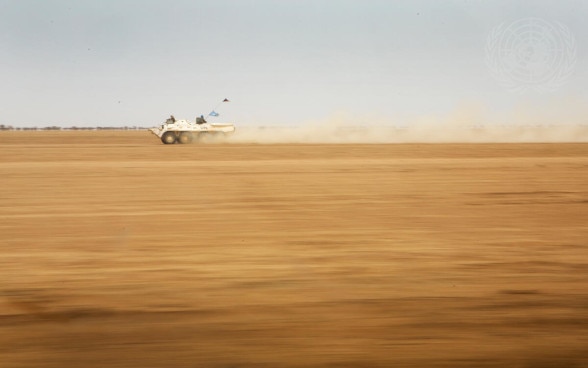
Geopolitical shifts and the numerous interrelated challenges, such as the effects of climate change or economic crises, can have a negative impact on international peace and security. This also affects UN peacekeeping missions around the world. Today's event in New York creates space for a forward-looking policy dialogue. It brings together peacekeeping experts from around the world. The aim is to exchange views on how best to prepare UN peacekeeping operations for these challenges. By organising this exchange, Switzerland is contributing to the promotion of sustainable peace, a priority of the Federal Council for Switzerland's membership on the UN Security Council in 2023-2024.
New peacekeeping app provides quick overview of UN peacekeeping missions
On this occasion, Switzerland is also presenting an exhibition with data and insights behind the scenes of UN peacekeeping. This is the result of the "UN Peace Mission Mandates" (UNPMM) project, which is being carried out by ETH Zurich and the Graduate Institute of Geneva with the support of the Swiss National Science Foundation and the FDFA.
Through a smartphone application, this project provides a quick overview of comprehensive datasets on the mandates of UN peacekeeping missions, including the various mandate components and the evolution of these missions over the years. For example, you will find useful summaries of why a mission was created and why it was ended, or a table that allows you to easily compare which missions pursued a particular task – such as promoting human rights or climate security. The Peacekeeping App can be downloaded from the App Store or Google Play, or accessed via the website.
The experience of the United Nations Truce Supervision Organization in the Middle East (UNTSO) plays an important role here. In 1948, the UN Security Council mandated UNTSO as its first peacekeeping mission to observe the ceasefire between Israel and Syria. It is still active today and has acquired a great deal of knowledge and experience over the past 75 years. Even in a difficult environment, UNTSO's work demonstrates many of the qualities of flexible, adaptable and effective missions that the UN seeks to promote in the future. On this basis, the GCSP, together with the EPON organisation, has prepared a study to show how UNTSO's experience can be relevant to other and future peace missions. The Swiss-funded study will also be presented and discussed at the event.
31.05.2024 – UN Security Council renews two mandates and a sanctions regime
The UN Security Council has renewed the mandate of the UN Assistance Mission in Iraq (UNAMI), the sanctions on South Sudan and the resolution on combating arms trafficking off the Libyan coast. Switzerland supported all three resolutions.
The resolution on combating arms trafficking off the Libyan coast authorises UN member states and regional organisations active there to inspect and seize ships on the high seas that they have reasonable suspicion of contributing to the delivery of arms to Libya.
The UN Assistance Mission for Iraq (UNAMI) advises and assists the Iraqi government and people in promoting inclusive political dialogue and reconciliation at national and local levels, the electoral process, the protection of human rights and judicial and legal reforms. UNAMI's mandate was extended today for the last time until the end of 2025. The mission will then be withdrawn.
The extension of the sanctions measures in South Sudan on 30 May, which include an arms embargo on the entire territory of South Sudan and targeted sanctions against individuals on both sides to the conflict, as well as the mandate of the associated panel of experts, are important steps by the Security Council for stability in the region.
29.05.2024 – Rocket fire on Israel and attacks on Rafah: Switzerland condemns the escalating violence
The UN Security Council today once again discussed the situation in the Middle East. Switzerland is extremely concerned about the spiral of violence which reached a new level last weekend.
Switzerland strongly condemns the Israeli attack on a camp for displaced persons in Rafah on 26 May. According to the UN, this attack resulted in dozens of civilian casualties. The population of Gaza is in dire need of protection, having already been displaced, facing the threat of famine and continuing to suffer from the hostilities. Switzerland also strongly condemns the continued and indiscriminate rocket attacks by Hamas on Israel, as was the case on 26 May. Such attacks are a violation of international humanitarian law. It has underlined this in the Security Council.
In this context, Switzerland recalled in New York that all parties must comply with their obligations under international humanitarian law. They must observe the principle of distinction without exception and take precautionary measures to protect the civilian population and prevent damage to civilian objects. Switzerland reiterated to the Council its call for an immediate ceasefire, safe and unhindered humanitarian access and the immediate and unconditional release of hostages.
Switzerland also addressed the Security Council on the situation in the West Bank. It condemned the violence perpetrated by Israeli settlers, including repeated attacks on UN facilities in East Jerusalem and on humanitarian aid convoys.
Respect for international humanitarian law by all parties, as well as the implementation of UN Security Council resolutions and the preventive measures of the International Court of Justice, are prerequisites for de-escalation. Switzerland remains firmly convinced that only a negotiated two-state solution, in which Israel and Palestine live side by side in peace and security within recognized borders, is the basis for lasting peace in the Middle East.
Statement by Switzerland on the situation in the Middle East, UN Security Council, 29.05.2024
24.05.2024 – West Africa and the Sahel: UN Security Council adopts Swiss presidential statement
The UN Security Council has agreed on a presidential statement on the situation in the Sahel and West Africa. This region is the responsibility of the UN regional office UNOWAS. Switzerland, together with Sierra Leone, is leading this dossier. In February 2023, it succeeded in extending the mandate of UNOWAS for a further three years.
What is a presidential statement?
A presidential statement is a formal statement of the Security Council adopted by consensus and read by the President of the Security Council. In such a statement, the Council expresses its views on a geographical situation or on a current peace or security issue. A presidential statement may reaffirm elements of previous resolutions or serve to initiate future Security Council decisions.
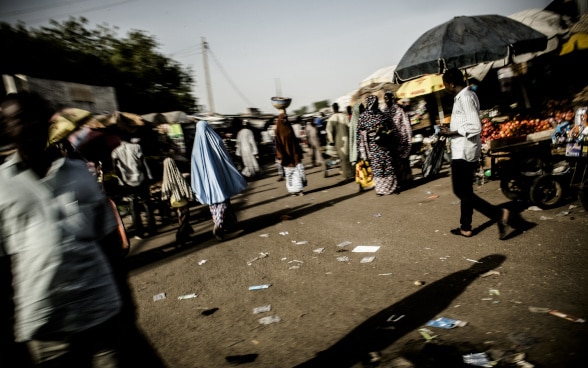
The presidential statement sends an important message from the Security Council to West Africa and the Sahel – a region that faces many challenges and is often low on the list of priorities in international fora. There has been no Security Council product on this region for nearly three years. The adoption by consensus is the result of thorough work carried out by the elected States of the Security Council in several rounds of negotiations since the beginning of 2022. In the statement, the Council expresses its concern about security in the region, as well as the humanitarian and political situation.
Security
The presidential statement emphasizes that the Security Council is aware of the difficult security situation in West Africa and the Sahel. Contributing factors include armed conflict, including with armed groups linked to international terrorist organizations, transnational organized crime, and climate change, which is disproportionately affecting the region. In its statement, the Security Council condemns the continuing violations of international humanitarian law, including attacks against civilians and civilian objects. It calls for all actors to be held accountable for violations of international humanitarian law or human rights.
Political situation
In the statement, the Security Council emphasizes the progress made in several countries in preserving and promoting democracy, such as the peaceful conduct of elections, dialogue and reconciliation processes. However, the Council also expressed concern about unconstitutional changes of government and attempted coups, which are known to have an impact on peace and security in the region. It emphasizes the importance of restoring constitutional order in countries in the region undergoing political transition. Furthermore, the Council recognizes the good work of UNOWAS in preventing conflicts and tensions and promoting peace and political stability.
Humanitarian situation
In the presidential statement, the Security Council expresses its concern about the deteriorating humanitarian situation in some parts of the region, caused by conflict and exacerbated by other factors such as climate change. The consequences are increasing forced displacement, extreme poverty and lack of food and water, social inequalities and violence. As a co-leader and within the framework of its priority "Addressing climate security", Switzerland has worked to ensure that this issue is given due consideration. The Security Council calls for unhindered and rapid access to humanitarian and medical aid for all those in need, as well as access to education and health care.
Switzerland worked closely with the co-chairs Ghana (2023) and Sierra Leone (2024) during the negotiations that led to the presidential statement and maintained a dialogue with all Council members.
24.05.2024 – Protection for humanitarian personnel: UN Security Council adopts Swiss resolution
On 24 May 2024, the UN Security Council adopted a resolution for the protection of humanitarian and UN personnel in conflict zones. The resolution, which was negotiated and submitted by Switzerland to the Security Council for a vote, highlights the country's long-standing commitment to the protection of civilians – a priority of the Federal Council for Switzerland's 2023–24 term on the council.
The number of armed conflicts worldwide is increasing rapidly. While the world was confronted with around 20 conflicts at the turn of the millennium, this number has now surged to over 120 armed conflicts. Millions of people on almost every continent are in need of humanitarian aid, while the humanitarian and UN personnel providing this vital aid are facing increasing pressure and becoming victims of attacks themselves. More than 500 humanitarian aid workers were victims of violence in 2023, with over 250 killed. Over the past decade, the number of victims from humanitarian aid organisations has risen by more than 50%, with 90% of those affected being national or local employees.
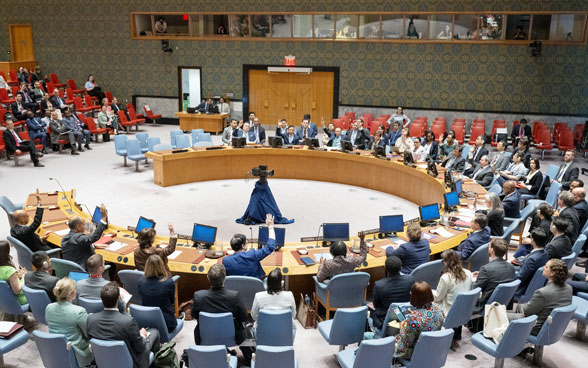
Switzerland is deeply concerned about the increasing violence against people who provide aid. Such attacks take place in all conflict regions and often hinder life-saving measures. As an elected member of the UN Security Council, Switzerland took the initiative to negotiate a draft resolution on the protection of humanitarian and UN personnel. The adoption of the resolution is an important signal for the protection of civilians. The resolution garnered widespread support, with a total of 98 UN member states co-sponsoring the initiative.
Through this resolution, the Security Council specifically calls on UN member states to fulfil their obligations under international law to protect humanitarian and UN personnel, including national and local staff, as well as their premises and assets. The resolution also addresses emerging threats faced by humanitarian and UN personnel, including disinformation campaigns aimed at undermining their work. The Security Council expressly calls on all states, as well as state and non-state parties to conflicts, to respect and protect humanitarian and UN personnel. The resolution mandates the UN secretary-general to provide the Security Council with concrete recommendations within six months on how to better prevent such attacks and combat impunity.
The adoption of this resolution not only reinforces Switzerland's enduring commitment to humanitarian principles but also serves as a timely reminder of the importance of international humanitarian law, especially as we approach the 75th anniversary of the Geneva Conventions in August. Providing support and protection to people in need is a cornerstone of Switzerland's Foreign Policy Strategy 2024–27.
23.05.2024 – African countries' expertise in conflict prevention must be further mobilised
“Many new opportunities are emerging for Africa.” This is what Federal Councillor Ignazio Cassis wrote in the foreword to the Federal Council's Sub-Saharan Africa Strategy 2021-2024. It was precisely this potential that was at the centre of an open debate at the UN Security Council today, chaired by Mozambique. ‘We can further mobilise the potential of African countries based on their experience in the field of prevention,’ emphasised Swiss UN Ambassador Pascale Baeriswyl in New York.
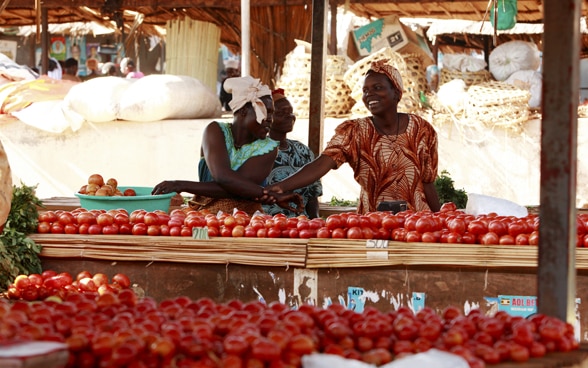
Africa continues to face various challenges. Instability and conflict on the African continent stem from a mixture of profound causes: lack of economic prospects, weak state presence in some regions, competition for resources and the indirect consequences of climate change. Effective conflict prevention must take all these instability factors and their interactions into account.
In New York, Switzerland emphasised that the knowledge and insights of African states from a decades-long tradition of conflict resolution and mediation have great potential for national conflict prevention. This also includes dealing with the past, which is an important pillar for creating sustainable peace. For example, there is a special court in Sierra Leone and a truth commission in South Africa to establish justice for victims of human rights violations. Such institutions also serve to prevent future atrocities and promote the reconciliation of communities.
African states and the African Union are well positioned to play an important role in prevention not only on the African continent but also at multilateral level. In New York, the representative of Switzerland emphasised the great potential of increased cooperation between the African Union and the UN Security Council. The Council can learn from the experiences of African countries in the area of conflict prevention. For example, the exchange between the Security Council and the African Union planned during the Swiss Security Council Presidency in October 2024 is an important instrument for the mutual exchange of information.
21.05.2024 – Debate in the UN Security Council during the Protection of Civilians Week
In 1999, the UN Security Council adopted a resolution that for the first time introduced the protection of civilians in armed conflict. 25 years later, this issue, which was established as a guarantor of international peace and security, is increasingly facing serious threats. With increasing challenges such as the difficulty of humanitarian access into Gaza, sexual violence and indiscriminate attacks on civilians in Sudan, attacks on civilian infrastructure in Ukraine and three million people displaced by the conflict in Myanmar, the principles of international humanitarian law are being eroded.
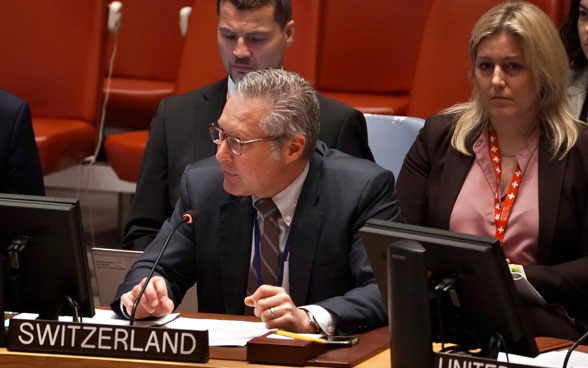
Today's debate at the UN Security Council, initiated by Mozambique, aimed to reaffirm the historical importance of the international rules that have been established over the last century, since the signing of the Geneva Conventions 75 years ago. The aim of today's exchange was to strengthen the protection of civilians worldwide. The commitment of UN member states and other stakeholders is central to upholding and promoting the principles of international humanitarian law and strengthening human rights.
“The Geneva Conventions are the foundation of the normative architecture that we have built stone by stone from the ruins of war to protect the civilian population. It is therefore difficult to understand why we are now deconstructing our own work with words and deeds,” explained FDFA Deputy State Secretary Thomas Gürber during the Council debate. Stronger mechanisms are needed to ensure compliance with the rules and accountability, particularly in a context where the nature and methods of warfare are constantly changing.
In the Security Council, Switzerland appealed to the common sense of parties to a conflict. In particular, it calls for rapid, safe and unhindered access for humanitarian aid, which de facto means better protection for the staff of humanitarian organisations. “Let's change this. Let's fulfil our responsibility,” concluded Thomas Gürber.
Article: The Security Council resolution on the protection of civilians is 25 years old
20.05.2024 – Middle East: Switzerland calls for immediate ceasefire and implementation of UN Security Council resolutions
The UN Security Council today addressed the humanitarian situation and the plight of civilians in the Middle East. Scores of civilians continue to be killed and injured in the Gaza Strip as a result of the ongoing hostilities. Hundreds of thousands of people have been displaced. Against this background, Switzerland has called in the Security Council for an immediate ceasefire and an end to the ongoing military operation in Rafah. The consequences of this operation for the civilian population in Rafah, which has been suffering from bombardments, repeated displacement and hunger for more than seven months, are unacceptable. What the population needs today is support, not more suffering," emphasized Switzerland's UN Ambassador Pascale Baeriswyl in New York.
In its statement, Switzerland referred to the numerous resolutions adopted by the Security Council to condemn and stop attacks on civilians, hostage-taking and acts of terrorism. The terrorist acts by Hamas and the hostage-taking of October 7, which Switzerland condemns in the strongest terms, violate all these resolutions. Switzerland continues to call for the immediate and unconditional release of all hostages.
In the Council, Switzerland welcomed the fact that the possibility of delivering humanitarian aid to the Gaza Strip by sea has been created. At the same time, it pointed out that the humanitarian aid currently reaching Gaza was far from sufficient. It called on all parties to fulfil their obligations to ensure humanitarian access throughout the Gaza Strip. It is also essential that the parties ensure the protection of humanitarian personnel so that they can fully carry out their tasks.
In view of the humanitarian catastrophe unfolding in the Middle East, Switzerland called for the immediate implementation of the relevant Security Council resolutions. These resolutions are binding under international law and oblige all parties to respect international humanitarian law and human rights. Switzerland also reiterated its support for a negotiated two-state solution in which Israel and Palestine live side by side in peace within secure and recognized borders. Such a solution is the only way to achieve lasting peace in the Middle East.
Statement by Switzerland on the situation in the Middle East, UN Security Council, 20.05.2024
17.05.2024 – Swiss Arria meeting at the Security Council: Unlocking the potential of science for peace and security
On 17 May 2024, Switzerland organised an informal meeting of the UN Security Council that focused on strengthening the interplay between science and the work of the Security Council. To this end, it brought speakers from two key Swiss scientific institutions, GESDA and ETH, to New York. ‘The Security Council has a mandate to deal with the many crises that are shaking the world. But even in these difficult times, it is crucial that we take a longer-term view,’ said Thomas Gürber, Deputy State Secretary of the FDFA, addressing the Security Council. The number of conflicts in the world is increasing and the challenges to peace and security in the world are becoming ever more complex. The consequences of climate change are exacerbating existing risks, new technologies are having a profound impact on our societies and disinformation is threatening trust between states.
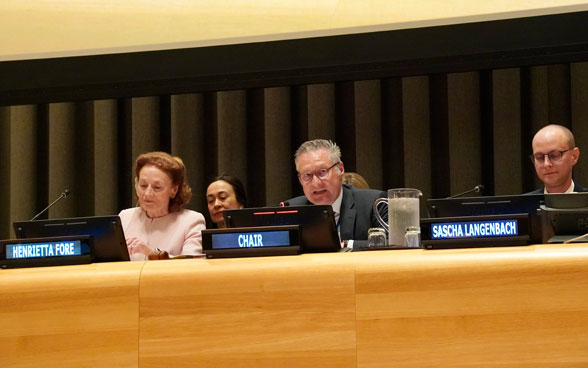
The meeting, organised by Switzerland, aimed to gather perspectives on how the Security Council could strengthen its interaction with the scientific community to put evidence-based knowledge at the service of peace and security. Science has the potential to strengthen trust between states. ‘Trust is based on mutual understanding, but also on reliable facts and knowledge. Scientific actors have the tools and experience to produce reliable knowledge,’ emphasised Thomas Gürber in New York. The Security Council needs to act decisively on the basis of scientific findings in order to understand, anticipate and address risks to peace and security.
To ensure this in concrete terms, Switzerland is already promoting dialogue between UN member states and the academic world, for example, in order to better understand specific risk multipliers for conflicts such as climate change in certain operational contexts of UN peacekeeping missions. In doing so, it can draw on its experience from the Swiss ‘Blue Peace’ initiative, in which it combines sound knowledge with political dialogue to promote regional and cross-border cooperation on the peaceful management of limited water resources. Switzerland's long-term goal is a UN that works with the latest tools and methods based on data and scientific knowledge. This harbours great potential for better supporting the work of the Security Council and UN peacekeeping missions on the ground.
News article: Interview with GESDA and ETH on the potential of science for peace and security
15.05.2024 – Bosnia and Herzegovina: Perspectives for young people, trust in institutions and dealing with the past are key to sustainable peace
Almost 30 years have passed since the end of the armed conflict in Bosnia and Herzegovina. The Dayton Peace Agreement, which was signed by the conflict parties on 14 December 1995, laid the foundations for the formation of a multi-ethnic state with a democratically elected government and for peace in Bosnia and Herzegovina. However, tensions between the various ethnic groups in society continue to flare up. "Switzerland reaffirms its commitment to supporting Bosnia and Herzegovina on the path to peace, stability and prosperity and to building a united future for the young generation," emphasised Switzerland in the Security Council.
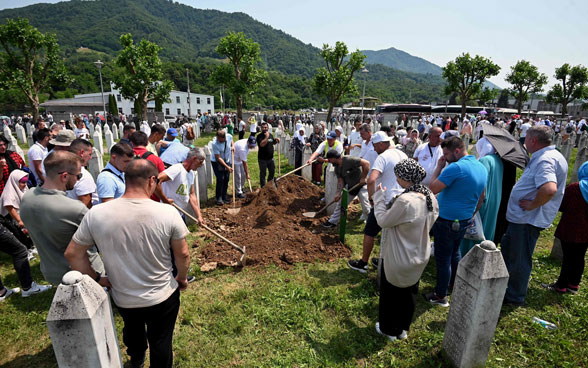
A crucial aspect of achieving this is creating prospects for people throughout the country. For example, the Swiss Agency for Development and Cooperation (SDC) is supporting the Youth for Change project, which is being implemented by the Mozaik Foundation to mobilise and empower young entrepreneurs to drive economic and political change in Bosnia and Herzegovina. The project aims to support young innovative people between 2016 and 2026 to represent inclusive economic and social values and create jobs. They act as role models for other young people and contribute to the prosperity of the country and thus to the well-being of all. Over 450,000 people across the country have taken part in the project so far.
In addition to creating perspectives, society's trust in the functioning of state institutions in Bosnia and Herzegovina, in the constitutional order and in the protection of fundamental freedoms must be strengthened. This lays the foundation for a democratic, peaceful and stable society. Switzerland also emphasised in the Security Council that all parties must step up their efforts to promote peaceful coexistence and reconciliation and refrain from hate speech and divisive rhetoric. Historical and legal reappraisal of the past is also necessary in order to prevent violence and create sustainable peace.
29.04.2024 – Switzerland supports the extension of the UN mission in South Sudan
The UN Security Council today extended the mandate of the UN Mission in South Sudan (UNMISS) for a further year. Switzerland supported the resolution in New York because UNMISS makes an important contribution to the protection of civilians and the promotion of sustainable peace, both priorities of its Council membership. The tasks of UNMISS include promoting the implementation of the peace agreement, strengthening international humanitarian law and human rights, and providing logistical support for humanitarian programmes in the country.
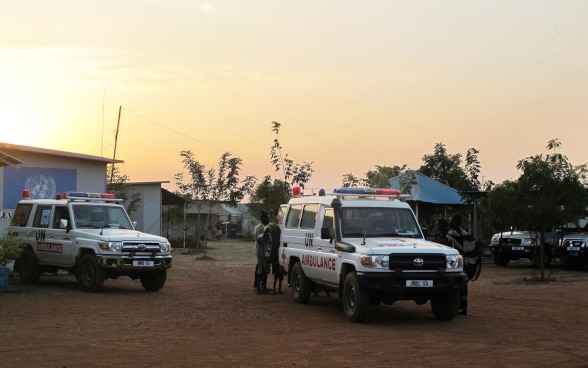
After decades of conflict, South Sudan gained political independence in 2011. However, the new government collapsed in 2013 and a civil war began that ended with a peace agreement in 2018. But this peace is deceptive: the many problems that tore society apart still exist, and the deep traumas of the recent wars remain unresolved. Political reforms that would address these challenges are still a long way off. Elections are scheduled for December 2024, but there is no confirmation that they will take place.
Switzerland has already underlined its full support for the UNMISS mandate in a public briefing to the Security Council on 5 March 2024. At that time, it also underlined key aspects that are central to stability and security in South Sudan. These include the creation of a secure environment for the holding of elections. Free, fair and inclusive elections, which the resolution adopted today also mandates UNMISS to support, are central to the implementation of the 2018 peace agreement. On the other hand, the already precarious humanitarian situation needs to be improved. This has deteriorated significantly as a result of the ongoing war in Sudan since mid-April. To date, more than half a million Sudanese refugees have found shelter in Southern Sudan. The influx of people from Sudan exacerbates existing economic, social and political tensions and has a negative impact on South Sudan's fragile food security situation. This is already under pressure from conflict, displacement and climate change. Rapid and unhindered humanitarian access is essential to deliver aid to people in need. It is also essential to protect humanitarian personnel.
A fragile peace in South Sudan
Statement by Switzerland on the situation in South Sudan, UN Security Council, 05.03.2024
22.04.2024 – Promoting free, fair and secure elections in Haiti
Haiti is currently experiencing a multidimensional crisis and the security situation in the country is deteriorating significantly. Criminal gangs still control large areas of the capital, Port-au-Prince, and are extending their influence to other parts of the country. Gang violence, internal displacement, human rights abuses, kidnappings and sexual violence continue to undermine the prospects for peace on the island. The escalating violence is having a dramatic impact on the civilian population.
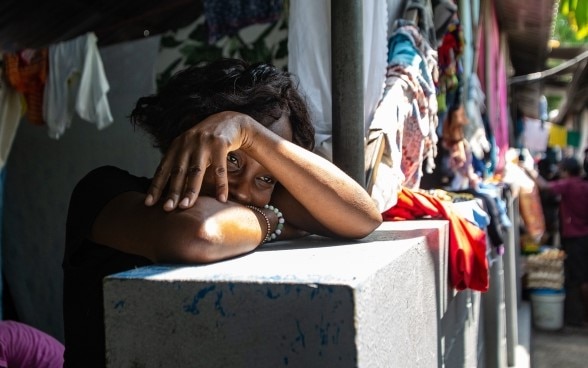
A Transitional Presidential Council has been formed to appoint a new interim Prime Minister and a Council of Ministers. Facilitated by CARICOM, the Caribbean Community, the creation of the Presidential Transitional Council is intended to promote an inclusive and participatory inter-Haitian dialogue, which is the only way to achieve a political solution to the crisis. It will have the difficult task of facilitating the holding of free, participatory, fair and secure elections.
In a briefing to the UN Security Council today, Switzerland welcomed the recent formation of the Presidential Transitional Council and the facilitating role played by CARICOM. "Given the importance of the phase of political transition opened up by these encouraging measures, it is essential that they are implemented swiftly and inclusively, without creating a political vacuum that could further disrupt the fragile security situation," Adrian Hauri told the Council.
Responding to the hopes of the Haitian people
Switzerland also reiterated the need for a significant increase in humanitarian aid to meet the needs of the Haitian population. Nearly half of the Haitian population suffers from food insecurity as a result of gang violence, in particular due to movement restrictions and supply difficulties throughout the country. It also praised the work and efforts of the staff of the United Nations Integrated Office in Haiti (BINUH).
Finally, Switzerland called on the international community to use all available means to support the Haitian National Police. In particular, Switzerland called for the rapid deployment of the Multinational Security Support Mission (MMSS) authorised by the UN Security Council on 2 October. The situation is at a tipping point and it may soon be too late to act," Switzerland said in its statement. The Security Council and the international community must continue their efforts to respond to the hopes of the Haitian people.
Statement by Switzerland on the situation in Haiti, UN Security Council, 22.04.2024
22.04.2024 – Building trust is central to the normalisation of relations between Serbia and Kosovo
The UN Security Council today discussed the current situation in Kosovo in the presence of the President of Serbia, Aleksandar Vučić, and the President of Kosovo, Vjosa Osmani. In its statement, Switzerland underlined that trust between the two countries must be further strengthened in the interest of both communities. To this end, both parties must focus on moderate rhetoric, strive for further progress in the EU-led normalisation process and follow up on commitments already made with concrete actions.
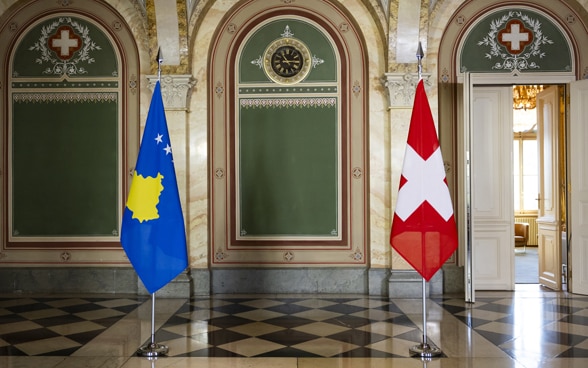
Through its good offices, Switzerland is committed to building constructive relations between the parties. Since 2015, for example, it has been organising meetings in parallel with the EU-led dialogue to facilitate personal contacts between representatives of Kosovo and Serbian political parties. "Both sides share the responsibility for reducing tensions," Switzerland stressed in the Security Council.
Building mutual trust between the ethnic groups is the key to reducing escalation. An important aspect in this area is dealing with the past. For example, Switzerland has supported Kosovo in setting up a truth and reconciliation commission. It is also helping families to clarify the fate of missing or imprisoned persons.
Switzerland's international cooperation in Kosovo focuses on three thematic areas: democratic governance and peace; sustainable economic development; and climate change, water and health. Gender aspects are also taken into account in all projects.
Statement by Switzerland on the situation in Kosovo, UN Security Council, 22.04.2024
19.04.2024 – The OSCE is a central pillar of the peace architecture in Europe
The Organisation for Security and Co-operation in Europe (OSCE) and the UN Security Council share the same goal: to establish and maintain peace and security. The Security Council is committed to this mandate at the global level, the OSCE at the regional level. Co-operation between the two multilateral bodies is essential. This was the focus of a briefing to the Security Council today.
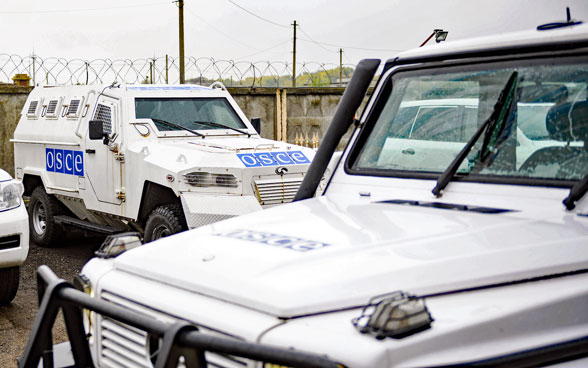
The establishment of the OSCE nearly 50 years ago laid the foundation for a peaceful, rules-based order in the OSCE region, as envisioned by the UN Charter. The war against Ukraine has shaken the OSCE and presented it with new challenges, but it continues to make an important contribution to stability in many regions of our continent. In Abkhazia and South Ossetia, for example, it is helping to prevent and resolve conflicts peacefully. In the Western Balkans, the OSCE promotes democratic governance, inclusive elections, human rights, economic activity and the involvement of young people in political processes. These are all key factors for sustainable peace - one of Switzerland's priorities for its membership of the UN Security Council.
As an impartial mediator and observer, and through its independent election monitoring, the OSCE is a central pillar of the architecture of peace and security in Europe, especially in times of increased pressure. Parallel to its seat on the UN Security Council, Switzerland is also committed to effective multilateralism and peace within the OSCE. It attaches great importance to coherence between the two bodies. A secure Europe also requires a strong and effective OSCE.
Statement by Switzerland, OSCE briefing, UN Security Council, 19.04.2024
18.04.2024 – Palestine's application for full membership of the United Nations
Palestine's application for full UN membership will not be submitted to the UN General Assembly due to the veto by the United States on 18 April in the UN Security Council. Switzerland abstained from the vote. After assessing the situation and consulting with the chairs of the parliamentary foreign affairs committees, the Federal Council concluded that granting Palestine full UN membership at this time would not be conducive to easing the situation and peace efforts in the Middle East. Switzerland remains committed to the two-state solution.
Palestine has had observer state status at the United Nations since 2012. It reactivated its previously inconclusive 2011 application for full UN membership on 2 April 2024. Full UN membership is decided by the UN General Assembly in accordance with the UN Charter. The UN Security Council must make a positive recommendation for admission before the General Assembly can vote on a membership application. Since the United States vetoed the recommendation for Palestine's membership, the application will not proceed to a vote in the General Assembly.
In view of the current highly unstable situation in the Middle East and from an overall peace policy perspective, Switzerland believes that admitting Palestine as a full UN member is not advisable at this time. The Federal Council therefore decided that Switzerland would abstain from the vote on the Palestinian application in the UN Security Council. Before making this decision, the Federal Council conducted a thorough assessment of the overall geopolitical situation and consulted with the chairs of the foreign affairs committees of both the National Council and the Council of States, as required by Article 152 paragraph 4 of the Parliament Act. Switzerland considers that it would be better to proceed with Palestine's accession to the United Nations as a full member at a time when such a step would fit in with the logic of an emerging peace.
Switzerland remains committed to the two-state solution. The Federal Council, as outlined in the MENA Strategy 2021–24, firmly believes that lasting peace in the Middle East can only be achieved through a negotiated two-state solution that adheres to international law and internationally agreed parameters.
Statement by Switzerland after the vote, UN Security Council, 18.04.2024
Press release: Palestine's application for full membership of the United Nations, 18.04.2024
18.04.2024 – Middle East: two-state solution is the basis for lasting peace
The UN Security Council held a ministerial debate on the current situation in the Middle East. In view of recent developments and the escalating spiral of violence, Switzerland emphasized in its statement the urgent need for de-escalation and respect for international law. "Respect for the UN Charter, international humanitarian law and human rights must be a guiding principle for all parties to the conflict," Switzerland's UN Ambassador told the Security Council.
Since the terrorist attacks by Hamas on October 7, which Switzerland condemns in the strongest terms, the Security Council has adopted three resolutions that have not been implemented. In New York today, Switzerland called for their immediate implementation. "The ceasefire called for in the resolution of March 25 has not been respected, not all hostages have been released and numerous civilians are becoming victims of the hostilities every day," recalled the Swiss ambassador to the UN.
The already dramatic humanitarian situation in the Gaza Strip is deteriorating rapidly and famine is imminent. Humanitarian aid must be channeled unhindered through all possible border crossings and distributed throughout the Gaza Strip, including the north. Switzerland also reiterated its demand for the immediate and unconditional release of all remaining hostages.
At the same time, it is important not to lose sight of the situation in the West Bank. Violence there has reached record levels, including settler violence, which Switzerland condemns.
In New York, Switzerland called on all parties for strict compliance with international humanitarian law. It remains convinced that the basis for lasting peace in the Middle East is a two-state solution. Only this solution, negotiated by both sides in accordance with international law, can lead to a lasting peace between Israelis and Palestinians. "Switzerland is ready to contribute constructively to such a solution," emphasized the Swiss ambassador in New York.
Statement by Switzerland on the situation in the Middle East, UN Security Council, 18.04.2024
17.04.2024 – Young people play a key role in peace
On 17 April 2024, the UN Security Council held a debate on the role of young people in peace in the Mediterranean Basin. Switzerland considers that young people must be provided with an environment in which they can develop and contribute to social cohesion, the reduction of tensions and the economy.
"The fate of every nation depends on its youth", says an Arabic proverb - a language spoken by many young people in the Mediterranean region. Young people play an important role in peacebuilding. Many young men and women in the Mediterranean Basin have grown up with wars and conflicts, in Bosnia and Herzegovina, Syria and the Middle East, for example. In addition, there are other challenges such as a lack of economic prospects, barriers to political participation and the negative consequences of climate change, which are particularly felt in the Mediterranean region.

In their search for a better life, these young people are increasingly losing trust in state institutions. A lack of state protection, forced displacement or arbitrary arrests are factors that accelerate the loss of trust. Despite this, many young people in the Mediterranean countries are showing resilience and advocating for a better future. Their resilience and drive are key pillars for building sustainable peace – a priority for Switzerland in its mandate at the UN Security Council.
"The willingness of youth to engage is undeniable. What is needed is the willingness of political leaders to do their part," said Swiss UN Ambassador Pascale Baeriswyl in the Council. In its statement in New York, Switzerland emphasised the elements that are necessary for young people to participate effectively and develop their potential: Empowerment, appreciation and protection. Firstly, young people need sustainable economic prospects in order to promote trust and participation in politics. In Bosnia and Herzegovina, for example, Switzerland is supporting young people in developing professional skills as part of the "Youth for Change" project. Furthermore, legal and institutional barriers must be lifted so that young people's ideas for peace are heard. For the Security Council, for example, this could mean better implementing its resolutions on the youth, peace and security agenda with the help of an action plan. Finally, young people need offline and online platforms where they can express themselves without fear of reprisals. Hate speech and discrimination should give way to intercultural and intergenerational dialogue.
Swiss statement on the role of young people for peace, UN Security Council, 17.04.2024
05.04.2024 – Middle East: Emergency meeting on the threat of famine and attacks on humanitarian personnel
In an emergency meeting today, the UN Security Council addressed the catastrophic food security situation in the Gaza Strip and attacks on humanitarian personnel. The meeting was requested by Switzerland, among others. Despite the adoption of the resolution of 25 March 2024, which calls for an immediate ceasefire, the fighting continues. The resulting lack of access to food and inadequate water supplies are catastrophic for the civilian population. According to UNICEF, nowhere else in the world is child malnutrition as precarious as in the Gaza Strip.
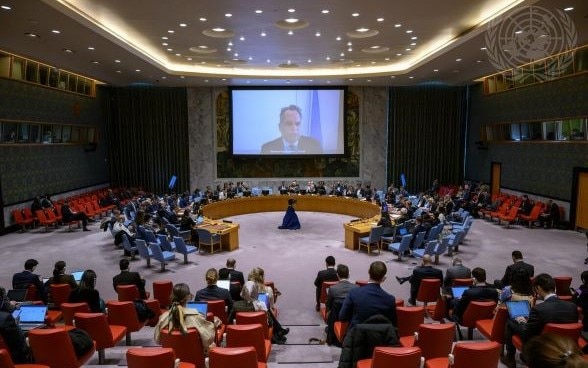
Only humanitarian aid could provide a remedy. However, widespread insecurity and restrictions on movement are forcing humanitarian organisations to stop their work. "The Gaza Strip has become the most dangerous place for humanitarian workers," emphasised Swiss Ambassador Adrian Hauri, Chargé d'affaires at the UN Security Council. In New York, Switzerland expressed its respect for all humanitarian aid workers who risk their lives every day in the Middle East. "Our thoughts today are with the organisations and families of the two hundred or so humanitarian workers who have been killed in Gaza since 7 October. Attacks on humanitarian workers are a violation of international humanitarian law and must stop immediately," said Adrian Hauri.
Switzerland reminded the Council of the International Court of Justice's call for Israel to work closely with the UN to ensure the provision of urgently needed basic supplies and humanitarian aid by all parties involved. In view of this, Switzerland once again appealed to the parties to strictly observe international law, in particular international humanitarian law and human rights law. Switzerland emphatically called for the implementation of all Middle East resolutions adopted by the Security Council since the escalation of violence last October. "An immediate ceasefire is the only way to ensure that no more civilian lives are lost," emphasised the Swiss ambassador. In addition, all hostages still being held in Gaza must be released immediately and unconditionally.
Statement by Switzerland on the situation in the Middle East, UN Security Council, 05.04.2024
04.04.2024 – Worsening conflicts in Myanmar: Switzerland calls for action
The UN Security Council has discussed the situation in Myanmar. Since the military coup in 2021, the country has been facing a deep political, social, economic and humanitarian crisis. Armed groups in different parts of the country have been fighting against military forces for many years. The escalation of violence has had a devastating impact on the civilian population. Human rights violations and large-scale internal displacement are taking place throughout the country.
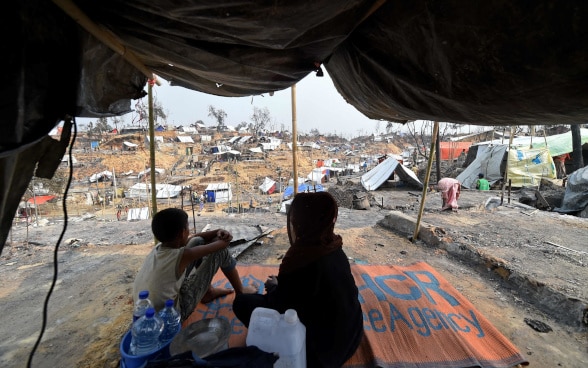
In the Council, Switzerland condemned the escalation of the armed conflicts, which have intensified since the military takeover, and called for dialogue between all conflict parties in order to find a political solution. Independent reports indicating that war crimes and crimes against humanity may have been committed in Myanmar are a cause for concern. In New York, Switzerland appealed to the conflict parties to respect their obligations under international humanitarian law and human rights law. It also stressed that all parties must allow rapid and unimpeded humanitarian access. The protection of civilians and humanitarian and medical personnel must be guaranteed. Furthermore, close cooperation between the UN and regional actors such as the Association of Southeast Asian Nations (ASEAN) is essential for mediation and the provision of humanitarian aid.
In its statement, Switzerland stressed the need for the UN Security Council to play a more active role in building peace and security in Myanmar. It is therefore ready to support Council measures to reduce violence, protect civilians and ensure humanitarian access.
Statement by Switzerland on the situation in Myanmar, UN Security Council, 04.04.2024
02.04.2024 – Middle East: Air strike against the Iranian consulate in Damascus
Switzerland condemns the airstrike against the Iranian consulate in the Syrian capital Damascus, which killed and injured several people. This airstrike considerably increases the risk of a major escalation in the region. The spiral of escalation must stop immediately. Switzerland calls on all parties to engage in dialogue and exercise the utmost restraint in order to prevent the situation from escalating further and to find a solution. Switzerland also emphasised this today at an emergency meeting of the UN Security Council in New York.
28.03.2024 – Expert Panel on North Korea Sanctions will not be extended
The extension of the mandate of the Panel of Experts on the Implementation of Sanctions against the Democratic People's Republic of Korea (DPRK) failed today in the UN Security Council due to a Russian veto. The Security Council has imposed sanctions on the DPRK since 2006 in an effort to curb its nuclear weapons and ballistic missile programs. The sanctions include a range of measures, including trade and financial restrictions and an arms embargo, aimed at cutting off the flow of resources and technology that could be used for the DPRK's military programs.
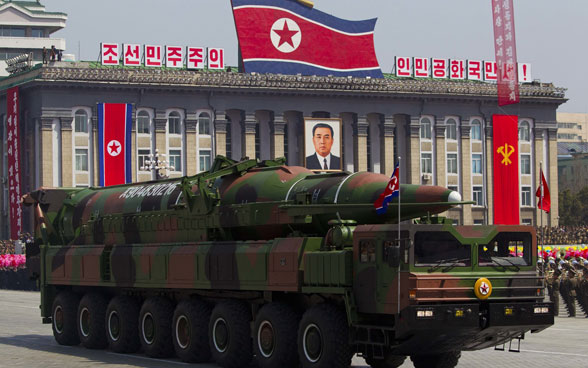
The Panel of Experts is a group of independent experts appointed by the Security Council to monitor the implementation of Council sanctions. The Panel's main task is to investigate and report to the Security Council on the implementation of sanctions. The experts collect and analyze information on potential violations and recommend measures to enforce the sanctions. Through its work, the Panel of Experts contributes to improving the implementation of sanctions.
In New York, Switzerland supported the resolution to extend the Panel of Experts and regrets today's decision by the Council. In its foreign policy, Switzerland actively opposes the proliferation of nuclear weapons and continues to assume responsibility in the UN Security Council as Chair of the Sanctions Committee for the DPRK. In this role, Switzerland is committed to building consensus among Council members and ensuring the proper functioning of the Committee in a context of heightened political tensions. It will continue this commitment after today's Council decision.
Statement by Switzerland after the vote, UN Security Council, 28.03.2024
25.03.2024 – Middle East: UN Security Council calls for immediate ceasefire
On 25 March, the UN Security Council adopted a resolution on the situation in the Middle East. The Council calls for an immediate ceasefire for the remainder of Ramadan, which should lead to a lasting sustainable ceasefire. The resolution was submitted to the Security Council for a vote by Switzerland together with the nine other non-permanent Council members as co-penholders.
After several vetoes, the UN Security Council today adopted, for the first time since 7 October, a resolution clearly calling for an immediate ceasefire in the Middle East. Switzerland, which played a key role in finding a solution between the Council members during the negotiations, welcomes this adoption. In view of the dramatic consequences of the conflict for the civilian population, a clear appeal by the Security Council was essential.
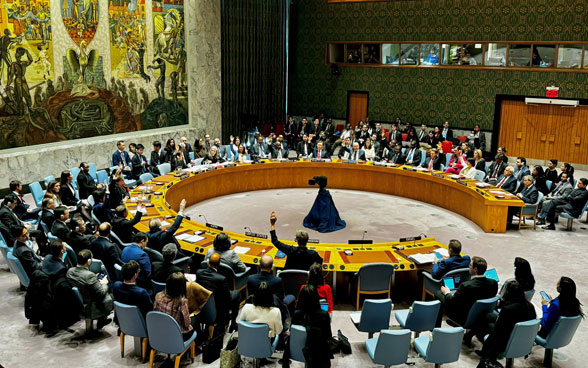
The Council reiterates its demand that all parties comply with their obligations under international law, including international humanitarian law and human rights. The resolution calls for the immediate and unconditional release of all hostages, the protection of the civilian population and humanitarian access. The Council also deplores all acts of terrorism and recalls that the taking of hostages is prohibited under international law.
In its statement after the vote, Switzerland underlined the central importance of this resolution. It responds to the most urgent needs on the ground and must be implemented immediately with a view to a lasting sustainable ceasefire. In New York, Switzerland reiterated its condemnation of Hamas's terrorist acts on 7 October and emphasised that the two-state solution is the only perspective for peace in which Israel and Palestine can live side by side in dignity and security.
Switzerland worked tirelessly with all members of the Council to facilitate the adoption of this resolution. Today's decision by the Council underlines the weight of the non-permanent members of the Council who, despite the blockades, have enabled the Security Council to fulfil its mandate to maintain international peace and security.
22 .03.2024 – Middle East: US resolution fails in the UN Security Council due to a veto
A US-drafted resolution on the situation in the Middle East failed in the UN Security Council today due to a veto by Russia and China. The resolution would have stressed the need for an immediate and lasting ceasefire in Gaza. To that end, the resolution would have supported the ongoing diplomatic negotiations led by the U.S., Qatar and Egypt. Among other things, this resolution demanded that the parties comply with their obligations under international law and called for an increase in humanitarian aid. Switzerland considers it necessary to implement an immediate humanitarian ceasefire. In particular, such a measure should facilitate the release of the hostages and the immediate delivery of humanitarian aid to and within the Gaza Strip. Switzerland supported the resolution in New York and deplores the outcome of the vote. There is an urgent need for the Security Council to call on the parties to respect international humanitarian law and protect the civilian population.
In its statement after the vote, Switzerland stressed that the adoption of this resolution would have sent a clear call to the parties to fully comply with their obligations under international humanitarian law and human rights. The resolution would also have sent a signal to the parties to work towards a durable ceasefire, almost six months after the acts of terrorism by Hamas, which Switzerland condemned. In addition, the resolution would have emphasized the centrality of a two-state solution as the only basis for peace and security in the region.
Statement after the vote on the US resolution, UN Security Council, 22 March 2024
18.03.2024 – Haiti: civilian population suffers from gang violence
The security situation in Haiti is rapidly deteriorating. Criminal gangs control large parts of the capital, Port-au-Prince, and are expanding their influence into other regions of the country. Gang violence, displacement, human rights abuses, kidnappings and sexual violence are on the rise, undermining peace, stability and security in Haiti and the region. The escalation of violence, which recently culminated in the liberation of thousands of prisoners from various prisons, has had a devastating impact on the civilian population. According to the UN, more than five million people in Haiti are at risk of acute hunger.
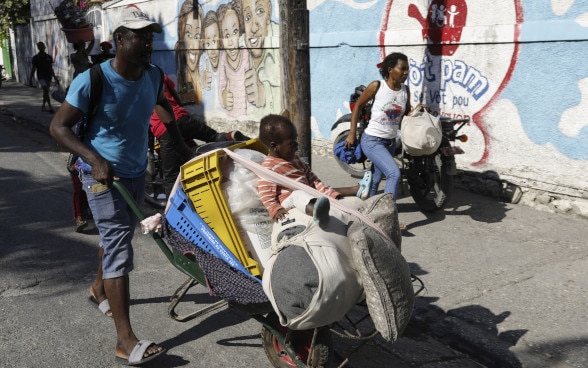
Last October, the UN Security Council authorized the deployment of a multinational security assistance mission to Haiti. While Kenya has agreed to lead the police mission, the deployment has been delayed due to internal political processes. In light of the escalating situation in Haiti, the Security Council recently met three times in two weeks to discuss the crisis. Last week, the Council issued a statement calling on relevant actors to take action. It condemned the violence and called on the armed gangs to immediately cease their destabilizing actions. The Council also expressed its expectation that the Security Council mission would be deployed to Haiti as soon as possible. In addition, the Council emphasized the need to create the security conditions for an inclusive political process and free and fair elections in Haiti. Last week, it was announced that a Presidential Council and an interim Prime Minister would replace the resigned Prime Minister Ariel Henry. The UN Security Council met again today for closed consultations. Switzerland is committed to ensuring that the Council continues to support Haiti in its efforts to achieve peace, stability and security. On the ground, Swiss development cooperation continues to support the Haitian people.
15.03.2024 – The UN Security Council extends the UN mission in Afghanistan
The UN Security Council has unanimously extended the mandate of the UN Assistance Mission in Afghanistan (UNAMA) for another year. Afghanistan faces a number of complex crises affecting the economy and human rights, particularly women's rights. In addition, the effects of climate change pose a serious challenge to the country. Increasing competition for water has the potential to exacerbate conflict, instability and insecurity beyond Afghanistan's borders. The country also suffers from a severe humanitarian crisis. Nearly 20 million people are in need of humanitarian assistance.
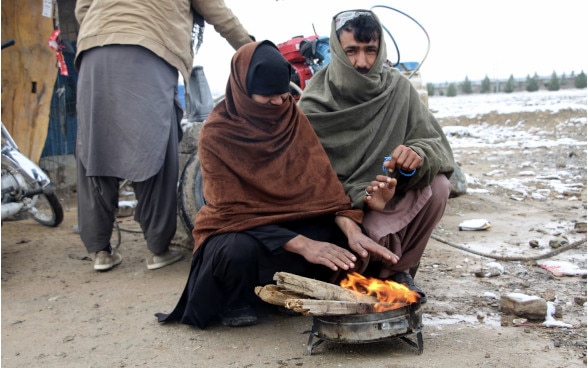
Switzerland supports the resolution in the Council and welcomes its adoption today. UNAMA plays an important role for the civilian population in Afghanistan. UNAMA provides humanitarian assistance in Afghanistan, promotes human rights, protects children affected by armed conflict and supports gender equality. The mission is also mandated to promote development and governance in Afghanistan, particularly the rule of law. These are all issues that play a central role in Swiss foreign policy. On the ground, Switzerland works with partner organizations such as the UN, the ICRC and NGOs to reduce human suffering.
12.03.2024 – Women play a key role in achieving peace and security
On the fringes of the 68th session of the UN Commission on the Status of Women (CSW), President Amherd took part in an informal Arria formula meeting of the UN Security Council in on "Women, Peace and Security". Switzerland organized the meeting. "For Switzerland, there is no doubt: peace is inseparable from gender equality and women's rights," the President of the Confederation emphasized in New York. Their participation in peace processes, conflict prevention and post-conflict reconstruction is essential.
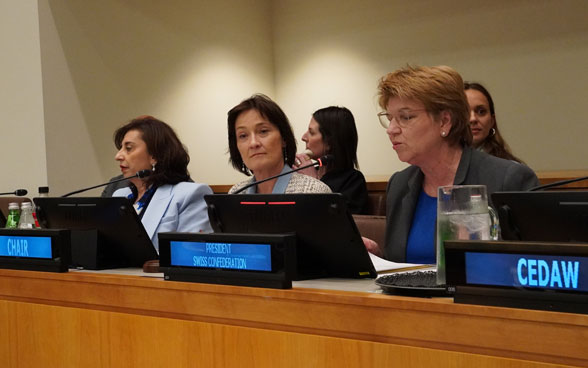
Within the framework of its priority "Promoting sustainable peace", Switzerland pursues the goal of strengthening the equal participation of women in international peace and security efforts. Given the current global political situation, this is no easy task. The UN Convention on the Elimination of All Forms of Discrimination against Women (CEDAW) is today the most important normative framework for the rights of women and girls worldwide. "It must be respected and implemented, especially in the context of our discussions in the Security Council," the President emphasized. Another instrument is UN Security Council Resolution 1325 and the nine successive resolutions on "Women, Peace and Security". Switzerland was one of the first countries to adopt a national action plan to implement these resolutions. In order to guarantee the rights of women and girls at all times, in times of peace as well as in times of conflict, Viola Amherd requested at today's Council meeting that the synergies between CEDAW and the "Women, Peace and Security" agenda be strengthened. In this way, Switzerland would also like to strengthen the links between Geneva, the seat of the UN human rights organizations, and New York, the seat of the Security Council.
11.03.2024 – Middle East: Sexual violence is a serious violation of international humanitarian law
At its meeting today, the UN Security Council discussed the report of the UN Special Representative on Sexual Violence in Conflict, Pramila Patten, released on March 4, following her visit to Israel and the Occupied Palestinian Territory. According to the report, there is reason to believe that women and girls were raped and tortured in various locations during the terrorist attacks coordinated by Hamas and other armed groups on October 7. In New York, Switzerland reiterated its condemnation of the terrorist acts and reiterated its condemnation of all sexual violence in conflicts. In addition, the Patten report assumes that the hostages still being held are being subjected to sexual violence. In New York, Switzerland also reiterated its call for their immediate and unconditional release.
Sexual violence in conflict situations is a serious violation of international humanitarian law and human rights. "It is therefore imperative that the Security Council unanimously condemns all conflict-related sexual violence in the context of the Middle East conflict, as in all armed conflicts, and takes action to prevent its recurrence," said Riccarda Chanda, Deputy Permanent Representative of Switzerland to the UN, at the Security Council meeting. She also emphasized that those responsible must be identified and held accountable. The relevant UN bodies must be guaranteed appropriate access. Switzerland drew attention to the ongoing investigations by the International Criminal Court. These are looking into all violations of international law in Israel and the Occupied Palestinian Territory since October 7.
Switzerland also expressed its deep concern at the information contained in the report on forms of sexual and gender-based violence against Palestinian men and women in detention centers, during house searches and at checkpoints. It condemned the fact that the hostilities in Gaza continue to cause numerous civilian casualties, including nearly 9,000 women. According to the UN, 95% of mothers do not have enough to eat. During today's Council meeting, Switzerland reiterated the need for an immediate humanitarian ceasefire in Gaza to release hostages, allow humanitarian access and protect civilians. "The Security Council must at all costs put an end to the current spiral of violence in the Middle East and relaunch a process of dialogue with a view to finding a political solution to this conflict, in which women play a key role," said the Swiss representative in New York.
11.03.2024 – Good working methods are central to the functioning of the UN Security Council
The UN Security Council today discussed its working methods in an annual open debate. The aim of the meeting, which was held at the initiative of the Japanese presidency, was to exchange views on the Council's accountability, transparency and effectiveness in order to better fulfill its mandate to maintain peace and security in the world. This issue is central to Switzerland's priority of "strengthening the effectiveness of the Security Council". The non-permanent members of the Council (Elected Ten, E10) – including Switzerland - issued a joint statement during the debate.
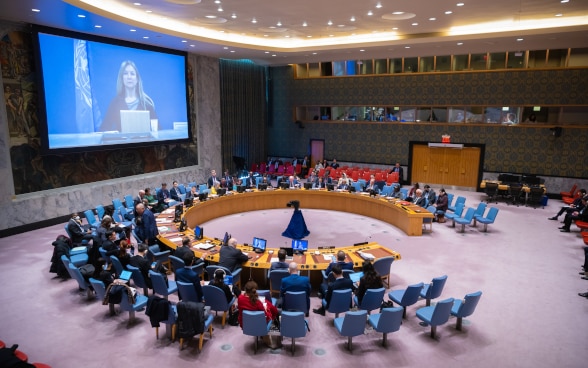
In New York, the E10 emphasized their determination to work to ensure that the Council can effectively fulfill its mandate, especially in these challenging times. In their statement, the E10 emphasized the need to strengthen the Council's cooperation with other UN bodies, such as the General Assembly. The equal participation of women and the integration of a gender perspective in all working methods was also emphasized. Civil society perspectives should also be taken into account. The E10 also emphasized the importance of targeted sanctions as an important tool of the Council. The E10 also expressed concern about the frequent use of the veto, which has prevented the adoption of important resolutions in recent months. This can limit confidence in the Security Council. In line with the Code of Conduct of the Accountability, Coherence and Transparency Group (ACT Group), they called for restraint in the use of the veto, particularly in cases requiring action to prevent and stop mass atrocities.
As part of the open debate, Switzerland also contributed to a statement by the ACT Group, which is coordinated by Switzerland and works for a transparent, effective, efficient and inclusive UN Security Council.
E10 Statement on the Working Methods of the UN Security Council, 11.03.2024
07.03.2024 – Sudan: UN Security Council Resolution calls for a ceasefire
Sudan is the scene of one of the worst humanitarian disasters of our time. As a result of the escalation of the conflict in April 2023 between the Sudanese Armed Forces (SAF) and the Rapid Support Forces (RSF), almost 25 million people are dependent on humanitarian aid, according to UN figures. Everything is lacking, particularly food, water, shelter and medical care.
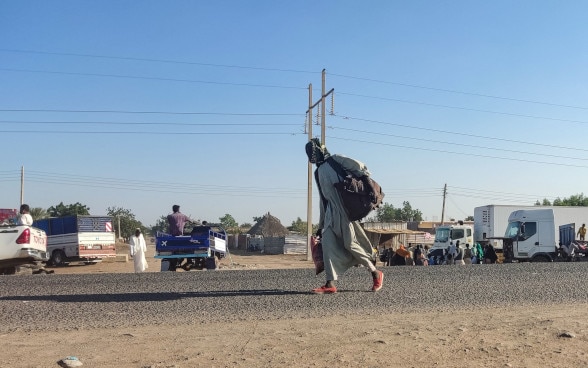
Against this backdrop, the UN Security Council has adopted a resolution calling for a cessation of hostilities during the month of Ramadan, which begins on 10 March. The Council also calls on the parties to the conflict to endeavour to find a sustainable solution to the conflict, to strictly adhere to international humanitarian law and to allow safe, rapid and unhindered access for humanitarian aid.
Switzerland supported the resolution in New York because it reflects three different priority aspects. These include the protection of the civilian population, the improvement of the humanitarian situation and the search for a political solution to the conflict. In the Security Council, Switzerland emphasised its deep concerned regarding reports of serious violations of international humanitarian law and human rights law. This also includes sexual and ethnic-based violence. «We reiterate our urgent call on the SAF and the RSF to immediately cease hostilities, to respect their obligations under international law and to protect civilians», said Swiss Ambassador to the UN Pascale Baeriswyl at a Security Council briefing on the situation in Sudan on 7 March.
Switzerland welcomed the announcement made by the Sudanese authorities on 5 March, which reversed the decision taken in February to suspend cross-border humanitarian aid from Chad. This decision also opens up further border crossings and selected airports for humanitarian aid. In the Council yesterday, Switzerland called for this announcement to be implemented swiftly: «Cross-border delivery remains essential to reach more people. We continue to call on the parties to allow and facilitate safe, rapid and unhindered humanitarian access across borders and frontlines». Finally, Switzerland emphasised the need for a lasting negotiated solution to the conflict. It called on the parties to the conflict to return immediately to negotiations on a ceasefire and to a credible and inclusive political dialogue. Against this backdrop, Switzerland welcomes today's adoption of the resolution.
Statement by Switzerland on the situation in Sudan, UN Security Council, 07.03.2024
27.02.2024 – Middle East: Acute food insecurity in Gaza
The worsening food crisis facing the population of the Gaza Strip was at the focus of a UN Security Council meeting today. The meeting was convened at the request of Switzerland and Guyana in their roles as the Council’s co-focal points on "Hunger and Conflict". According to information from the UN Humanitarian Office (OCHA), the level of food insecurity and the associated risk of famine in the Gaza Strip is alarming. The escalation of hostilities in the Middle East since October 7 is the main cause of this acute need. The fighting is negatively impacting Gaza’s water supply, agriculture and food. The situation was already worrying due to the poverty that has prevailed since the closure of the Gaza Strip in 2008, which restricted movement and access. According to OCHA, one in four people in Gaza is now severly malnourished – more than half a million people. Children, pregnant and breastfeeding women, people with disabilities, and the elderly are at a particularly high risk of death.
The dramatic situation is exacerbated by the severe restrictions on the transport of food into and within the Gaza Strip. In the Security Council, Switzerland reminded Israel to implement the measures ordered by the International Court of Justice on February 26, 2024. Among other things, the Court requires Israel to ensure the provision of urgently needed basic services to the Palestinian population and to facilitate the rapid and unhindered humanitarian aid. Against this background, Switzerland called on all parties to the conflict to comply with international humanitarian law, including the prohibition of the use of starvation as a method of warfare, and to protect the civilian population.
"We, the members of this Council, must use our influence and take measures to prevent famine and save lives," emphasized Switzerland's representative to the Security Council. An immediate humanitarian ceasefire is urgently needed. In Resolution 2417 of 2018, the UN Security Council strongly condemned the starvation of civilians and the unlawful denial of humanitarian access as a tactic of war. Switzerland stated in the Council that it remains ready to work with all members of the Council to find a political solution that ends the suffering of the people and restores the prospect of peace.
23.02.2024 – "Our goal is peace"
Federal Councillor Ignazio Cassis took part in a high-level debate at the UN Security Council centred on the second anniversary of the war in Ukraine. The head of the FDFA reminded the Council of the pursuit of peace as a declared founding goal of the United Nations in the UN Charter and emphasised that this goal is the raison d'être of the organisation. "We bear responsibility for this ideal, which was adopted here three quarters of a century ago," emphasised the head of the FDFA in New York.
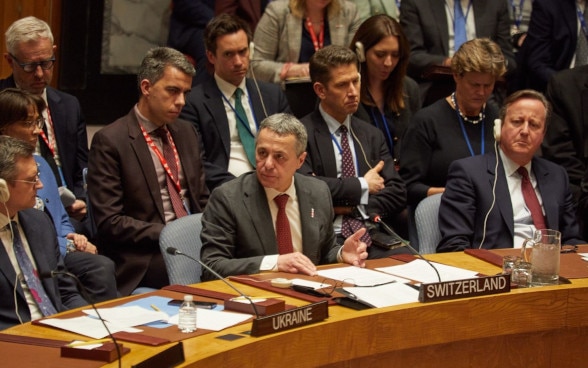
Since the beginning of the war, the Security Council has been unable to fulfil its responsibility to ensure peace and security for Ukraine and its people. Thousands of people have lost their lives, millions have been displaced and the human suffering is immense. Against this backdrop, Mr Cassis asked what the international community can do to ensure that the principles of the UN Charter, the Geneva Conventions and international humanitarian law are upheld in Ukraine and elsewhere in the world. "We must not fall into pessimism," explained Federal Councillor Cassis.
The path to peace in Ukraine must be travelled together. And the first step on this path is the organisation of the first international conference in Switzerland on peace in Ukraine. "We are working tirelessly to try and set in motion a new dynamic, a pragmatic and inclusive process," emphasised the head of the FDFA in the Security Council. Federal Councillor Cassis has organised various outreach activities at different levels over the past month to ensure that such a process can be successfully launched. "Switzerland, with its tradition of good offices, is convinced that we must listen to everyone," emphasised Ignazio Cassis. The prerequisite for a successful peace process is broad representation that includes all regions of the world.
20.02.2024 – Middle East: Resolution for a humanitarian ceasefire fails in the UN Security Council
The UN Security Council today voted on a resolution calling for an immediate humanitarian ceasefire in the Middle East. The draft resolution, which was presented by Algeria, failed due to a veto by the USA. The catastrophic humanitarian situation for over 2 million people in Gaza continues to worsen: hunger is rampant, the health sector is in ruins and a large part of the population has already been internally displaced several times. There is a lack of everything, especially humanitarian access. In addition, Israel's impending military ground offensive in Rafah in the south of the Gaza Strip poses a serious threat to over 1 million people. Numerous hostages are being held and their medical care is not guaranteed.
To counter these developments, in addition to an immediate ceasefire, the resolution would have called for the immediate and unconditional release of all hostages, full compliance with international humanitarian law by all parties, rapid, safe and unhindered humanitarian access to the civilian population in need and rejected any forced displacement of the Palestinian population. By adopting the resolution, the Security Council would also have recalled the precautionary measures taken by the International Court of Justice on January 26, 2024 to prevent genocide in the Middle East and reiterated its call for a two-state solution. Finally, the failed draft resolution also expressed grave concern about the threat of further escalation in the wider region as a result of the violence in Gaza.
Switzerland supported the resolution and regretted the outcome of the vote. In its explanation of vote, it reiterated its position on the current escalation in the Middle East and emphasized that the call for an immediate humanitarian ceasefire in Gaza is in line with the Security Council's collective commitment to respect and ensure respect for the Geneva Conventions and international humanitarian law in all circumstances. "We cannot allow hundreds of thousands of besieged civilians to be left to starvation and epidemics without adequate security guarantees, whether for the provision of humanitarian assistance or for their own protection," Switzerland said.
During the negotiations on the draft resolution, Switzerland played a key role in ensuring that the demand for the immediate and unconditional release of all hostages, compliance with international law and the protection of the civilian population were enshrined in the text of the resolution. Switzerland calls on the parties to the conflict to immediately implement the UN Security Council resolutions adopted in December and November 2023 on the situation on the ground. The immediate release of the hostages, a humanitarian ceasefire, unhindered access for humanitarian aid to Gaza and full compliance with international humanitarian law and human rights by all parties are urgent. On this basis, work must be done towards a political dialog with the goal of a two-state solution.
Swiss Statement after the vote, United Nations Security Council, 20.02.2024
13.02.2024 – Prevention is key to mitigating climate risks in conflict zones
The UN Security Council held an open debate, chaired by Guyana, on the link between climate change, food insecurity and armed conflict. "Addressing climate security" is one of the four thematic priorities defined by the Federal Council for Switzerland's membership of the Security Council. Switzerland, represented by Ambassador Alexandra Baumann, Head of the FDFA's Prosperity and Sustainability Division (PSD), emphasized the need for prevention in New York. "Conflict is the main cause of hunger, and climate change further destabilizes the situation," she emphasized. Acute food insecurity in the world has increased massively over the past decade. Despite the targets set by the 2030 Agenda, almost 800 million people still face chronic hunger.
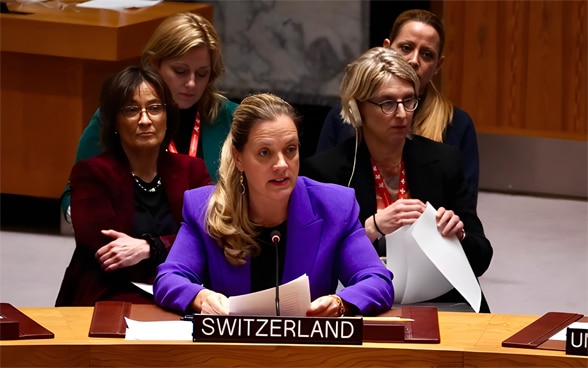
At the Security Council, Switzerland presented solutions aimed in particular at preventing climate-related risks and reducing tensions. In recent years, early warning systems have been developed for food insecurity, conflicts and extreme climatic events. At present, these systems mostly operate separately. It is essential that they be linked to avoid blind spots in conflict prevention. The resulting data must then be used for targeted, preventive action. In this way, for example, the creation of sustainable food systems can be ensured in the long term. Switzerland is also committed to this at the bilateral level within the framework of its international cooperation.
For this to succeed, coordinated cooperation between environmental, peace and humanitarian actors is necessary. In addition to the UN Security Council, these include the entire UN system, regional organizations such as the African Union, local institutions, as well as the scientific community and the private sector. Switzerland actively promotes dialogue between these actors and recently organized dialogues in Addis Ababa on the impact of climate change and conflict on food security.
The result of the vicious circle of conflict, food insecurity and the consequences of climate change is the same in many conflict zones around the world: more instability, more insecurity and more suffering among civilians. "In order to find context-specific responses, the Council must take into account the impact of climate change on peace and security," emphasized Alexandra Baumann in New York. Switzerland will continue to address the security and peace policy implications of climate change in the Security Council, identify possible solutions and contribute to building consensus among Council members.
Statement by Switzerland on climate change and food security, UN Security Council, 13.02.2024
News article: Why the consequences of climate change can exacerbate conflicts
09.02.2024 – UN Security Council visits Colombia to support peace process
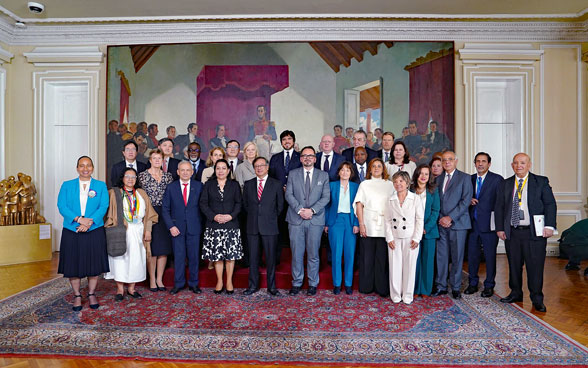
From February 7 to 11, Switzerland, together with Guyana and the United Kingdom, will leada visit to Colombia by the 15 members of the UN Security Council. The aim of the Council is to gain an insight into the situation in the country, the implementation of the 2016 agreement and to support the establishment of a lasting peace. Switzerland remains strongly committed to the peace process in Colombia.
Article: UN Security Council visits Colombia to support peace process
05.02.2024 – Risk of further regional escalation: Switzerland calls for restraint
At an emergency meeting requested by Russia, the UN Security Council discussed the air strikes carried out by the United States in Syria and Iraq following the attack on a US base in Jordan. At the Council, Switzerland expressed its concern about the regional escalation, which has steadily increased since the terrorist attacks by Hamas on October 7 and the war in Gaza, and has reached a dangerous point in the last ten days. "There is a real threat to international peace and security in the region," emphasized Switzerland's deputy ambassador to the UN, Adrian Hauri, in New York.
Switzerland called on the parties to the conflict and all actors with influence to exercise maximum restraint in order to avoid further escalation in the region. "A single miscalculation can have devastating consequences," the Swiss representative told the Council. Switzerland recalled that any military action must be in accordance with international law and called on all parties to ensure respect for international humanitarian law and human rights. Only political solutions can ultimately guarantee peace and security in the region. In particular, a humanitarian ceasefire is needed in Gaza. With regard to Syria, Switzerland stated in the Council that UN Security Council Resolution 2254 calls for a ceasefire at the national level.
Statement by Switzerland on the situation in Syria and Iraq, UN Security Council, 05.02.2024
31.01.2024 – Middle East: Measures of the International Court of Justice are binding on both parties
The UN Security Council today once again discussed the current situation in the Middle East. Switzerland reiterated its position and called in particular for international humanitarian law to be respected. In view of the catastrophic humanitarian situation in Gaza, a humanitarian ceasefire is urgently needed to allow humanitarian access and the release of all hostages. Switzerland underlined its unwavering support for the International Court of Justice and recalled that the precautionary measures of January 26 are binding on both parties. It expects Israel to comply with the Court's order and to take the necessary measures to prevent the commission of acts of genocide and incitement to genocide. This requires immediate and effective measures, including the provision of basic services and humanitarian assistance.
In New York, Switzerland also expressed its concern about the serious allegations against UNRWA staff suspected of involvement in the terrorist acts of October 7. Switzerland has a policy of zero tolerance towards any support for terrorism and incitement to hatred or violence. Switzerland has taken note of the immediate measures taken by UNRWA against the employees and expects that the internal investigation will fully clarify the allegations.
Finally, Switzerland warned against a regionalization of the conflict and reiterated that respect for international law, a humanitarian ceasefire, access for aid to Gaza and the release of hostages are only the first steps towards a lasting political solution to the conflict, which must be based on a two-state solution.
Statement by Switzerland on the situation in the Middle East, UN Security Council, 31.01.2024
30.01.2024 – Stability and security in Cyprus: UN peacekeeping mission renewed for one year
The UN Security Council today unanimously renewed the mandate of the UN peacekeeping mission in Cyprus (UNFICYP) by resolution. UNFICYP has been stationed on the Mediterranean island for 60 years and makes an important contribution to stability on site and in Europe.
In 1964, the UN Security Council deployed the peacekeeping mission following the outbreak of violence between the Turkish Cypriot and Greek Cypriot communities. This makes it one of the oldest UN peacekeeping missions still in operation. Although a ceasefire was signed between the parties to the conflict, the country has remained divided since Turkish troops invaded the north of the island in 1974. In light of this, UNFICYP maintains a buffer zone between the troops of both parties.
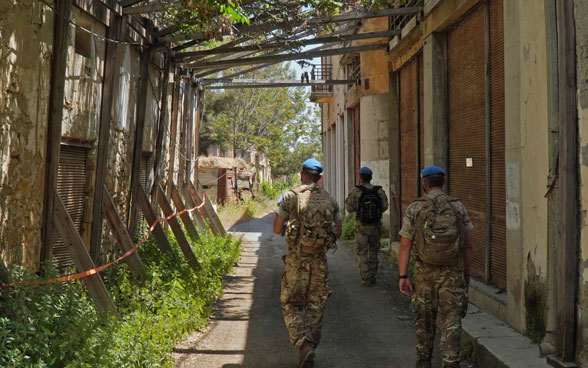
By adopting the resolution, the UN Security Council also welcomes the appointment of Maria Angela Holguin Cuellar as the UN Secretary-General's personal envoy to Cyprus. This is an important step in the search for common ground with the aim of returning to formal negotiations and revitalising a possible negotiation process. Switzerland supports the envoy and the good offices of the UN Secretary-General.
In the Council, Switzerland voted in favour of renewing the UN peacekeeping mission and considers a political solution acceptable to both sides to be key. It supports a federalist solution based on two zones for both communities with equal political rights in accordance with Security Council resolutions. In order to achieve such a solution, trust and dialogue between the parties must be strengthened. For this reason, Switzerland is involved at bilateral level in the Committee for Missing Persons in Cyprus, which is made up of Greek-Cypriots and Turkish-Cypriots. Switzerland also continues offering itself as a host for talks. For example, the UN has maintained political dialogue at Bürgenstock (2004), Mont Pèlerin (2016) and Crans-Montana (2017).
23.01.2024 – UN Security Council: Federal Councillor Cassis stresses the need for a comprehensive solution
On January 23, Federal Councillor Ignazio Cassis took part in a ministerial debate on the Middle East at the UN Security Council. Under the French Presidency, the aim of the debate was to contribute to concrete progress towards a political solution to the crisis in the Middle East. The Head of the FDFA presented to the Council an analysis of the situation and presented his views on a solution to the conflict and a lasting peace in the region.
Federal Councillor Cassis yesterday reiterated the Federal Council's position on the Middle East conflict during a high-level debate at the UN Security Council. He condemned the terrorist attacks by Hamas against Israel and called for the immediate and unconditional release of all hostages held by Hamas. The head of the FDFA also drew attention to the precarious humanitarian situation in Gaza: "Since October 7, there seems to be no limit to the violence in Israel, in Gaza and throughout the occupied Palestinian territory.
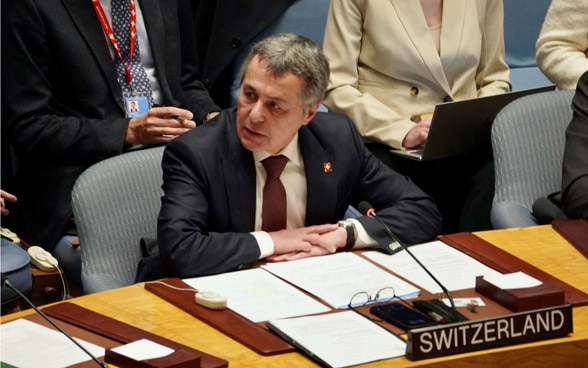
In New York, the head of the FDFA also spoke of the UN Security Council's involvement in the Middle East conflict. The Council has recently adopted important resolutions that are very difficult to implement. Only some of the hostages have been released, civilians are the daily victims of the fighting, and international humanitarian law continues to be violated. "We cannot give in to frustration. We must not be discouraged," Ignazio Cassis told the Security Council. He stressed the need for a comprehensive approach to the solution, involving in particular the States of the region. Without a regional political consensus, there can be no lasting peace in the Middle East," said the head of the FDFA. At the diplomatic level, recent years have shown that there is room for political agreement and common interests between Israel and the states of the region. This space must be used to work towards a lasting peace, which requires a two-state solution. "This is the only solution that offers both Israelis and Palestinians the prospect of living in peace and security," Mr. Cassis emphasized.
The head of the FDFA called on the parties to the conflict, the states in the region and the members of the Security Council to act in order to lay the foundations for a lasting cessation of hostilities and a political solution to the crisis. This requires the immediate release of the hostages, a humanitarian ceasefire, unhindered access for humanitarian aid to Gaza, and full respect for international humanitarian law. Switzerland is ready to support these efforts in cooperation with Israel, the Palestinian Authority and the states of the region.
12.01.2024 – Emergency meeting on the situation in the Red Sea
Following further attacks by the Yemeni Houthis on merchant ships in the Red Sea in recent days and the subsequent military strikes by the United States and the United Kingdom, the UN Security Council met today for an emergency meeting. In the Security Council, Switzerland emphasised that these recent developments were worrying and increased the risk of a regional escalation.
Two days ago, the Security Council adopted a resolution calling for greater maritime security and strict compliance with rights and freedoms of navigation in accordance with international law. Switzerland supported the resolution because it expresses the Council's concern about the situation in the region and calls on the Houthis to immediately cease their attacks on ships in the Red Sea.
Today in New York, Switzerland emphasised its legal assessment of the resolution – just as it did after the vote on 10 January: The right to take military action mentioned in the relevant article of the resolution is limited to intercepting attacks on merchant vessels and warships. This therefore only refers to the protection of a ship under attack and its crew. In this context, any military operation that goes beyond the immediate need to protect vessels and persons would be disproportionate and not covered by the resolution.
Switzerland is concerned about the military strikes carried out by the British-American coalition. The incidents in the Red Sea are already having a negative impact on maritime traffic and international trade. However, the precarious situation of the civilian population in Yemen and the region, which is dependent on vital humanitarian aid by sea, could also be further exacerbated if hostilities continue. In view of this, Switzerland called on all parties and actors in the Red Sea and the surrounding region in the Security Council to exercise caution and restraint and to strictly adhere to international law. This with the aim of avoiding a regional escalation. In the long term, only a lasting peace in Yemen that includes all the actors involved will guarantee security in the Red Sea.
Statement by Switzerland on the situation in the Red Sea, UN Security Council, 12.01.2024
12.01.2024 – Middle East: Switzerland calls for full implementation of UN Security Council resolutions
At an emergency meeting today, the UN Security Council once again discussed the situation in the Middle East, in particular the forced displacement of the Palestinian population. Switzerland expressed its concern about the steady increase in violence and the suffering of the civilian population. In light of the dire humanitarian situation in the Gaza Strip, it called for the facilitation of humanitarian access to the Gaza Strip and the release of the hostages remaining there. To this end, Switzerland emphasized the need for a lasting humanitarian ceasefire. In the Security Council, Switzerland reiterated its condemnation of the terrorist attacks by Hamas on October 7, in particular the sexual violence against women and girls.
In order to alleviate the suffering of civilians, it is essential that the two resolutions on the Middle East adopted by the Security Council in November and December be fully implemented. In particular, the resolutions call for an increase in humanitarian assistance to the Gaza Strip by ensuring rapid, safe and unhindered access in accordance with international humanitarian law. There is a serious risk of famine, which already affects about half a million people in Gaza.
Switzerland also emphasized in New York that the Geneva Conventions prohibit the forcible transfer of populations and that such transfer can constitute a war crime. It rejects calls for the expulsion of civilians from the Occupied Palestinian Territory, including Gaza, and calls on the leadership of all parties to refrain from provocative statements. Furthermore, all violations of international law committed in Israel and throughout the Occupied Palestinian Territory must be investigated and the perpetrators brought to justice. To this end, the International Criminal Court (ICC) is currently conducting an investigation into the situation in the Occupied Palestinian Territory, covering both the events of October 7 and the ongoing events in Gaza and the West Bank.
The search for a political solution is urgent. In this context, Switzerland continues to support the two-state solution, so that Gaza can be rebuilt as part of a future Palestinian state, living side by side with Israel in peace and within secure and recognized borders.
Statement by Switzerland on the situation in the Middle East, UN Security Council, 12.01.2024
11.01.2024 – UNOWAS: Prevention as a tool for peace and security in West Africa and the Sahel
The work of the UN Regional Office for West Africa and the Sahel (UNOWAS) was the focus of a UN Security Council meeting today. UNOWAS is active in 16 countries where millions of people face multiple and complex challenges that jeopardize security in the region. At the end of January 2023, the Security Council extended the mandate of UNOWAS for another three years, under the leadership of Switzerland and Ghana. Despite some positive trends in the strengthening of democratic governance in some countries, the security situation in much of the region remains fragile and the need for humanitarian assistance is increasing. At today's Council meeting, Switzerland emphasized that prevention is crucial to avoid new conflicts and the escalation of existing ones.
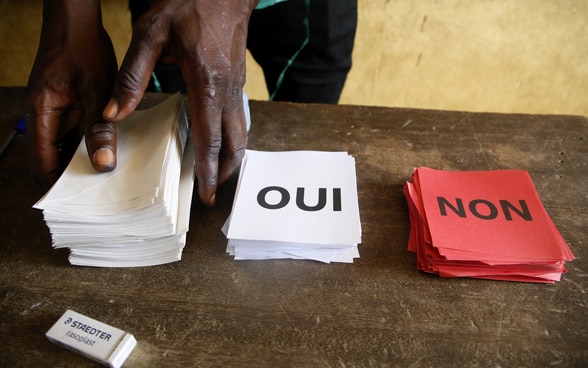
In the Council, Switzerland expressed its satisfaction with the improvements in the area of democratic governance. Several elections in the region were largely peaceful last year. Among other things, Switzerland supported the National Peace Committee in Nigeria to reduce violence before and during the elections.
Switzerland also welcomed the fact that UNOWAS will support Ghana, Mauritania, Senegal and Togo in organizing elections. In addition, Switzerland emphasized the need to continue promoting and implementing legislation that strengthens the role of women in political processes, thereby contributing to the development and consolidation of political institutions, electoral processes and democratic governance throughout the region.
The security situation for the civilian population in some regions of the Sahel remains a concern due to attacks by armed groups. In New York, Switzerland stated that developments, in particular after the withdrawal of the UN peacekeeping mission MINUSMA from Mali at the end of 2023, must be closely monitored. In this context, it emphasized the need to strengthen the work of UN Member States at the bilateral and multilateral level to mitigate the risk of a serious regional crisis. This should be done, in particular in close cooperation with the African Union and subregional organizations.
Strengthening humanitarian action to prevent and mitigate major humanitarian crises caused by conflict, instability, internal displacement and the consequences of climate change is another important factor for the protection of the populations. Some 26 million people in the Sahel region are currently in need of life-saving humanitarian aid. Against this backdrop, Switzerland emphasized that addressing climate risks into account is key to effective conflict prevention in West Africa and the Sahel. The effects of climate change, such as floods and droughts, have far-reaching consequences for security in the region. In the Council, Switzerland emphasized that the continuous analysis of climate risks and a better understanding of the linkages between climate, peace and security remain important in order to support the affected countries in adapting to the effects of climate change. Switzerland also read out a statement on behalf of several countries to draw attention to the negative impact of climate change on peace and security.
Joint Statement on Climate Security, UN Security Council, 11.01.2024
10.01.2024 – UN Security Council calls for more security for ships in the Red Sea
The UN Security Council today adopted a resolution condemning the attacks by Yemen's Houthis on merchant ships in the Red Sea. In the resolution, the Council calls on the Houthis to immediately cease their attacks, which are hampering global trade and jeopardising security in the region. Switzerland supported the resolution.
On 19 November 2023, the Houthis captured the cargo ship "Galaxy Leader" on its way from Turkey to India, took control of the crew and diverted the ship to the Yemeni province of Hodeida. The Security Council resolution adopted today calls for the immediate release of the crew and the ship.

With the resolution, the Security Council emphasises that the shipping rights and freedoms of merchant ships must be respected in accordance with international law. The Council also calls for caution and restraint in order to avoid further escalation in the Red Sea and the broader region.
Statement by Switzerland after the vote, UN Security Council, 10.01.2024
29.12.2023 – Switzerland emphasises the need for a lasting political solution in the Middle East
At the request of the United Arab Emirates, an emergency meeting was held at the UN Security Council on Friday 29 December to discuss the current situation in the Middle East. The continuation of hostilities in Gaza and the increase in violence in the West Bank are worrying and reinforce the threat of a regional extension of the conflict. These developments compromise the political prospect of implementing a two-state solution, as supported by Switzerland.
In view of the latest developments, Switzerland has once again stressed that respect for international humanitarian law and human rights, the protection of civilians and the release of hostages must remain a priority for the Security Council. Switzerland also stressed the need for a lasting political solution in the Middle East.
On behalf of Switzerland and Brazil, as informal focal points on conflict and hunger within the Security Council, a statement was also made on the acute food insecurity in the Gaza Strip, which affects more than 90% of the population.
Statement by Switzerland to the UN Security Council, 29.12.2023
22.12.2023 – Middle East: UN Security Council adopts resolution in favor of increasing humanitarian aid to the Gaza Strip
In light of the dramatically deteriorating situation in the Gaza Strip, the UN Security Council today adopted a resolution aimed at increasing humanitarian aid to the Gaza Strip. The resolution addresses the urgent humanitarian needs of the civilian population, deplores all attacks against civilians, including terrorist acts, including those carried out by Hamas since 7 October, and calls for
- Compliance with international humanitarian law by all parties to the conflict.
- Rapid and unhindered access to facilitate the delivery of humanitarian aid on a sufficient scale, including through a UN Humanitarian Mechanism and the opening of various border crossings.
- The immediate and unconditional release of all remaining hostages.
- Protection of civilians by both parties to the conflict.
- The need for a two-state solution.
- The need to create the conditions for a lasting cessation of hostilities.
Switzerland supported the resolution submitted to the Council by the United Arab Emirates because it contributes to alleviating the catastrophic humanitarian situation in the Gaza Strip and because it incorporates various aspects of Switzerland's position on the current conflict. These include compliance with international humanitarian law by all parties to the conflict, the release of all hostages, the guarantee of safe and unhindered humanitarian access to Gaza, and the need for a two-state solution.
With a view to facilitating rapid and unhindered humanitarian access, the resolution adopted today underlines the urgent need to consider steps to create the conditions for a durable cessation of hostilities. This is without prejudice to Israel's right to ensure its defense and security, but would facilitate humanitarian access and allow for the immediate and unconditional release of all hostages. In its statement after the vote, Switzerland welcomed the Council's decision and emphasized that today's resolution must be complementary to international humanitarian law, according to which all parties to the conflict and other states are obliged to allow and facilitate aid to the suffering population.
Statement by Switzerland after the vote, UN Security Council, 22.12.2023
21.12.2023 – Switzerland supports sustainable financing of African Union peace support operations
On 21 December 2023, the UN Security Council voted in favour of sustainable funding for African Union (AU) peace support operations. Switzerland supported the resolution presented by the three African countries on the Security Council, Gabon, Ghana and Mozambique.
The peace operations led by the African Union are essential for managing security challenges on the African continent. Over the past 20 years, AU-led peace operations have provided responses to complex situations, such as illegitimate seizures of power in several countries, monitoring elections or observing ceasefire agreements. This illustrates the key role that regional players can play in meeting the continent's security challenges. AU-led peace operations are generally better rooted locally, have more detailed knowledge of the context, and are more willing to take risks in the face of complex threats.
However, due to limited resources, the AU cannot consistently utilise its strengths to support peace efforts across the continent. In particular, the AU needs stable resources and sustainable funding. On 21 December, the Security Council adopted a resolution to this effect, initiated by Gabon, Ghana and Mozambique. From the outset of the discussions, Switzerland actively supported this resolution, as it ensured predictable, sustainable and flexible UN funding for AU-led peace support operations.
Impetus under the Swiss presidency
Under Switzerland's presidency, the Security Council had already addressed the issue of funding for African Union-led peace support operations in May 2023.
In 2018, Switzerland had already co-sponsored a draft Security Council resolution tabled by these three African states, considering the funding of AU peace support operations to be crucial for the credibility of the UN system. The draft resolution was not adopted in 2018. The Security Council resolution adopted on 21 December is primarily aimed at finding "African solutions to African challenges". This focus on African solutions promotes sustainable responses to the continent's challenges. This commitment to sustainable solutions is why Switzerland has long supported the regional anchoring of peace operations, not only in Africa but also in other parts of the world, including Europe through the OSCE. The resolution offers the AU and the UN a clear framework for future AU-led peace mission deployments under Security Council mandates. This framework will facilitate financial planning for such missions. The Security Council and the UN General Assembly committee responsible for financial matters will in future still be required to approve funding on a case-by-case basis. Switzerland recognises and welcomes the progress made by the African Union since 2018 to establish a normative framework for peace support operations.
Respect for international humanitarian law and human rights
The Security Council resolution of 21 December, which was adopted unanimously, highlighted the need for all security forces to respect international humanitarian law and human rights. Compliance with international humanitarian law and human rights is an important condition for UN funding. This is a UN human rights due diligence requirement. "Switzerland was keen to lend its support and play a constructive role in the negotiation process in order to facilitate consensus between the various positions," said Pascale Baeriswyl. She also called on all parties to do their utmost to contribute to the implementation of this framework resolution. "In particular, we appeal to everyone's willingness to find compromises for future negotiations on a case-by-case basis. This is a decisive step for the future of African Union-led peace support operations to promote peace and security on the continent", she concluded.
Swiss statement following the vote, UN Security Council, 21 December 2023
21.12.2023 – UN Security Council extends the mandate of the UN observer force for the Golan Heights
The UN Security Council today unanimously extended the mandate of the United Nations Observer Force (UNDOF) in the Golan Heights – a mountain range on the border between Syria and Israel – for six months. The Security Council first mandated the UNDOF in May 1974, making it one of the longest running UN missions. UNDOF’s deployment dates back to the "Yom Kippur War" between Israel and Syria, which broke out in October 1973 and was fought in part on the Golan Heights. In May of the following year, the two parties to the conflict agreed to a cease-fire and the establishment of a demilitarized zone in Geneva. Since then, UNDOF monitors the demilitarized zone and compliance with the ceasefire between Israel and Syria.
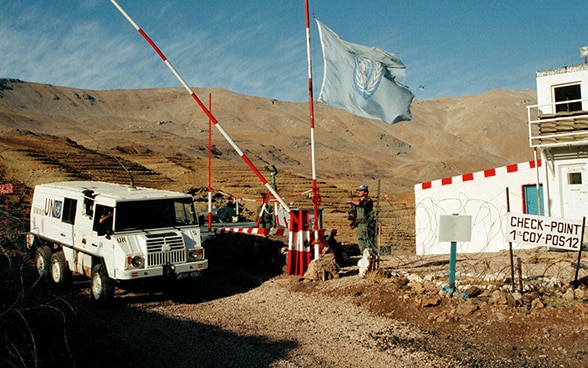
Switzerland supported the resolution in the Security Council because the UNDOF makes an important contribution to peace and stability in the Middle East. Against the background of the escalation of violence in the Middle East following the terrorist attacks by Hamas on 7 October and the major regional tensions, this mission is all the more important in order to avoid a regionalization of the current conflict.
19.12.2023 – Switzerland's membership of the UN Security Council: a look back and a look ahead
For the UN Security Council, 2023 was a year of multiple crises. Barely any of the world's conflict hotspots failed to make the agenda of its virtually daily meetings, from Haiti and Sudan to Ukraine and the Middle East. Over the past year, Switzerland has focused on the four priorities defined by the Federal Council, which it intends to build on during the second half of its Security Council term in 2024.
Article: Switzerland's membership of the UN Security Council: a look back and a look ahead
08.12.2023 – Resolution in favour of humanitarian ceasefire fails in UN Security Council due to veto
On December 6, UN Secretary-General António Guterres wrote to the UN Security Council to call for a humanitarian ceasefire due to the unsustainable situation in the Gaza Strip. In this context, the United Arab Emirates introduced a resolution in the Security Council calling for an immediate humanitarian ceasefire, compliance with international humanitarian law and the protection of Israeli and Palestinian civilians by both parties to the conflict, as well as the immediate release of all remaining hostages. Switzerland supported the resolution. However, it failed due to a veto by the United States. During the negotiations, Switzerland successfully argued for the protection of civilians on both sides and the release of hostages to be included in the text of the resolution.
The resolution would have had a humanitarian focus aimed at improving the dire situation of civilians in the Gaza Strip. After the vote, Switzerland clarified that the humanitarian ceasefire called for in the resolution would have been understood as a temporary humanitarian pause that would not have affected Israel's right to defense and security. The Federal Council discussed the draft resolution at its meeting today.
Switzerland regrets today's decision by the Council and will continue to work for the Security Council to agree on steps that go beyond humanitarian aid. This is essential for survival, but it will not resolve the conflict. A two-state solution negotiated by both sides is the basis for peace and stability in the Middle East.
06.12.2023 – Onset of winter in Ukraine: protecting the civilian population is now even more important
The UN Security Council met today to discuss the situation in Ukraine. Russia's military aggression against its neighbor continues unabated. The onset of winter brings an additional hardship to the suffering civilian population. Ongoing Russian attacks on critical infrastructure are exacerbating the precarious humanitarian situation. They are causing power, heating and water outages, which are particularly vital in winter. Humanitarian organisations are working tirelessly to provide relief. The lack of humanitarian access to Ukrainian areas under Russian control remains a concern.
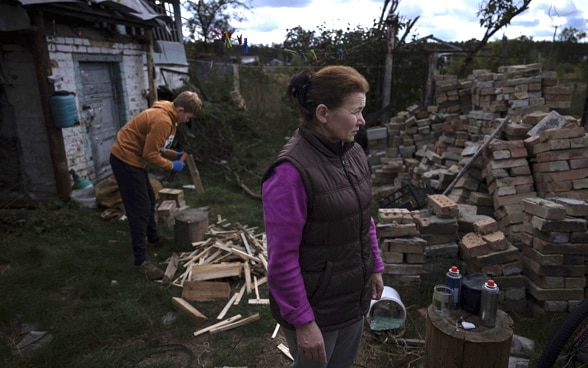
Against this backdrop, Switzerland emphasised in the Security Council the urgent need to step up humanitarian measures on which almost 18 million people depend. These measures should ensure the supply of electricity and heat. Switzerland also reiterated its call for compliance with international humanitarian law and the protection of the civilian population. It also emphasised the special protection of medical personnel and facilities. Since February 24 2022, at least 10,000 civilians have lost their lives and more than 18,500 have been injured in Ukraine. The ongoing Russian airstrikes, which do not stop at residential buildings, schools, hospitals and other civilian facilities throughout the country, are further increasing these figures. Furthermore, Switzerland stressed in the Council that food security in Ukraine must be strengthened, as food security in many parts of the world also depends on it. In this context, Switzerland reiterated its support for the efforts of the UN and other actors to facilitate grain exports from Ukraine.
President Alain Berset's visit to Kyiv ten days ago to attend an international summit on global food security emphasised Switzerland's continued solidarity with Ukrainian citizens. As part of its humanitarian activities, Switzerland will continue to provide winter aid to the Ukrainian civilian population and will be strongly involved in humanitarian demining in the country.
Statement by Switzerland on the situation in Ukraine, UN Security Council, 06.12.2023
01.12.2023 – Switzerland regrets the withdrawal of the UN Mission in the Sudan
At the request of the Sudanese government, the UN Security Council today decided to end the United Nations Integrated Transition Assistance Mission in the Sudan (UNITAMS).
Without the consent and political will of the host state, UN Political Missions are unable to implement their mandate. On 16 November, the government withdrew its consent for UNITAMS in a letter to the Secretary-General. In a statement after the vote, Switzerland expressed regret for the termination of the UN mission in Sudan. UNITAMS' mandate was originally intended to support the country's transition, which was abruptly interrupted by the outbreak of conflict last April. Various UN agencies will remain in the country. In the Council, Switzerland voiced its support for the recently appointed UN Personal Envoy of the Secretary-General for Sudan and the regional peace efforts. Switzerland also appealed to all parties to the conflict to fulfil their obligations under international humanitarian law, in particular to protect the civilian population.
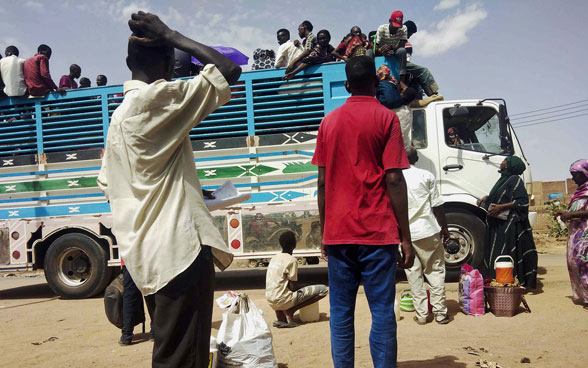
The current conflict is taking a massive toll on the civilian population. The humanitarian situation in the country is catastrophic. According to the United Nations High Commissioner for Refugees (UNHCR), over 5 million people have been displaced within Sudan since the outbreak of violence and over one million have fled to neighbouring countries to escape the consequences of the conflict. The number of displaced people is one of the highest in the world. The conflict also further exacerbates the dramatic humanitarian situation. Figures from the UN Office for Humanitarian Affairs (OCHA) confirm that almost 25 million people – half of Sudan's population – are in urgent need of humanitarian aid. There is a lack of food, drinking water, hygiene facilities, shelter, medical care and protection. To respond to the acute humanitarian needs in Sudan and the affected neighbouring countries, Switzerland has provided around CHF 60 million so far this year.
Against the current backdrop of ongoing violence, displacement and humanitarian need, it is important to Switzerland that the Security Council continues to fulfil its responsibility for peace and security and remains informed about the situation in Sudan. In the negotiations on the resolution, Switzerland therefore advocated for a continued reporting to the Council on the situation in the country and the role of the UN Personal Envoy of the Secretary-General for Sudan. The latter is to play an important role in supporting regional peace efforts.
29.11.2023 – Middle East: Switzerland welcomes the release of hostages in the UN Security Council
The UN Security Council today discussed the still urgent situation in the Middle East in the presence of various ministers. Ambassador Thomas Gürber, Head of the FDFA's UN Division, represented Switzerland. At the beginning of the debate, UN Secretary-General António Guterres appealed to the Security Council that the trend of the increasingly deteriorating situation in the Middle East must be reversed.
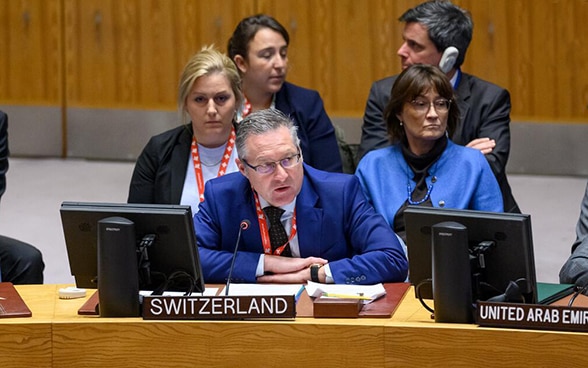
Thomas Gürber referred to the Security Council resolution on the protection of children adopted on 15 November. It represents an important first step by the Council in the current conflict and calls on all parties to comply with their obligations under international law and international humanitarian law, particularly with regard to the protection of the civilian population.
Switzerland welcomes the release of the hostages and thanks the states involved for their mediation efforts as well as the ICRC for its role in implementing the hostages’ release. Ambassador Gürber reiterated that Switzerland is calling for the release of all hostages. For this to succeed, humanitarian pauses are important, as called for by the Council in its resolution. Thomas Gürber emphasised that the humanitarian pauses must be extended for this purpose and to provide humanitarian aid to the civilian population in the Gaza Strip.
Humanitarian aid is vital, but it is not a sustainable solution to the conflict. Switzerland will continue to work in the Security Council to promote consensus and a political solution to the conflict. The two-state solution, in which the Israeli and Palestinian populations can live side by side in peace, security and dignity, is the only basis for peace and stability in the Middle East.
In addition, Thomas Gürber recalled Switzerland's position on the current conflict in the Council: it strongly condemns the terrorist acts of Hamas since 7 October, recognises Israel's right to ensure its security and defence and calls on all parties to comply with international humanitarian law to protect the civilian population and to allow rapid and unhindered humanitarian access to the Gaza Strip.
Statement by Switzerland on the situation in the Middle East, UN Security Council, 29.11.2023
20.11.2023 – UN Security Council focuses on development cooperation and peacebuilding
On 20 November, the UN Security Council will hold an open debate on the link between development cooperation and peacebuilding. This link has long been a focus of Switzerland's international cooperation. Switzerland contributes its expertise to the discussions in the Council brings its expertise to the discussions to underline that a state's economic development does not automatically lead to peace. What is needed instead is to address social inequalities and strengthen the resilience of communities. Achieving peaceful coexistence also requires dialogue between different population groups and between citizens and decision-makers. The gains made through this process must be consolidated through political dialogue with local authorities. Furthermore, Switzerland has been seconding peace and development advisers to the UN since 2016. These advisers act as a bridge between the UN's peace and development activities in the field, supporting local actors in the prevention of violent conflict. Under the following link examples show the SDC's substantial contribution to peace and security in the Sahel and the Horn of Africa.
Article: UN Security Council focuses on development cooperation and peacebuilding
15.11.2023 – UN Security Council adopts resolution focusing on the protection of children in the Middle East
After weeks of wrangling, the UN Security Council today adopted a resolution on the protection of children in the Middle East. The text of the resolution, which was introduced by Malta as chair of the Council's Working Group on the Protection of Children in Armed Conflict, calls for the protection of children through temporary humanitarian pauses.
According to the resolution, the purpose of the pauses should include the provision of humanitarian assistance to the civilian population, particularly children, the evacuation of sick and injured children from the Gaza Strip and the recovery of missing children. To ensure this, the resolution calls for safe and unimpeded humanitarian access for UN humanitarian organizations, their partners and the ICRC during pauses in the fighting.
The resolution adopted by the Security Council also demanded that all parties comply with international humanitarian law and ensure the protection of civilians, in particular children, which is a priority of Swiss foreign policy. The text also calls for the release of all hostages held by Hamas since October 7.
Switzerland supported the resolution because it takes into account the urgent humanitarian situation in the Gaza Strip. The resolution reflects four Swiss priorities: (1) humanitarian pauses for rapid humanitarian access; (2) respect for international humanitarian law; (3) release of hostages; and (4) prevention of the escalation of the conflict. The concise text of the resolution, which is geared to operational needs, deliberately refrains from political contextualization, especially since it proved impossible to reach a consensus on this during the negotiations. As a country with a long humanitarian tradition and as the depositary state of the Geneva Conventions, the protection of children in conflicts is of particular concern to Switzerland. According to international humanitarian law and the Geneva Conventions, civilians, including children, must be protected in conflicts. In its explanation of vote, Switzerland reiterated the position of the Federal Council on the current conflict in the Middle East, in particular its condemnation of terrorist acts by Hamas and its recognition of Israel's right to ensure its defense and security. The so-called "statement after the vote" gives states at the UN the opportunity to present their detailed positions and assessments in addition to the vote.
After four failed attempts to adopt a resolution on the Middle East since October 7, today's resolution is a testament to the Security Council's ability to act and take decisions. At the same time, the resolution sends an important signal to all actors and affected civilians on the ground. The last time the Security Council was able to adopt a resolution on the Middle East was in 2016. Switzerland will continue to advocate in the UN Security Council for measures that go beyond the protection of the civilian population and address the overall situation in the current conflict in the Middle East - namely a resolution that condemns the terrorist acts of Hamas, calls for the release of all hostages, recognizes Israel's right to ensure its security and demands rapid, safe and unhindered humanitarian access to Gaza.
Statement by Switzerland after the vote, UN Security Council, 15.11.2023
15.11.2023 – The UN Security Council renews four resolutions
The UN Security Council renewed four resolutions on 14 and 15 November 2023. These include the mandates of the UN peacekeeping missions in the Central African Republic (MINUSCA), in the Abyei border region between Sudan and South Sudan (UNISFA), the African Union Transition Mission in Somalia (ATMIS) and the sanctions regime for Yemen. Switzerland supported the renewal of all four resolutions in the Council because they are in line with its priorities for Swiss membership of the Security Council.
MINUSCA in the Central African Republic
While the security situation in certain areas of the Central African Republic has improved, ongoing armed clashes continue to jeopardise the civilian population. MINUSCA is making an important contribution to advancing peace efforts in the country and ensuring better protection for the civilian population. Switzerland is represented on the ground by an SDC cooperation office in Bangui. In cooperation with the government and MINUSCA, it promotes compliance with international humanitarian law and human rights.
UNISFA in the Abyei region between Sudan and South Sudan
The resource-rich Abyei region between Sudan and South Sudan was the scene of deadly clashes following South Sudan's declaration of independence in 2011, displacing over 100,000 people. UNISFA ensures the protection of the civilian population on the ground and access for humanitarian actors.
ATMIS in Somalia
The African Union Transition Mission in Somalia (ATMIS) mandated by the UN Security Council, supports the local authorities in maintaining peacekeeping operations. The aim of ATMIS is to enable the Somali security forces to maintain security in the country independently.
Yemen sanctions regime
The UN Security Council's sanctions in relation to the conflict in Yemen are intended to support ongoing political efforts to achieve a ceasefire and peace in the country. The sanctions include asset freezes, travel bans and arms embargoes against sanctioned individuals and entities.
14.11.2023 – UN police forces help protect civilians in conflict zones
Police officers play an important role in UN peacekeeping missions mandated by the UN Security Council. Police officers oftentimes work under very difficult conditions to maintain public order and protect the civilian population in conflict zones. At the UN Security Council's annual open debate on police components in peacekeeping missions, Switzerland emphasised their importance for peace and security and underlined several areas which would allow police components to carry out their work even more effectively.
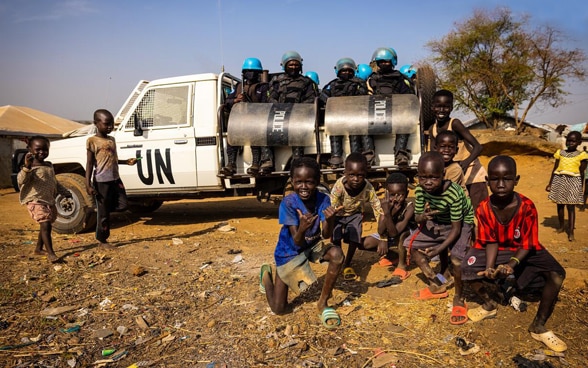
This includes support for the training of local police forces in the host countries of UN peacekeeping missions. Local authorities must be empowered to ensure the security of their population. Specifically, for example, the capacity of the local police to maintain public order during elections must be strengthened. Elements of the UN police also act as an early warning mechanism. Thanks to their daily interactions with the population, they have an extensive network at their disposal. Against this backdrop, it is crucial that police personnel are able to communicate with the local population and receive context-specific training. Such training can ensure that the information received is used adequately in the mission-planning phase, for example to protect the civilian population. Preparing police commanders for the numerous challenges they face in conflict zones is key to ensuring that such important decisions can be made. Switzerland therefore hosts an annual two-week course for police commanders in UN peacekeeping missions, which is currently being held in Stans, Nidwalden.
Switzerland actively contributes to the activities of the police in the UN and detaches police officers to peace missions, for example in the Democratic Republic of Congo or South Sudan. In addition to their professional expertise, the language skills of Swiss police personnel are also an important asset. As part of its activities at the UN, Switzerland will continue to contribute to the effectiveness of peace missions.
Statement by Switzerland, Open debate on UN police forces, UN Security Council, 14.11.2023
10.11.2023 – Middle East: Humanitarian actors must be able to carry out their work safely and effectively
In light of the situation in the Middle East, the UN Security Council met again today for an emergency meeting. Tedros Ghebreyesus, Director-General of the WHO, provided the Council with first-hand information on the catastrophic humanitarian situation in the Gaza Strip.
In accordance with its position, Switzerland condemned Hamas' acts of terrorism in the Council in the strongest terms, called for the unconditional release of all Hamas hostages and recognised Israel's right to ensure its defence and security. Switzerland also reminded the audience that all parties must abide by international humanitarian law.
International humanitarian law regulates the conduct of war and protects the victims of armed conflicts. It is universally applicable. As a country with a long humanitarian tradition and as a depositary state of the Geneva Conventions, the protection of the civilians is a central pillar of Switzerland's foreign policy and a priority for its membership of the UN Security Council. In the Council, Switzerland expressed its deep concern about the catastrophic humanitarian situation in Gaza. It emphasised that the civilian population is in urgent need of aid and protection without water, electricity and essential services. International humanitarian law also requires the protection of medical facilities and humanitarian aid workers. Last Tuesday's incident, in which an ICRC convoy carrying aid supplies to the Al-Quds hospital in Gaza came under fire, highlights the insecure environment in which humanitarian organisations work in Gaza.
In the UN Security Council, Switzerland will continue to actively contribute to the Council taking urgent measures, such as calling for humanitarian pauses or truces, to ensure rapid and unhindered access for humanitarian aid to Gaza. This should enable the ICRC and other humanitarian actors to mitigate the worsening health crisis in Gaza with their work. At yesterday's international humanitarian conference in Paris, Switzerland confirmed that it is earmarking additional funds totalling CHF 90 million for emergency humanitarian aid in the entire region.
Swiss statement on the situation in the Middle East, UN Security Council, 10.11.2023
06.11.2023 – Emergency meeting on the situation in Gaza
At an emergency meeting of the UN Security Council, Switzerland expressed its deep concern about the number of civilian casualties in Gaza and the fact that hospitals, UN buildings and other civilian facilities in the Gaza Strip have been hit. It emphasised that the obligations under international humanitarian law are clear: civilians and civilian objects must be protected, both in Israel and in the Gaza Strip.
At the same time, Switzerland reiterated its unequivocal condemnation of the acts of terrorism and rocket fire by Hamas against the Israeli population in accordance with its position. It called for the immediate and unconditional release of all hostages taken by Hamas in Gaza. Switzerland recognises Israel's right to ensure its defense and security and recalls that all parties are obliged to comply with international humanitarian law. In light of the catastrophic humanitarian situation in Gaza, it called for the rapid and unhindered delivery of basic goods and services to all civilians in need.
02.11.2023 – Bosnia and Herzegovina: Unanimous extension for EUFOR ALTHEA
On 2 November 2023, the UN Security Council adopted unanimously a resolution to authorise the EU mission EUFOR ALTHEA for another year. The core task of the mission is to support the authorities in maintaining a secure environment in the country. This year's negotiations took place under Switzerland's leadership. In this role, it facilitated dialogue between all parties. Switzerland welcomes the unanimous extension of the authorisation as a strong signal in support of stability and security in Bosnia and Herzegovina.
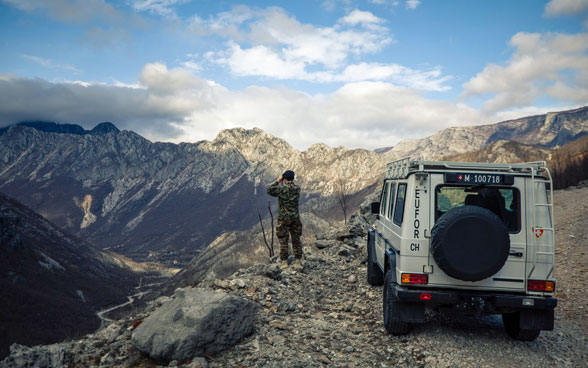
Through its presence, EUFOR ALTHEA makes an important contribution to peacekeeping in Bosnia and Herzegovina and helps stabilise the Western Balkans region. In addition to maintaining a secure environment, the mission's mandate includes the implementation of and compliance with the Dayton Peace Agreement and working with the Bosnian authorities to achieve these goals. In line with its long-standing commitment to peacebuilding, Switzerland will continue to support the mission with experts.
The security situation in the country has remained fragile since the 1992-1995 war. Since 2004, up to 20 Swiss Armed Forces personnel have been taking part in the EUFOR ALTHEA mission in the Balkan state. They are stationed at known and potential conflict sites and are in contact with the local population and the authorities. This gives them access to information that EUFOR uses to assess the security situation in the country.
Within its international cooperation, Switzerland supports Bosnia and Herzegovina with the aim of advancing reforms and creating new perspectives for the population. In the Security Council, Switzerland assured Bosnia and Herzegovina of its continued support on the path to a united and peaceful future.
Statement by Switzerland on the situation in Bosnia and Herzegovina, UN Security Council, 02.11.2023
31.10.2023 – UN Security Council renews four peacekeeping missions
The UN Security Council yesterday and today adopted four resolutions renewing UN peacekeeping missions. These are the UN missions in Colombia, Libya, Western Sahara and Somalia. Switzerland supported all four resolutions in the Council.
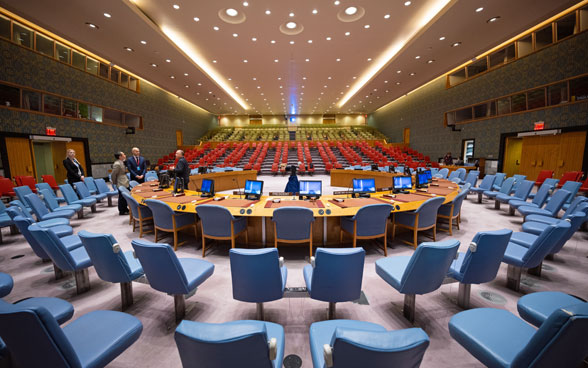
UNVMC in Colombia
The UN Monitoring Mission in Colombia (UNVMC) is mandated to monitor and verify the peace agreement between the FARC (Revolutionary Armed Forces of Colombia) and the Colombian government. As part of its long-standing peace policy in Colombia, Switzerland has assumed an official mandate as guarantor state for the peace negotiations at the request of the Colombian government and the rebel group EMC FARC-EP (Estado Mayor Central de las FARC-EP).
UNSMIL in Libya
The UN Support Mission in Libya (UNSMIL) has been active in the country since the fall of Muammar al-Gaddafi's authoritarian regime in 2011. UNSMIL's tasks include supporting the Libyan government in establishing the rule of law and organising democratic elections.
MINURSO in Western Sahara
The UN peacekeeping mission in Western Sahara (MINURSO) monitors the ceasefire between the Moroccan government and the Polisario independence movement. MINURSO also supports the reduction of the threat posed by mines. Members of the Swiss Armed Forces are active in Western Sahara in the framework of the United Nations Mine Action Service in humanitarian demining.
UNSOM in Somalia
The United Nations Assistance Mission in Somalia (UNSOM) supports the Somali government in securing peace and establishing the rule of law. UNSOM also helps the government to establish mechanisms for strengthening human rights and to involve women in political processes. In addition, the mission monitors human rights violations or violations of international humanitarian law in Somalia and assists in their investigation.
30.10.2023 – Emergency meeting on the situation in the Middle East
Against the background of the intensification of hostilities last weekend, the UN Security Council held an emergency meeting today. Switzerland stressed that calling on all parties to protect the civilian population is and must remain a central task of the UN Security Council. Civilians must be protected in Israel, the Gaza Strip and the West Bank.
Switzerland strongly condemns the acts of terrorism and the taking of hostages by Hamas, demands the immediate and unconditional release of the hostages and expresses its solidarity with the Israeli population. Three weeks after the start of hostilities, the humanitarian situation in Gaza is catastrophic. The population lacks basic necessities such as water and electricity. Against this background, Switzerland calls on all parties to comply with their obligations under international humanitarian law and to allow rapid, safe and unhindered humanitarian access to Gaza.
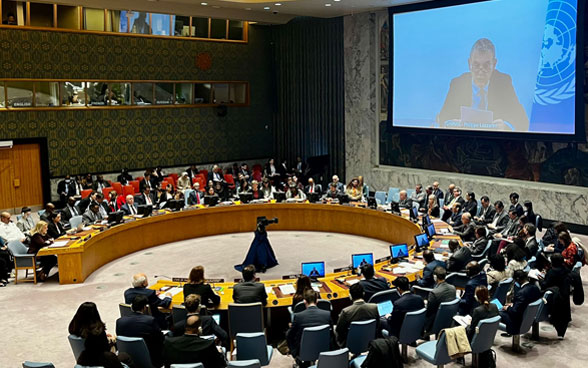
International humanitarian law, including the Geneva Conventions, is universal. It provides the legal framework for the protection of civilians in conflict. Switzerland recognizes Israel's legitimate desire for national defense and security. It recalls that international humanitarian law takes into account legitimate needs such as security and military necessity and must therefore be respected without exception. Violations of international humanitarian law and human rights must be investigated and the perpetrators held accountable.
In the UN Security Council and the UN General Assembly, Switzerland has in recent weeks called for measures such as humanitarian pauses or a humanitarian ceasefire. It once again called on the Security Council to work together to end the violence. Four resolutions on the Middle East have failed in the Council in the last two weeks. Switzerland will continue to work actively for joint action by the Security Council and for a peaceful solution.
Statement by Switzerland on the situation in the Middle East, UN Security Council, 30.10.2023
25.10.2023 – Again no agreement on the resolution on the situation in the Middle East
On October 25, 2023, the UN Security Council voted on a draft US resolution on the situation in the Middle East. The adoption of the resolution failed due to a veto by Russia and China. Switzerland supported the resolution because it would have represented a step by the Security Council to protect civilians in the Middle East and emphasized humanitarian pauses as a measure for humanitarian access. Switzerland was actively involved in the negotiations leading up to the vote to ensure that international humanitarian law and humanitarian pauses were enshrined in the text of the resolution.
The Council also voted on a Russian draft resolution that failed to secure a majority. Switzerland abstained. The Russian proposal called for a humanitarian ceasefire, which Switzerland supported in principle, but in the text of the resolution, which had not been discussed among Council members beforehand, contained elements that did not correspond to the Swiss position and assessments.
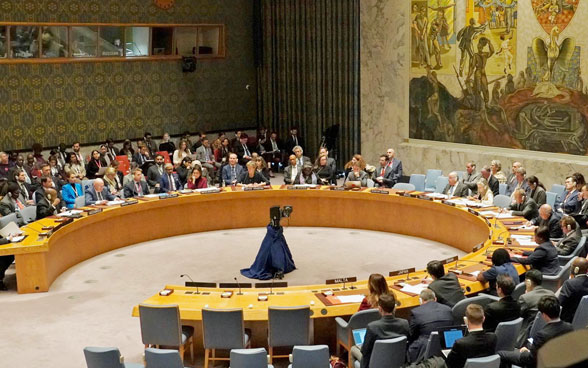
The day before, during an open debate in the UN Security Council, Switzerland once again condemned the acts of terror, the indiscriminate firing of rockets against the Israeli population and the taking of hostages by Hamas. It also underlined Israel's legitimate desire for national defense and security and called on all parties to respect international law, in particular international humanitarian law, and to take measures to de-escalate. Switzerland also called on all actors to remove obstacles to the swift, safe and unhindered delivery of aid to Gaza.
The protection of civilians is a top priority for Switzerland as the Depositary state of the Geneva Conventions and a priority for its membership in the Security Council. "Civilians in Israel and in Gaza must be protected at all costs. We are committed to a Security Council that makes respect for international humanitarian law a priority, especially in urgent cases," said Swiss Ambassador Maya Tissafi, Head of the Middle East and North Africa (MENA) Division and Head of the Middle East Task Force, in New York.
In her remarks, Switzerland underscored its commitment since last week for the Council to adopt a resolution that would allow forhumanitarian pauses and rapid, safe and unhindered access for aid to Gaza. Last week, two resolutions failed due to a lack of votes and a US veto.
Switzerland remains convinced that humanitarian pauses are urgently needed to provide the civilian population with essential goods and to allow humanitarian organisations access to the Gaza Strip in accordance with international humanitarian law. To achieve this, the Security Council must find a solution. Switzerland continues to advocate for this.
Switzerland calls on the UN Security Council to step up its efforts to fulfill its responsibility to protect civilians.Against the background of the current escalation of the conflict, urgent humanitarian measures are important. The goal of a sustainable peace in the Middle East based on a two-state solution must not be lost sight of.
Statement after the vote: Situation in the Middle East, 25.10.2023
Statement by Switzerland on the situation in the Middle East, UN Security Council, 24.10.2023
25.10.2023 – Women's rights must be protected so that they can contribute to sustainable peace
The UN Security Council discussed the challenges related to women's participation in peace processes during an open debate on "Women, Peace and Security". Switzerland stated in the Council that it wants to strengthen the voices of women representatives of civil society. Their recommendations should be better taken into account in the Council's debates and decisions. At the debate, Switzerland therefore reiterated important recommendations from women in civil society, whom it had invited as briefers during its presidency in May. Women all over the world must have the right to the freedom to participate fully in political processes. For sustainable peace, women must be able to participate equally in peace negotiations and peacebuilding. For this to succeed, it is imperative that women and girls are protected from violence and human rights violations. In the Council, Switzerland called on all states to prevent violations of women's rights, including those in the digital space. All people share the same human rights, regardless of whether they belong to a national, ethical, religious or linguistic minority.
For years, Switzerland has been committed to "Women, Peace and Security" as part of the National Action Plan for the implementation of UN Security Council Resolution 1325. The Peace and Human Rights Division of the FDFA (PHRD) is committed to the equal participation of women in the prevention and resolution of conflicts in several countries. This includes, for example, the establishment of a national network of women mediators and peace activists in Lebanon. Through the civil society initiative "Women's Peace Tables" (WPT), women in Colombia, Nepal and the Philippines are supported in participating in the official peace processes in their countries.
The SDC also supports the "Mujeres Resilientes" (Resilient Women) programme in El Salvador, for example, as part of its international cooperation. In the video, Camille Flückiger, who works in the Cooperation Office in Managua (Nicaragua), explains how Switzerland empowers women on the ground to tackle local conflicts and thus contribute to peace.
23.10.2023 – Kosovo: Switzerland calls on both parties to return to dialogue
The situation in Kosovo was the focus of a UN Security Council meeting today, attended by Kosovo President Vjosa Osmani and Serbian Prime Minister Ana Brnabić. Tensions and insecurity in Kosovo have increased since the last Council meeting. A Kosovar police officer was killed and several people were injured in an attack on the Kosovar police this September. De-escalation is therefore necessary in view of a serious return to the normalisation process.
In view of this, Switzerland condemned the recent violence in Kosovo in the Security Council and called on all parties to cooperate. In order to implement political solutions, inflammatory rhetoric or the increased stationing of troops near the border should be avoided. Switzerland called on the parties to engage in the EU-led dialogue and to implement their obligations under the agreement to normalise relations between Kosovo and Serbia.

Switzerland maintains close relations with Kosovo for more than thirty years and is home to a large diaspora. Switzerland actively supports the dialogue between Serbia and Kosovo and contributes to building trust. A central pillar in the reconciliation process is coming to terms with the past. Among other things, Switzerland actively supports both states in the search for and identification of missing persons. As part of its international cooperation, Switzerland promotes inclusive and democratic governance in Kosovo and creates decent jobs. In this way, it contributes to future prospects for the whole of society.
In addition, the Swiss contingent in the Kosovo Force (KFOR) is the largest Swiss contingent in a peace mission, with up to 195 members of the armed forces. KFOR has its origins in a UN Security Council resolution from 1999. KFOR pursues the goal of ensuring the freedom of movement of the population and providing a stable environment. Swiss Armed Forces personnel are making a concrete contribution on the ground so that KFOR can achieve this goal. At today's meeting of the Security Council, Switzerland underlined its support for KFOR as a guarantor of security.
18.10.2023 – No agreement on resolution on humanitarian situation in the Middle East in the UN Security Council
Civilians in Israel and Gaza are the first victims of the renewed outbreak of the conflict in the Middle East. Thousands of civilians in Israel and Gaza, including hundreds of children, have already lost their lives. Against this backdrop, the UN Security Council voted on 18 October 2023 on a resolution introduced by Brazil condemning Hamas attacks and calling on the parties to respect international humanitarian law, protect civilians and allow humanitarian aid into Gaza. Switzerland supported the resolution. Due to a US veto, the adoption of the resolution failed. The draft resolution introduced by Brazil aimed to achieve consensus in the Security Council and contained important elements from Switzerland's point of view. For this reason, Switzerland regrets that this important resolution was not adopted today.
On Monday evening, a resolution text submitted by Russia had failed due to a lack of majority. This text did not contain a clear reference to international humanitarian law – one of Switzerland's priorities in the Security Council. Switzerland abstained from the vote.
Switzerland continues to advocate for solutions in the Security Council so that the Council fulfils its responsibility to protect the civilian population in the Middle East. However, it also remains active outside the Security Council at multilateral and bilateral level to improve the humanitarian situation in the Middle East.
Emergency meeting: Explosion at Al-Ahli hospital in Gaza
Immediately after the vote on the resolution, the UN Security Council held an emergency meeting to discuss the explosion at Al-Ahli hospital in Gaza. According to the UN, hundreds of people were killed and many injured. Switzerland recalls that hospitals and civilians must always be protected under international humanitarian law. A thorough investigation must be carried out.
Switzerland advocates in the Security Council for improvement of the situation in the Middle East
In recent days, Switzerland has taken a position on the escalating situation in the Middle East in various closed sessions of the UN Security Council. Last Friday, it once again condemned Hamas' acts of terrorism and recognised Israel's legitimate desire for national defence and security. It called on both parties to respect international law and underlined the need for humanitarian and medical aid to be delivered quickly and unhindered. In the negotiations on the resolution, Switzerland advocated these two objectives: on the one hand, the condemnation of terrorist acts and the protection of the civilian population, and on the other, respect for international law, in particular international humanitarian law and human rights.
Switzerland remains convinced that a lasting solution to the Middle East conflict can only be achieved by peaceful means. This must be based on a two-state solution negotiated by both sides in accordance with international law and the resolutions of the UN Security Council.
Situation in Israel and in the occupied Palestinian territory
12.10.2023 – The UN Security Council focuses on cooperation between the UN and regional and sub-regional organisations
Six days after it travelled to Addis Ababa (Ethiopia) for the annual meeting with members of the African Union Peace and Security Council, the Security Council held a meeting on close cooperation between the UN and regional and sub-regional organisations in the areas of conflict prevention, mediation, peacekeeping and peacebuilding. "Strategic partnership and regular exchanges between the UN and the AU are necessary and essential for efficient and effective multilateralism", said Adrian Hauri in New York on behalf of Switzerland.
The United Nations and regional organisations such as the AU bring different strengths and perspectives, as well as unique approaches to issues of common concern. At their annual meeting, members of the African Union Peace and Security Council and the UN Security Council expressed concern about the evolving security situation on the African continent, and the myriad threats to peace, security and stability. In Addis Ababa, Switzerland joined other countries in expressing its views on the current situation in the Sahel region.
In New York, Switzerland gave assurances that it would continue its long-standing support for the African peace and security architecture. "It is our intention to further promote exchanges and mutual understanding between the UN and the AU", said Adrian Hauri.
The African Union Peace and Security Council will travel to New York in October 2024. This meeting will therefore take place under the forthcoming Swiss Presidency of the Security Council.
08.10.2023 – Meeting on the Middle East: Switzerland calls for respect for international law
The Security Council met today for closed consultations on the situation in the Middle East. Switzerland condemned the shocking attacks, including acts of terror and rocket fire by Hamas against Israel. It called for the immediate release of those taken hostage who are currently being held in Gaza. It also deplored all civilian casualties and called on all parties to protect the civilian population and to respect the obligations of international humanitarian law. Switzerland underlined that de-escalation is the priority. It called on those responsible to do everything possible to bring about a ceasefire and avoid a regional escalation. It made this call also to those States that can exert influence on the parties involved.
07.10.2023 – Emergency meeting on the escalation of violence in Israel
Against the background of the escalation of violence in Israel, the UN Security Council will meet for an emergency meeting on 8 October 2023. Switzerland supports that the Council swiftly addresses the current situation in the Middle East. It condemns today's rocket fire by Hamas and the attacks on Israel from the Gaza Strip. Civilians must be protected and international law must be respected at all times. Switzerland calls for an immediate end to the violence in order to avoid further escalation.
02.10.2023 – Security crisis in Haiti: UN Security Council authorises international police mission
At its meeting today, the UN Security Council authorised the deployment of police forces by third countries to Haiti. Haiti is facing a worsening security crisis caused by rampant gang violence. Between January and June 2023 alone, gang members committed over 2,000 homicides. Sexual violence and kidnappings have taken on epidemic proportions. The Haitian national police do not have sufficient resources to contain the escalating violence. Moreover, the humanitarian situation is alarming: according to the FAO, around five million people, almost half of Haiti's population, are facing food insecurity. The threat of famine is looming. Severe flooding caused by torrential rains and an earthquake in June exacerbated the situation.
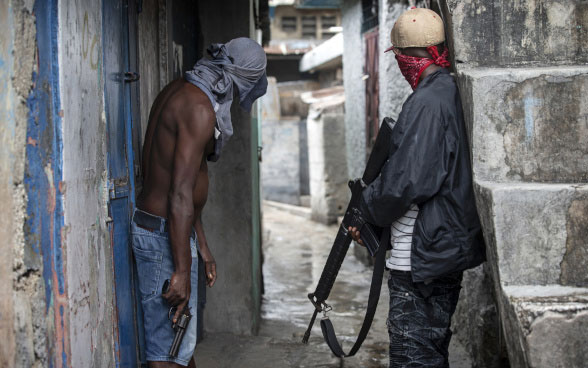
With its decision of 2 October 2023, the UN Security Council responded to a request from the Haitian government. The UN secretary-general recently issued a report calling on the Security Council to adopt various measures to improve security in Haiti. A key recommendation includes the establishment of a multinational police support mission, which Kenya has agreed to lead. During the negotiations on the resolution, Switzerland advocated in particular for respect for international law and human rights to be guaranteed and for measures to be taken to prevent sexual abuse, and for a monitoring mechanism to be set up in the mission.
On 6 September 2023, the Federal Council gave its preliminary approval for the authorisation of a security support mission for Haiti. It had issued guidelines for the negotiations in New York. In exceptional cases and under certain conditions, the mission should also be able to use force to fulfil its mandate of supporting the local police in restoring public order and security. Based on the modalities agreed between the Federal Council and the foreign policy committees of the National Council and the Council of States to involve Parliament during Switzerland's term on the Security Council, the chairs of the foreign affairs committees were consulted on this matter in accordance with Art. 152 para. 4 of the Parliament Act.
29.09.2023 – UN Security Council to combat human trafficking off the coast of Libya
The UN Security Council today decided to renew the resolution on combating migrant smuggling and human trafficking off the coast of Libya. UN member states and regional organisations active there will thus be authorised to inspect and seize vessels in the high seas if they have reasonable suspicion that they are being used for migrant smuggling or human trafficking from Libya towards Europe. In the Council, Switzerland supported the annual renewal of the resolution, which was first introduced in 2015, because it is an important instrument for combating human trafficking and protecting human lives.
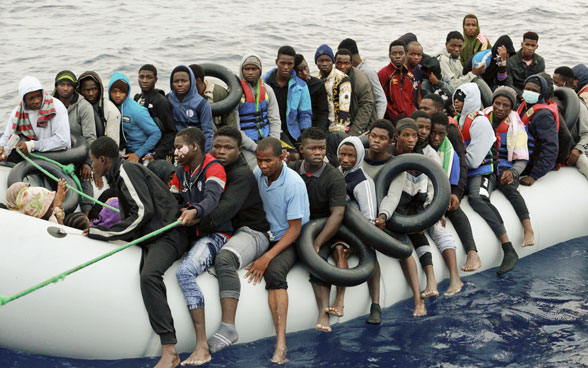
Libya is a destination and transit country for migrants from all over Africa. The conflict in Sudan, which broke out in April 2023, is expected to exacerbate the situation. The number of refugees attempting to cross the Mediterranean from Libya is constantly increasing. According to a report by UN Secretary-General Guterres, almost 8500 people, including women and children, were intercepted and returned to Libya in the first half of 2023. Around 750 people drowned in the sea and around 950 were reported missing.
21.09.2023 – Emergency meeting on the situation in Nagorno-Karabakh
In light of the situation in Nagorno-Karabakh, the UN Security Council held an emergency meeting. Switzerland is deeply concerned by the military operations launched by Azerbaijan earlier this week. In the Council, Switzerland stressed the importance of humanitarian access and is ready with its good offices to contribute to dialogue and sustainable peace, if Armenia and Azerbaijan agree.
20.09.2023 – President Berset represents Switzerland at Ukraine debate
President Berset took part in a debate on Ukraine in the Security Council. The debate took place under the Albanian chairmanship during the opening week of the UN General Assembly and in the presence of Ukrainian President Volodymyr Zelenskyy. The Swiss President underlined the central importance of the UN Charter for peace and security in the world. However, the number of conflicts is increasing and with it the suffering of the civilian population. Alain Berset condemned Russia's military aggression against Ukraine. It is a striking example of a breach of the UN Charter principles. The President of the Swiss Confederation called on Russia to cease all hostilities and immediately withdraw its troops from Ukrainian territory.
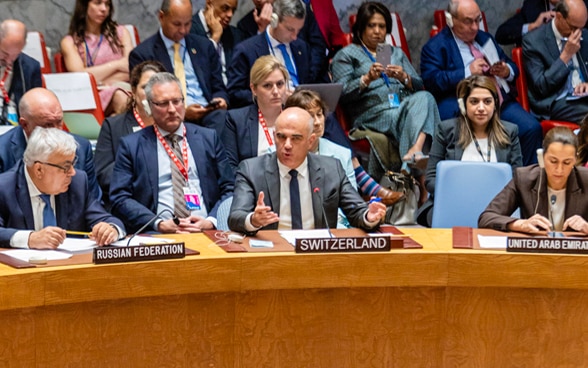
The consequences of Russia's military aggression against Ukraine are being felt around the world. Food security is in jeopardy, the energy sector is affected and nuclear risks are increasing. That is why strong multilateralism and mutual trust are more important than ever to achieve peace in Ukraine.
The task of rebuilding Ukraine in accordance with the Lugano Principles is immense. Switzerland shows solidarity with the Ukrainian people in many ways. Among other things, it supports humanitarian demining with expertise and material supplies, and plans to further expand this commitment. The President also called for a return to the Black Sea Grain Initiative.
Statement by President Alain Berset at the UN Security Council, 20.09.2023
20.09.2023 – The cohesion of non-permanent members is important for an effective Security Council
Federal Councillor Ignazio Cassis represented Switzerland at a joint press stakeout of the ten elected non-permanent members of the UN Security Council (E10). UN Security Council news overview. The E10 make up two thirds of the Security Council. As a Security Council decision – on a resolution, for example – requires nine affirmative votes, the E10 are key to the Security Council being able to carry out its task of maintaining peace and security in the world.
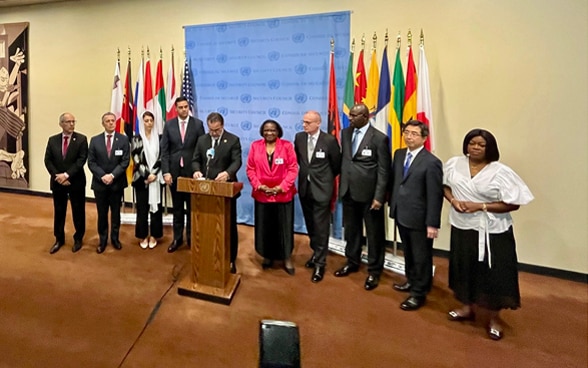
In their joint press stakeout, the E10 underlined their cohesion and commitment to multilateralism: "We will continue to play a constructive role with the aim of building bridges and finding meaningful compromises on all the issues the Security Council deals with. We have seen the significant peacekeeping measures that the Security Council can take when it is united." During meetings held last August on Lake Geneva, the E10 deepened their cooperation. "An efficient, transparent and effective Security Council is more important than ever in today's world. I am all the more pleased about the cohesion of the E10 who are pursuing this goal together," said Cassis following the event in New York.
19.09.2023 – First delivery of humanitarian goods to Syria via Bab-al-Hawa since July
Nearly twenty trucks loaded with humanitarian goods crossed the Turkish-Syrian border at Bab-al-Hawa on 19 September for the first time since last July. Switzerland welcomes the fact that humanitarian aid to north-western Syria via Bab-al-Hawa is continued. Over four million people rely on these vital supplies.
The renewal of the Cross-Border Humanitarian Mechanism through Bab-al-Hawa failed on 11 July 2023 due to a UN Security Council veto by Russia. The humanitarian situation across Syria remains precarious and it is important that UN agencies have humanitarian access to all regions of Syria. As a member of the Security Council, Switzerland continues to advocate for the implementation of the agreement on the continued use of the Bab-al-Hawa border crossing between the UN and the Syrian government.
14.09.2023 – Partnerships with the private sector to make humanitarian aid more effective
More than 100 armed conflicts around the world characterise the current era. The civilian population suffers the most. The number of displaced people has more than doubled in the last ten years. The number of people in need has more than quintupled. While needs are increasing, funding for humanitarian aid, which is cruelly lacking, is decreasing. Today, under the Presidency of Albania, the UN Security Council discussed ways of addressing this challenge. Indeed, humanitarian needs are growing, due to the negative effects of climate change, weak governance and armed conflicts, as well as the consequences of Covid-19. On the other hand, every conflict that is settled peacefully helps to reduce humanitarian needs. The UN Security Council and increased cooperation with the private sector play important roles in this regard.
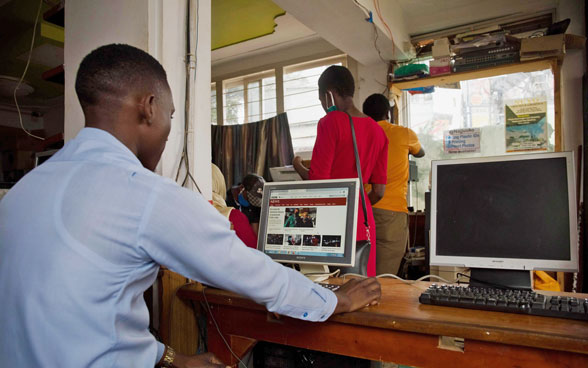
At the Security Council, Switzerland stressed that the international community must anticipate and invest to better identify conflict risks and provide humanitarian aid. New technologies can support this. "They make early warning systems more efficient. Furthermore, the importance of a stable and secure internet connection should not be underestimated. This enables people to get information and bring the necessary aid quickly to those in need," said Pascale Baeriswyl, Permanent Representative of Switzerland to the UN, in New York. This is why it is also crucial to strengthen partnerships between states and private actors in the humanitarian field, as their potential has not yet been fully exploited.
Switzerland supports various projects in this area as part of its international cooperation. These include, for example, cash payment programs for victims of natural events or disasters. In cooperation with local private financial institutions, they receive cash to buy urgently needed goods. These are purchased locally, enabling local shop owners or farmers to continue their business despite the difficult circumstances. In this way, Switzerland also contributes to curbing the displacement of affected people.
The expertise and networks of private companies and organisations based in conflict areas can make an important contribution to the humanitarian response of states and international organisations. "However, we must never forget that all measures related to private sector engagement must be based on humanitarian principles and human rights," Ambassador Baeriswyl stressed in the Security Council.
Statement by Switzerland on public-private partnerships, UN Security Council, 14.09.2023
07.09.2023 – Strengthening UN peacekeeping missions for effective and efficient peacebuilding
75 years ago, the UN Security Council sent the first peacekeeping mission, UNTSO, to maintain the ceasefire in the Middle East. Since then, over one million people have served in more than 70 UN peace missions. Millions of civilian lives around the world have been saved as a result. Today, twelve missions are active, and the nature of conflicts has changed radically since 1948. The UN Security Council today exchanged views on how UN peacekeeping missions need to adapt to fulfil their missions in an increasingly complex environment. The Blue Helmets do valuable work in many conflict regions under difficult conditions. Among other things, they monitor ceasefires, provide access for humanitarian actors through their presence and support political stabilisation processes so that sustainable peace can be secured.
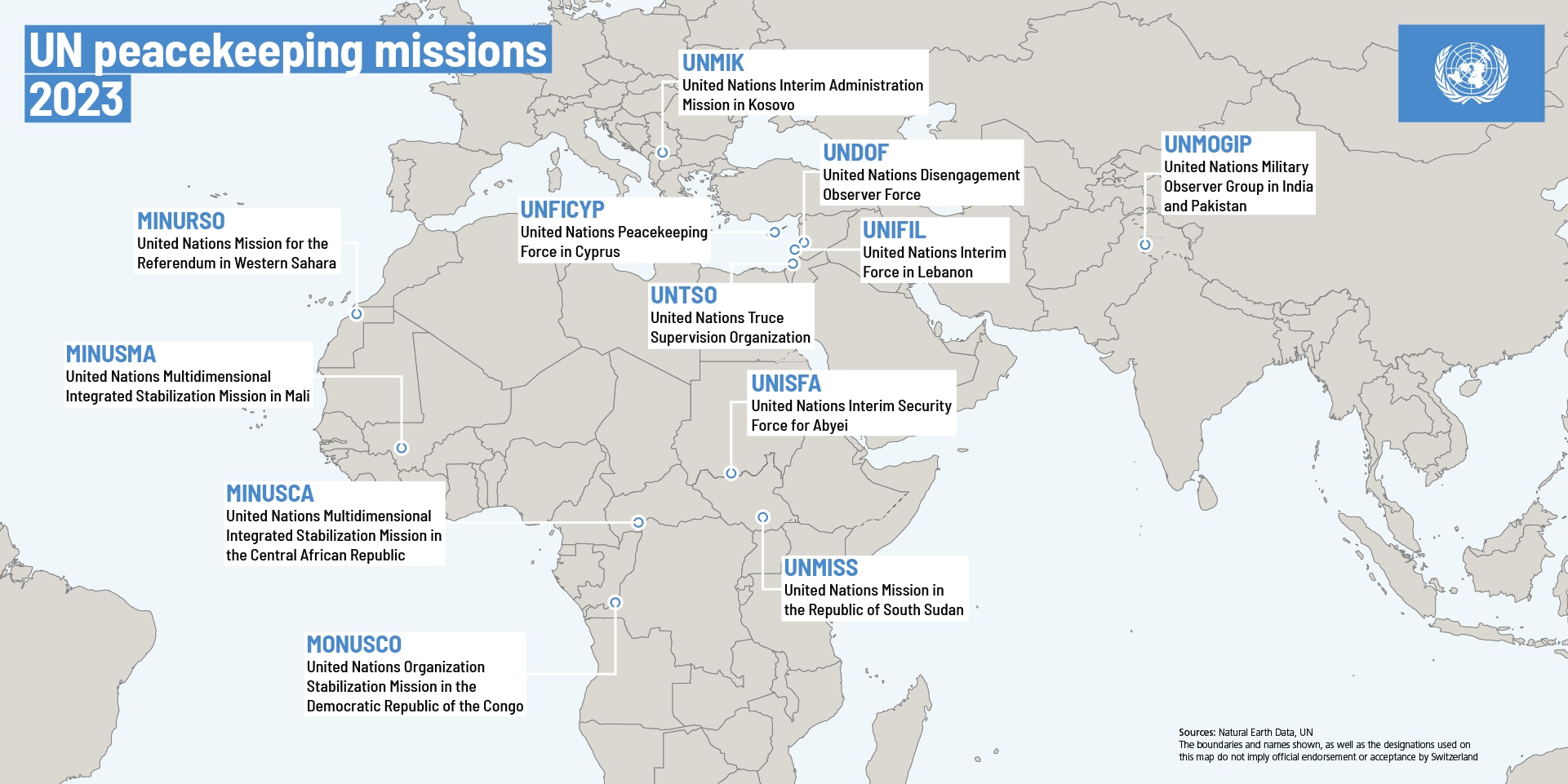
During the Council meeting, Switzerland stressed the need to strengthen partnerships with regional organisations, in particular the African Union (AU). The peace missions led by the AU should also be able to react more flexibly to unforeseen events. In addition, the protection of the civilian population should always be at the centre of a peace mission. "Switzerland is eager to advance the discussion on the necessary reforms of the peace mission," said Pascale Baeriswyl, Swiss UN Ambassador in New York. In addition, Switzerland also stressed the importance of the effectiveness of UN peace missions. Against this backdrop, Switzerland called in the Council for an even stronger coordination of planning, budget and performance evaluation so that UN peace missions can make an effective and efficient contribution to peacebuilding.
Statement by Switzerland on UN peace missions, UN Security Council, 07.09.2023
05.09.2023 – Good working methods are important for the UN Security Council to fulfil its mandate
The UN Security Council held an open debate today on improving its working methods. This is an important topic for Switzerland: "Strengthening efficiency" is one of the four thematic priorities the Federal Council identified for its Council membership. During the debate, Switzerland aligned itself to the joint statements of the ten elected Council members (E10) and the ACT Group. The Group advocates for a transparent, effective, efficient and inclusive UN Security Council.
The votes of the E10 are decisive to pass a resolution in the Council. A resolution requires nine votes in favour. In their joint statement, the E10 underlined the importance of adequate working methods for the Security Council to enable it to respond efficiently and transparently to current challenges in an increasingly complex geopolitical environment. To achieve this, the E10 emphasised, among other things, the willingness to compromise, the responsible use of the veto and a systematic inclusion of civil society in discussions. The joint declaration was preceded by a meeting of current and future Council members in Switzerland, where they deepened their cooperation to promote the effectiveness of the Council.
Switzerland coordinates the cross-regional ACT Group in New York, which celebrates its 10th anniversary this year. ACT's Council Statement underlines the need for the Security Council to act in a manner that is trustworthy to all UN member states and the billions of affected people on whose behalf it acts. "Nothing could be a better signal from the Council than the conscientious implementation of its own commitments." Against this backdrop, ACT underlined greater workload sharing among all Council members, for example through co-leadership on thematic and geographic dossiers, as well as exchanges with conflict-affected countries.
31.08.2023 – UN Security Council renews mandate of UN mission in Lebanon
The UN Security Council today renewed the mandate of the peacekeeping mission in Lebanon UNIFIL for 12 months. UNIFIL was first deployed by the Council in 1978, making it one of the oldest operating UN missions.
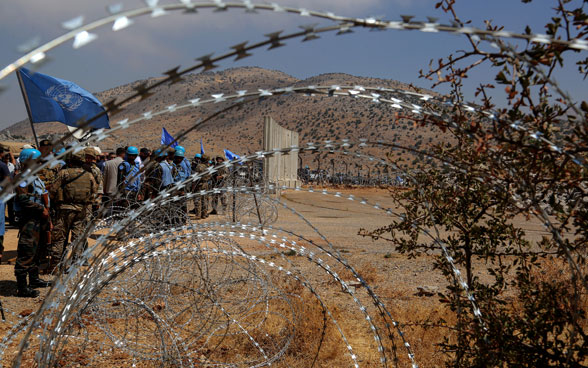
The region along the so-called Blue Line between Lebanon and Israel is marked by recurring armed conflicts. The mission monitors the ceasefire along the Blue Line and contributes to reducing tensions. In this way, it makes a concrete contribution to the promotion of sustainable peace, a priority defined by the Federal Council for the Swiss membership in the Security Council. Switzerland also supported the strengthening of the mandate in the area of renewable energies, which mitigates climate-related risks. Switzerland supported the resolution in the Council.
28.08.2023 – Security Council meeting on the withdrawal of the UN peacekeeping mission from Mali
On 30 June 2023, the UN Security Council decided to withdraw the UN peacekeeping mission MINUSMA from Mali by the end of the year, at the request of the Malian transition government. Now the Council has met again to discuss the progress made so far as well as the challenges of the withdrawal. The pullout raises the question of how certain important tasks of the mission can be continued as well as how its achievements can be maintained. These include the existing peace agreement and the protection of the civilian population. Since 2012, a security, socio-economic and humanitarian crisis has been steadily intensifying in Mali. Especially in the north and centre of the country, there are almost daily attacks against the civilian population, the Malian security forces or confrontations between armed groups, sometimes with a jihadist background. In June 2015, movements from the north and the Malian government signed a peace agreement in Algiers, whose implementation is being accompanied by MINUSMA, an engagement that is now coming to a close.
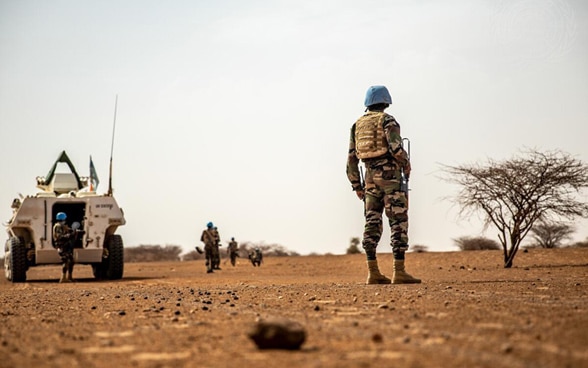
The Council meeting focused on ensuring an orderly withdrawal of MINUSMA and the uncertain future of Mali as of January 2024. Accordingly, Switzerland stressed in its statement that the implementation of the peace agreement and confidence-building measures are central. "Nine years of work, dialogue and efforts towards national reconciliation are at stake – first and foremost for the Malian people, but also for the entire Sahel region," underlined Adrian Hauri, Switzerland's deputy head of mission at the UN in New York.
Switzerland also stressed the importance of MINUSMA's important tasks being adequately continued by the Malian transition government and other regional actors. To this end, in-depth and inclusive talks are necessary so that concrete and implementable proposals for solutions are available by the end of the year. In its role in the Security Council as co-penholder for the UN Office for West Africa and the Sahel UNOWAS – which also covers Mali – Switzerland is ready to actively support this process. "We welcome all the measures that have already been taken to cushion the impact of MINUSMA's withdrawal on the civilian population and to better meet humanitarian needs," Hauri said. The challenges are and remain extremely complex so close cooperation of all relevant actors with the UN and MINUSMA is central. On the one hand, to ensure the scheduled withdrawal of the mission and, on the other, to guarantee the security of MINUSMA personnel stationed in Mali until the withdrawal is complete.
Statement by Switzerland on the situation in Mali, UN Security Council, 28.08.2023
22.08.2023 – Free and fair elections and the inclusion of women are central to Libya's future
The UN Security Council discusses the situation in Libya every two months. The United Nations Support Mission in Libya (UNSMIL) has been active in the country since the fall of Muammar al-Gaddafi's authoritarian regime in 2011. UNSMIL's tasks include supporting the Libyan government in establishing the rule of law and organising democratic elections.
The most recent elections, scheduled for December 2021, have been postponed indefinitely, as no consensus could be reached between the various Libyan actors on the electoral laws. "It is imperative that the outstanding issues are addressed. In order to create the necessary environment for free and fair elections, the actors involved must come to an agreement in the run-up to the elections," explained Riccarda Chanda, Switzerland's deputy head of mission at the UN in New York. To this end, Switzerland supports UNSMIL, including in its role as co-chair of the Berlin Process working group on international humanitarian law and human rights. The Berlin Process was launched in January 2020 to achieve a lasting ceasefire in Libya.
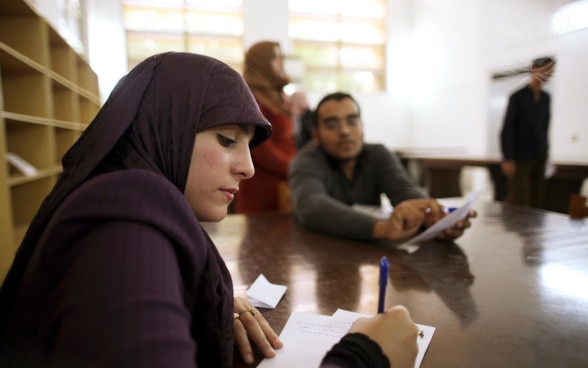
According to UN Secretary-General Guterres, the human rights situation in Libya is increasingly deteriorating. Excessive controls and bureaucratic restrictions imposed on civil society by the authorities and security actors are on the rise. "Switzerland supports the Secretary-General's call for these measures to be lifted," underlined Switzerland's representative on the Security Council. Furthermore, Switzerland is concerned about violations of the rights and abuse of women and girls; such abuses must not go unpunished. Addressing the Libyan authorities, Switzerland stressed in the UN Security Council that the participation of women in political processes must be safe and without intimidation. To this end, their freedom of movement and respect for their fundamental rights must also be guaranteed. Switzerland also expressed its concern about the recent violent clashes in Tripoli, in which people lost their lives. It calls on all parties to respect international humanitarian law and human rights at all times.
Statement by Switzerland on the situation in Libya, UN Security Council, 22.08.2023
17.08.2023 – First Security Council meeting on human rights situation in the Democratic People's Republic of Korea in six years
Today, the UN Security Council discussed the human rights situation in the Democratic People's Republic of Korea (DPRK) in a formal and public briefing. This is the first time since 2017 that a discussion in this format has been possible in the Security Council. The DPRK's nuclear weapons and missile programmes, banned by numerous Security Council resolutions, pose a threat to international peace and security. The grave human rights situation of North Koreans is also linked with this.
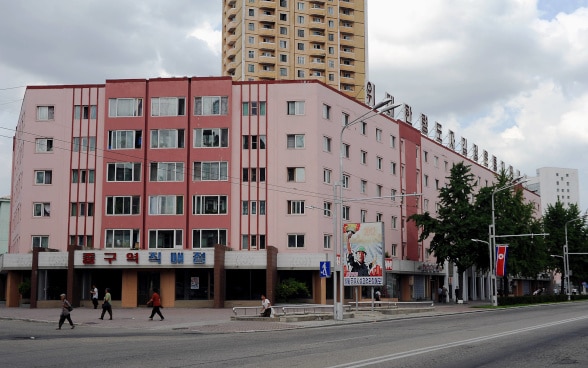
According to a Commission of Inquiry on Human Rights established in 2013 by the UN Human Rights Council for the DPRK, systematic and serious human rights violations continue to take place in the country. In the Security Council, Switzerland reminded the DPRK to respect universally applicable human rights. It also stressed that those responsible for human rights violations must be held accountable. In light of the DPRK's authoritarian government, the Security Council must consider all options to ensure that these violations do not go unpunished.
The range of human rights violations in the DPRK is extensive. "Torture, arbitrary detention and the forced removal of political prisoners to camps are just a few examples of serious and systematic violations. We also recall the DPRK's obligation to put an immediate end to all violations," said Adrian Hauri, Deputy Permanent Representative of Switzerland's Mission to the UN in New York and Chargé d'affaires, at the Security Council.
"The grave human rights situation in the DPRK threatens stability and peace in the region and beyond," Hauri said in New York. The Security Council must therefore work for positive and sustainable change for the North Korean people, he said. Furthermore, Switzerland called on the DPRK to engage in dialogue and cooperation with international actors in order to put an end to the grave human rights violations and their humanitarian consequences.
Statement by Switzerland on the human rights situation in the DPRK, UN Security Council, 17.08.2023
03.08.2023 – No sustainable peace on an empty stomach
UN estimates suggest that up to 783 million people in the world were affected by hunger in 2022. This is 122 million more people than before COVID-19. For example, civilians in Syria, Somalia, Sudan, Afghanistan and Yemen – to name just a few contexts – are at acute risk of hunger. Russia's decision to suspend the Black Sea Grain Initiative will exacerbate the already precarious food insecurity in many parts of the world. Moreover, climate change has unpredictable and long-term consequences, affecting first the poorest and those already affected by war.
"War breeds hunger and hunger breeds war," Adrian Hauri, Deputy Chief of Switzerland's Mission to the UN in New York and Chargé d'affaires, told the UN Security Council on 3 August. Switzerland had discussed the interaction between armed conflicts, related violations of international law and food security in the Council during its own presidency in May at the high-level debate on the protection of civilians chaired by President Alain Berset. The focus at the time was on civilians' access to essential goods and basic services, such as food, water or medical care.
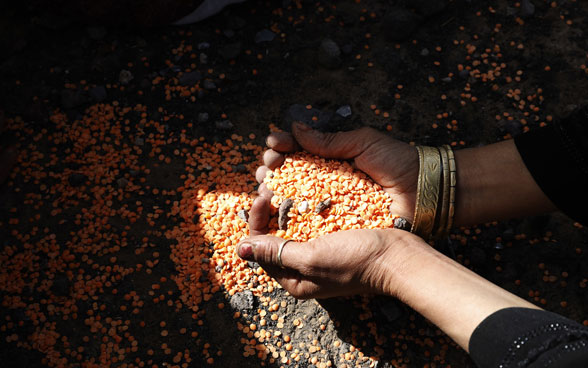
In adopting a resolution in 2018, the Security Council recognised the need to break the vicious cycle of armed conflict and food insecurity. At today's Council briefing on food security, which was organised by the USA, Switzerland underlined three fields of action to prevent famine in the context of armed conflict and violence:
On the one hand, parties to conflicts must mandatorily comply with international humanitarian law. This means, for example, that they must ensure the protection of civilian infrastructure such as markets or supply chains, refrain from mining farmland, provide the civilian population with access to clean water and guarantee unhindered humanitarian aid to those in need.
On the other hand, the fight against impunity of parties to the conflict who use starvation of the civilian population as a method of war must be pushed forward. This has also a preventive effect. Switzerland demands that those responsible for such crimes have to be held more accountable and that justice must be done for the victims of these inhumane crimes. Hauri also took the opportunity to promote the amendment to the Rome Statute initiated and pushed by Switzerland, according to which starvation can be punished as a war crime.
Moreover, food crises in conflict situations often have a female face. Women and girls are the ones who eat last and too little. At the same time, they also actively seek survival strategies and thus contribute to finding solutions. That is why Switzerland stressed in the Council that measures to improve food security should also take into account the gender perspective.
You can’t build sustainable peace on empty stomachs. "Political solutions to conflict must be part of our global approach to eliminating hunger, ensuring access to sufficient and adequate food for all, and promoting resilient, inclusive and sustainable food systems," Hauri stressed in New York.
Statement by Switzerland on Conflicts and Food Security, UN Security Council, 03.08.2023
28.07.2023 – Protection of civilians in UN peacekeeping operations
The protection of civilians is one of the main responsibilities of UN peacekeeping missions. These missions usually operate in difficult contexts, facing a variety of security challenges. These include, for example, unstable conflict dynamics, serious violations of international law, restricted freedom of movement, disinformation or limited resources. On 28 July, the Security Council discussed with the commanders of the peacekeeping missions in South Sudan (UNMISS), Lebanon (UNIFIL) and the Democratic Republic of Congo (MONUSCO) how the missions can address these challenges and improve the protection of civilians on site. "Unfortunately, civilians still represent the vast majority of victims of armed conflict, and their protection is therefore more necessary than ever," emphasised Swiss UN Ambassador Pascale Baeriswyl at the Security Council. The protection of civilians is also a priority for Swiss membership in the Security Council.
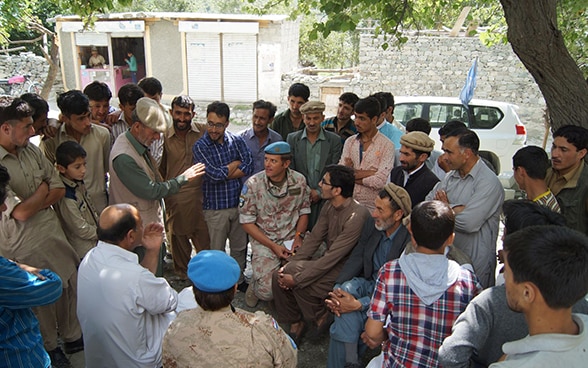
Switzerland emphasised in the Council that UN peacekeeping missions should be less reactive with regard to the protection of civilians and should instead focus on the prevention of violations against civilians. Moreover, it made clear that this protection must also be guaranteed in transitional phases, such as in the case of the upcoming withdrawal of the UN peacekeeping mission in Mali (MINUSMA). "The withdrawal of MINUSMA must under no circumstances lead to a deterioration in the condition of civilians: the Malian government must ensure that the functions previously carried out by the mission in this field are now taken over by itself," Baeriswyl said in New York.
The Swiss Armed Forces are active in peacekeeping missions, as are numerous other countries. Around 280 Swiss troops are deployed. Among other things, the Swiss Armed Forces are supporting the United Nations Mine Action Service (UNMAS) in West Africa in humanitarian demining. In Kosovo, members of the armed forces are contributing to a safe and stable environment and the freedom of movement of the population. Swiss military observers are deployed in the Kashmir region between India and Pakistan. They monitor conflict-affected regions and exchange information with the authorities and the population in order to obtain relevant information for assessing the security situation. Switzerland also has a contingent of up to 20 police officers who serve in UN missions. In 2022, it deployed 16 of them. Their task is to support and train local police personnel in post-conflict transition periods. By doing so, Switzerland is contributing to peacekeeping, the respect of international law, and thus the protection of the civilian population.
18.07.2023 – On 25th anniversary of Rome Statute, Switzerland chairs UN Security Council meeting on the International Criminal Court
The states parties to the Rome Statute gathered on 17 July to commemorate the 25th anniversary of this founding document. They took part in a ministerial panel discussion on the ICC's strategic vision for the next decade. "With the creation of the ICC, an essential element of the multilateral architecture defending the rule of law came into being. The ICC deserves the unfailing support of the international community today, for the next decade and beyond," Corinne Cicéron Bühler assured the audience.
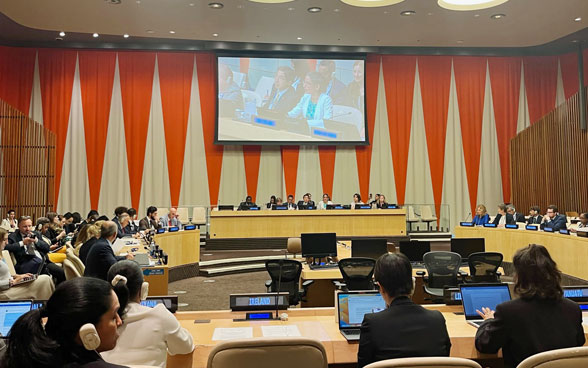
The 25th anniversary of the Rome Statute is an opportunity to celebrate a major achievement by the international community in the fight against impunity. This text established the ICC as an independent judicial body responsible for investigating the most serious crimes: genocide, war crimes, crimes against humanity, and the crime of aggression. The commemorations raise the ICC's profile and help to strengthen the political support necessary for its mandate. The aim of the meeting was also to encourage those who have not yet done so to accede to the Rome Statute and to reflect on its future.
The following day, UN member states discussed the ICC's contribution to maintaining international peace and security. The informal 'Arria formula' meeting on 18 July was chaired by Ambassador Corinne Cicéron Bühler, with the title of state secretary of the FDFA, and Ambassador Kimihiro Ishikane, permanent representative of Japan to the United Nations. It provided a forum for discussing the role and importance of the ICC in the fight against impunity worldwide. The meeting was also an opportunity for states to reaffirm their commitment to the Rome Statute. The president of the Assembly of States Parties, Silvia Fernández de Gurmendi, the executive director of the ICC Trust Fund for Victims, Deborah Ruiz Verduzco, and representatives from academia and civil society presented their visions for the future of the ICC in terms of peace and security.
18.07.2023 – UN Security Council discusses the opportunities and risks of artificial intelligence for international peace and security
Current developments in artificial intelligence (AI) have the potential to transform our societies. The UN Security Council has held a high-level meeting to examine the potential implications of AI for international peace and security. In its statement, Switzerland encourages the safe and responsible use of these new technologies.
The UN Security Council must take account of the impact of new technologies in today's world. For Switzerland, AI can be used, for example, to improve the analysis of conflict situations, aid early warning mechanisms and conflict prevention, and support mediation and peace-building activities. If abused, it could however create additional risks in terms of peace and security. "While it can represent a challenge because of its speed and apparent omniscience, artificial intelligence can and must serve peace," said Pascale Baeriswyl, Switzerland's ambassador to the UN in New York.
In view of the technological progress, Switzerland reiterated that existing international law applies to AI and must be respected. In addition, Switzerland proposed three avenues to minimise the risk of abuse of these new technologies. It began by referring to the need for a common framework shared by all stakeholders in the development and application of this technology. Secondly, any AI must be human-centred and guarantee transparency in terms of how it works and the data used. Finally, Switzerland called on developers and users, both governmental and non-governmental, to assume their responsibilities in ensuring that AI promotes equality and inclusion and combats all forms of discrimination.
Cutting-edge research can help pave the way for the use of artificial intelligence for peace, as illustrated by a prototype of an AI-assisted analysis tool developed by the Swiss Federal Institute of Technology Zurich. Switzerland is also committed to finding solutions, in particular through the Swiss Call for Trust & Transparency, an initiative in which the private sector, academia and diplomacy are working together to seek timely and practical solutions to the risks associated with AI.
17.07.2023 – Switzerland expresses support for Ukraine's recovery process at UN Security Council
At a high-level meeting chaired by the UK foreign secretary and attended by Ukraine's minister of foreign affairs, Switzerland reiterated its support for Ukraine's sovereignty and territorial integrity, in accordance with international law. It also stressed the obligation of all parties to respect international humanitarian law.
Switzerland calls for renewal of Black Sea Grain Initiative
At this meeting, Switzerland emphasised the importance of beginning work on recovery-related matters immediately. The recovery process was launched at the first Ukraine Recovery Conference (URC) in Lugano in July 2022, organised jointly by Switzerland and Ukraine. The URC resulted in the adoption of the Lugano Principles, which all participating countries endorsed. Federal Councillor Ignazio Cassis, who hosted last year's URC, stated unequivocally that the Ukrainian people could continue to count on Switzerland's support at the URC 2023 in London on 22 June for their country's recovery.
The extension of the Black Sea Initiative was another key topic of discussion, with Switzerland launching an urgent appeal for global food security. Switzerland deplores Russia's decision on the Black Sea Grain Initiative and hopes that they will be renewed in the near future. Since it was adopted in July 2022, this initiative has enabled more than 32 million tonnes of food to be exported to 45 countries on three continents. Through its good offices, Switzerland welcomes and supports the tireless efforts of the UN secretary-general and Turkey to find an agreement between the parties and advance this important initiative.
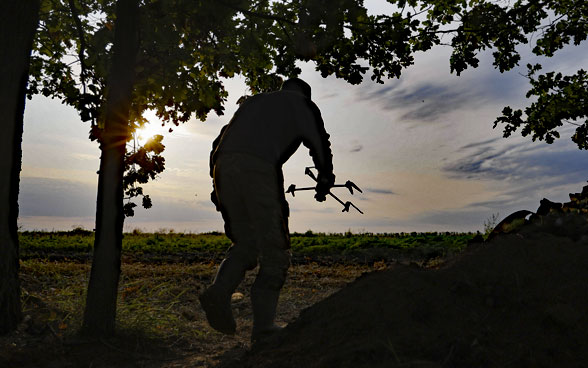
UN Charter: starting point for global, just and sustainable peace
Pascale Baeriswyl, Switzerland's ambassador to the UN in New York also called for the principles of the UN Charter to be upheld as the basis for a just, comprehensive and sustainable peace in Ukraine. "Switzerland is closely following the different peace initiatives for Ukraine, and emphasises that the country's sovereignty and territorial integrity must be respected," she added, referring to various initiatives adopted by the international community.
Switzerland has again expressed its support for the International Criminal Court and for measures and mechanisms aimed at delivering justice for victims and at rebuilding Ukraine, including the register of damage set up by the Council of Europe. Ambassador Baeriswyl also underscored the pressing need for justice at the General Assembly's annual debate on the situation in the temporarily occupied Ukrainian territories on 18 July.
Switzerland supports humanitarian demining
Pascale Baeriswyl also expressed Switzerland's concern about the use of anti-personnel mines and cluster munitions in Ukraine. "As a State party to the Ottawa and Oslo Conventions, Switzerland calls on all States and parties to the conflict not to use these weapons", she told the Council. Switzerland is providing its expertise to support humanitarian demining in Ukraine and has just launched new mine action measures thanks to a supplementary credit approved by Parliament in the 2023 summer session. In 2023, Switzerland will provide at least CHF 15 million to Ukraine for humanitarian mine action.
14.07.2023 – Open debate on sexual violence in conflicts
On 14 July, the UN Security Council held an open debate on the topic of «Conflict-related sexual violence». The year 2023 marks the fifteenth anniversary of Security Council Resolution 1820, which calls for a complete end to sexual violence in conflict and stresses the importance of ending impunity for such violence. Despite the progress made since then to implement this important resolution, sexual violence still affects thousands of people in conflicts every year, particularly women.
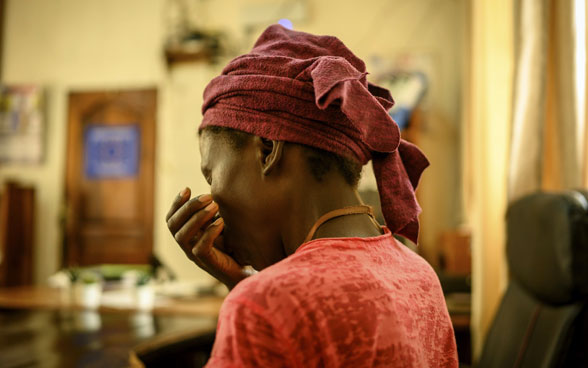
The UN Secretary General's Annual Report 2022 highlights 20 countries in which sexual violence is perpetrated. «Fifteen years after the adoption of Resolution 1820, sexual and gender-based violence in conflict persists, as does impunity. We must fully and sustainably implement the requirements that the Council set itself in this resolution», said Simon Geissbühler, Head of the FDFA’s Peace and Human Rights Division, at the debate organised by the United Kingdom.
Survivor-centred approach
During the open debate, Switzerland stressed that strengthening capacities and expertise of UN missions and national institutions was essential to preventing and deterring such crimes in the future. Furthermore, Switzerland has pointed out that the prevention of sexual violence also requires the inclusion of women in arms control and disarmament processes. The illicit proliferation of small arms and light weapons increases the risk of conflict-related sexual violence.
Switzerland is also in favour of an approach that focuses on survivors and takes their needs into account. «Without protection against sexual violence, there can be no equal participation. And, as we well know, the commitment of women is a precondition for lasting peace», concluded Simon Geissbühler.
14.07.2023 – Switzerland supports the renewal of the BINUH mandate in Haiti
The UN Security Council has unanimously adopted a 12-month renewal of the mandate of the United Nations Integrated Office in Haiti ("BINUH"). Switzerland is in favour of this renewal in light of the increasingly precarious security situation in the country.
Haiti is in the midst of a serious political, security and humanitarian crisis. Numerous gangs control most of the capital Port-au-Prince and are increasingly terrifying the population with murders, kidnappings and rapes. The authorities, for their part, are in a weak position as crimes escalate. The Council meeting took place two years after the assassination of Haitian President Jovenel Moïse in July 2021.
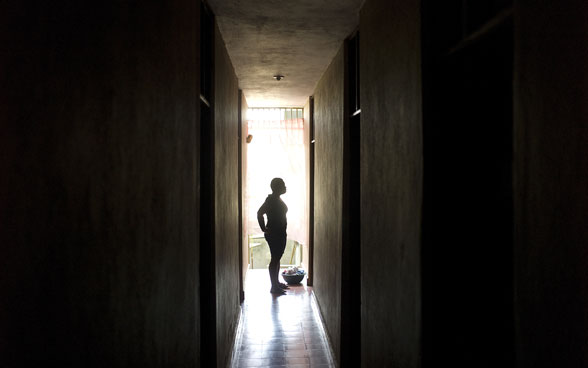
The UN Secretary-General's latest report, published this month, attests to the scale of the crisis. In these difficult circumstances, "the Council must show unity in renewing the mandate of BINUH to enable it to fulfil its mission effectively", asked Pascale Baeriswyl, Switzerland's ambassador to the UN in New York. BINUH's work on the ground is essential, in that it strives to support the Haitian authorities against impunity and to lay the foundations for lasting peace.
11.07.2023 – UN Security Council: extension of UN cross-border aid in Syria vetoed
On 11 July 2023, the UN Security Council was not able to renew the cross-border humanitarian aid mechanism in Syria for the time being. The resolution was vetoed by Russia.
The Council's resolution on cross-border aid has allowed UN agencies humanitarian access to north-western Syria since 2013, via the Turkish-Syrian border crossing Bab al-Hawa. More than four million people are dependent on this aid in this region.
Switzerland and Brazil are co-penholders in the Security Council for Syria's humanitarian dossier. Their draft resolution called for a 9-month extension of the mechanism, based on the analysis and urgent recommendations of the UN Secretary-General, the Under-Secretary-General for Humanitarian Aid and the specialised agencies and organisations active on the ground. The resolution was vetoed by Russia.
In the run-up to the vote, Switzerland advocated a twelve-month extension, an even broader proposal than the current resolution on the cross-border aid mechanism. Due to differing positions within the Council, an extension by nine months was the best possible solution to ensure that people in need receive the vital support they require effectively and without delay.
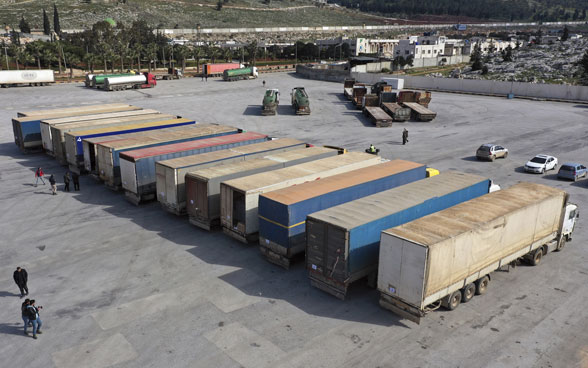
The UN General Assembly will address the issue within 10 days, based on a UN General Assembly resolution of April 2022. According to this resolution, following the exercise of the veto by one or more permanent members of the Security Council, a meeting will be convened to address the situation.
Switzerland regrets the uncertainty this creates for the affected local population. Switzerland stays in contact with all Security Council members and humanitarian actors to facilitate, in a transparent and inclusive way an early compromise that will enable continued cross-border humanitarian access to north-western Syria.
05.07.2023 – More must be done for the well-being of children in armed conflicts
On 5 July, the topic of "Children and Armed Conflict" was at the heart of an open debate of the UN Security Council. The annual report of the UN Secretary-General on this topic was presented. The Council has so far adopted 13 resolutions that provide a framework and important instruments for the protection of children. Since 2005, more than 150,000 children have been liberated from armed groups or forces as a result. But more needs to be done. In 2022, over 27'000 serious violations of children's rights were verified in various armed conflicts. These include killings and mutilations, attacks on schools and hospitals, and denial of humanitarian access. The report includes a list of warring parties that systematically commit such grave violations of children's rights.
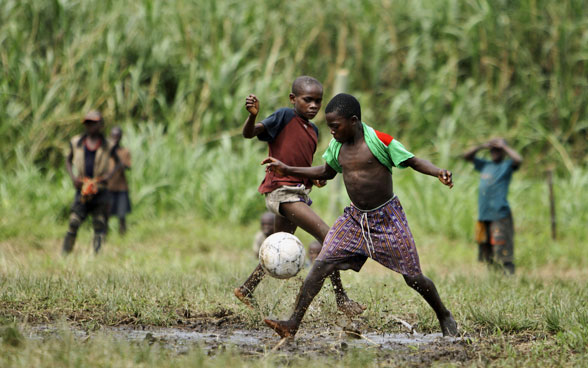
At the open debate, Switzerland underlined areas where progress is needed to better protect children in armed conflicts. First, the instruments developed by the Security Council to strengthen accountability for serious violations of children's rights must be applied in a credible, independent and transparent manner. In this context, for example, the mention of Myanmar's armed forces and the inclusion of Russia's armed forces in the list of the latest report is important. Switzerland also advocated for more measures to monitor and prevent serious violations of children's rights. Second, Switzerland condemned attacks on schools and hospitals as well as their military use. After all, access to education is a cornerstone of sustainable peace. Third, Switzerland stressed the importance of long-term reintegration programmes for children who were formerly associated with armed groups or armed forces. Such programmes would also have to offer economic prospects and address the needs of girls in order to enable sustainable integration of the affected children into civilian life and to prevent recruiting again.
“Children, with their creativity, ambition and recommendations, which we have listened to carefully, can change the world. Or, in the words of Graça Machel: Children are a unifying force capable of bringing people to common ethical grounds," Switzerland's UN Ambassador Pascale Baeriswyl underlined at the open debate in New York.
Statement by Switzerland on "Children and Armed Conflict", UN Security Council, 05.07.2023
20.06.2023 – MINUSCA is central to the protection of civilians in the Central African Republic
Today, the UN Security Council discussed the UN peacekeeping mission in the Central African Republic (MINUSCA). Despite several peace agreements, there is an armed conflict in the country that regularly results in numerous deaths and injuries - including among the civilian population, whose protection is MINUSCA's priority. Over 3 million people are dependent on humanitarian aid in the country.
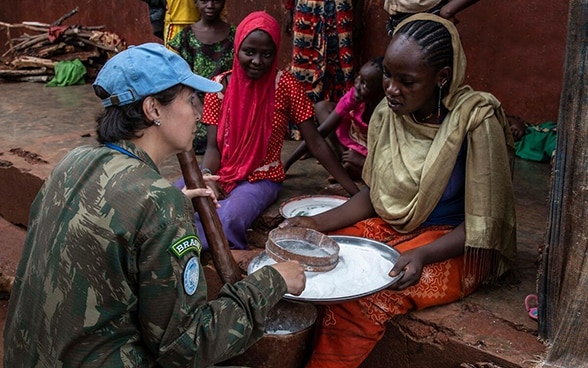
Switzerland underlined at the Council meeting, that the role of women in political processes is central to building sustainable peace in the Central African Republic. Despite improvements in the security situation in some regions, armed groups continue to engage in violence. This hampers humanitarian access and increases the suffering of the population. Their protection must be guaranteed. In addition, the fight against impunity must be stepped up.
Promoting sustainable peace and protecting civilians are priorities for Switzerland in the Security Council and core concerns of its foreign policy. "We cannot consolidate peace in the Central African Republic as long as part of the population continues to be affected by violence on a daily basis. The response to insecurity in the country lies in inclusive political processes, based on international law, guaranteeing women's rights and creating a safe and respectful environment for their participation," said Swiss UN Ambassador Pascale Baeriswyl in New York.
Switzerland is represented through a cooperation office in the capital Bangui since August 2022. Switzerland's engagement on the ground focuses on the protection of the civilian population as well as compliance with international humanitarian law and human rights. Eric Marclay, head of the Swiss representation, addresses in an interview Switzerland's cooperation with MINUSCA and its importance for the people in the Central African Republic.
13.06.2023 – Climate change can increase the vicious circle of tensions and conflicts
FDFA State Secretary Livia Leu represented Switzerland today at an open debate of the UN Security Council organised by the United Arab Emirates. The debate focused on the topic of Climate, Peace and Security. “Addressing climate security" is a priority for Switzerland for its Council membership in 2023 and 2024. In the Security Council, Switzerland informally co-chairs the Group of Experts on Climate and Security, together with the United Arab Emirates and Mozambique.
The effects of climate change, such as droughts, floods and other natural disasters, threaten the livelihoods of people worldwide. This undermines stability and security in many countries and regions. Armed conflicts are prevalent in more than half of the states most affected by climate change. They are the most vulnerable to its consequences. "The most systemic threat to humanity remains climate change," emphasised State Secretary Leu in the Security Council.
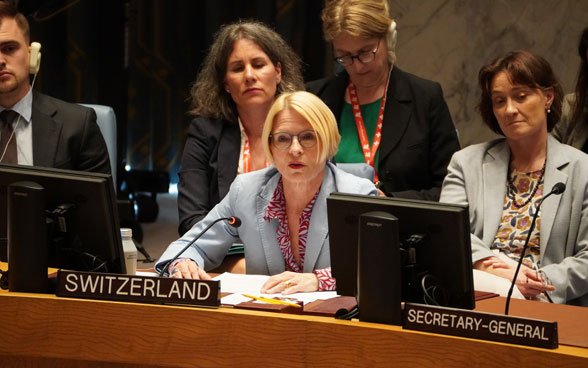
Climate change can exacerbate the vicious cycle of tensions, fragility and conflict. "Climate security is one of the cornerstones of stability. Recognizing the undeniable link between climate change and security is therefore imperative. Our response must be innovative," State Secretary Leu told the Council.
In order to make concrete progress in the field of climate security, Livia Leu emphasised in the Council, on the one hand, the consideration of the effects of climate change in the prevention of conflicts. Science and new technologies have a central role to play here. For example, the use of early warning systems can be used to better anticipate climate-related risks. These combine the best available data on climate change and socio-economic factors to predict, for example, future food insecurity, displacement and conflict dynamics. On the other hand, Leu said that the UN Security Council's peacebuilding measures need to become more climate-sensitive. For example, climate advisors can support UN missions directly on the ground.
"Inaction is not an option. That's why this Council must act on the complex interplay between climate, peace and security. This is the only way to fulfill its mandate: to maintain international peace and security," underlined State Secretary Leu in New York.
Statement by Livia Leu on climate, peace and security, UN Security Council, 13.06.2023
06.06.2023 – Emergency meeting on the destruction of the Nova Kakhovka dam
The UN Security Council met on 6 June for an emergency session to discuss the destruction of the Nova Kakhovka dam in Ukraine. Switzerland expressed its deep concern about these new developments, which place an additional burden on the civilian population marked by Russia's ongoing military aggression. They further increase the burden on the civilian population suffering from Russia's military aggression against Ukraine. UN Secretary-General António Guterres also spoke out yesterday via a media release, stating that the extent of the damage was still difficult to determine, but it was already clear that we are facing a humanitarian, economic and environmental catastrophe".
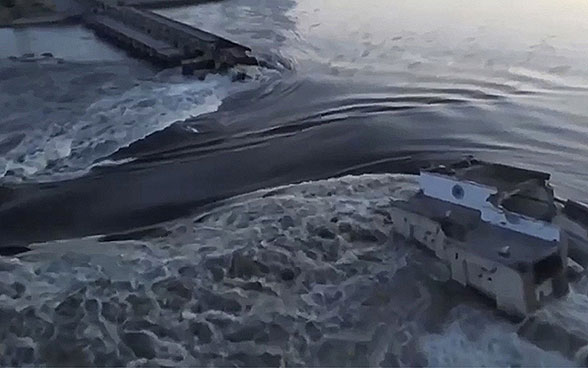
Thousands of people are affected by this disaster. In addition to the devastating short-term consequences in southern Ukraine, serious long-term consequences must also be expected. "Switzerland is concerned about the risks that massive flooding could pose to the environment, as well as to energy and food security, including water supplies," Adrian Dominik Hauri told the Security Council in New York.
This event is a sad example of the connection between water and the protection of civilians, which the UN Security Council, at the request of Switzerland and Mozambique, has already addressed in detail in March 2023. In particular, the fresh water supply in southern Ukraine, including the Crimean peninsula, depends to a large extent on the Nova Kakhovka dam. There are also large agricultural areas in these regions. In this crisis situation, the protection of the civilian population must be paramount, as required by international humanitarian law. The protection of the environment in armed conflicts is also of central importance. Switzerland is ready to fully support the immediate response of the UN and humanitarian partners who, in coordination with the Ukrainian government, are doing everything in their power to provide vital assistance, including ensuring the supply of drinking water. All parties to the conflict are obliged to ensure humanitarian access to all persons in need of assistance.
The Nova Kakhovka dam is also central to the cooling system of Ukraine's Zaporizhzhya nuclear power plant, on which the Security Council recently discussed during Switzerland's presidency under the leadership of Federal Councillor Ignazio Cassis. The "seven pillars" defined by Rafael Grossi, Director General of the International Atomic Energy Agency (IAEA), state, among other things, that the integrity of the plant and logistical supplies must be guaranteed at all times.
In view of the urgency and seriousness of the situation, Switzerland underlined in the Council that attacks on civilian infrastructure are unacceptable. International humanitarian law prohibits attacks on civilian objects and provides special protection for dams. Switzerland calls on all parties to respect international humanitarian law. Once again, Switzerland condemned Russia's military aggression against Ukraine and called on Russia to immediately de-escalate the situation, cease all hostilities and withdraw its troops from Ukrainian territory without delay.
30.05.2023 – Switzerland advocates for the protection of the Zaporizhzhya nuclear power plant
Chaired by Federal Councillor Ignazio Cassis, the UN Security Council discussed on 30 May 2023 the protection of the Zaporizhzhya nuclear power plant in the presence of Ukraine. "We are all aware of the risks to the civilian population when a nuclear power plant is located in a war zone. It is our duty to protect the civilian population," Federal Councillor Cassis said in New York.
At the briefing, IAEA Director General Grossi presented five principles to the Council for the protection of the nuclear power plant in south-eastern Ukraine:
- no attacks of any kind from or against the nuclear power plant;
- no storage or stationing of heavy weapons or military personel at the plant;
- no threat to the offsite power supply;
- protection of all systems necessary for safe operation against attacks or acts of sabotage;
- no action that undermines these principles.
During the meeting, Switzerland reiterated its condemnation of Russia's military aggression against Ukraine and any attacks against civilian infrastructure. Switzerland again called on Russia to withdraw its troops from Ukrainian territory. It welcomed the IAEA's commitment to protecting civilian nuclear facilities in Ukraine and called on all Council members to support the five principles proposed by the IAEA for protecting the Zaporizhzhya nuclear power plant. Federal Councillor Cassis called on Russia and Ukraine in particular to fully implement these five principles.
In consultation with the IAEA and the other Council members, Swiss diplomacy has been working in recent weeks to ensure that the meeting takes place. Switzerland recalled that the protection of the Zaporizhzhya nuclear power plant is a matter of respect for international humanitarian law. Respecting and promoting this law is a priority for Switzerland and a pillar of its Good Offices.
Today's meeting is thematically linked to the Federal Council's priorities for Switzerland's seat on the Security Council. During the presidential month of May, several meetings were chaired by members of the Federal Council. On 3 and 4 May, Federal Councillor Ignazio Cassis chaired an open debate focusing on mutual trust and a meeting on the cooperation between the UN and the Organisation for Security and Cooperation in Europe (OSCE). On 23 May, President Alain Berset emphasised in the Council that the protection of civilians in armed conflict must not only exist on paper, but also be increasingly implemented in practice. For her part, Federal Councillor Viola Amherd chaired a session on the financing of peace missions in Africa on 25 May. Today's session will focus on the protection of civilians from nuclear disasters. With these and other geographical and thematic meetings, the Federal Council is on track in implementing its priorities. Overall, Switzerland draws a positive conclusion from this first Council Presidency.
30.05.2023 – UN Security Council extends mandate of UN Mission for Iraq and sanctions measures in South Sudan
The UN Security Council today extended unanimously the UN Assistance Mission for Iraq (UNAMI). It advises and supports the Iraqi government and people in promoting inclusive political dialogue and reconciliation at the national and local levels, on the electoral process, on dialogue with its neighbours, and on the protection of human rights and judicial and legal reforms.
Today, the UN Security Council also extended the sanctions measures in South Sudan and the mandate of the associated expert panel. Switzerland supported the extension of both mandates in the Security Council.
30.05.2023 – Video: Protecting civilians in the Democratic Republic of Congo
The civilian population pays high a price in armed conflicts. Switzerland's long-standing humanitarian tradition and commitment to international humanitarian law are recognised worldwide. Protecting civilians and persons no longer taking part in hostilities is at the heart of numerous conflicts worldwide on the agenda of the Security Council. In the video, Laura Reymond-Joubin, Human Security Advisor, explains what she is doing to protect civilians in the Democratic Republic of Congo.
25.05.2023 – Federal Councillor Amherd chairs Council meeting on sustainable funding for African Union peace support missions
Federal Councillor Viola Amherd chaired a meeting of the UN Security Council on 25 May to mark Africa Day and the 75th anniversary of UN peacekeeping. In 1948, the UN Security Council mandated the first peacekeeping mission, UNTSO, to monitor the ceasefire in the Middle East. In addition to UN peacekeeping missions, the Security Council also authorises operations by regional organisations. Today's meeting focused on predictable, sustainable and flexible funding for African Union (AU) peace support missions.
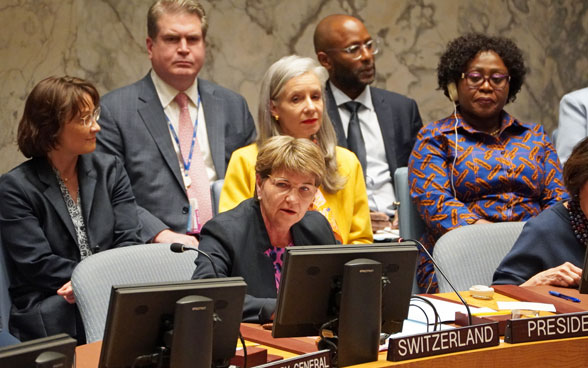
Numerous conflicts are being fought on the African continent. The AU, as the regional organisation of the continent's states, is therefore of particular importance. It is the key organisation for peace and security issues in Africa and is thus also an important partner of the UN. "Switzerland welcomes this important contribution. We intend to use our mandate in the Council to work even more closely with Africa and the AU and to continue our long-standing support for the peace and security architecture on this continent," said Federal Councillor Viola Amherd in the Security Council.
Switzerland supports the initiative of the African members in the UN Security Council for a new Council decision aiming at predictable, sustainable and flexible funding for AU missions. This would be a decisive step for the future of peace operations. Switzerland will make a constructive contribution to this in the Security Council.
Speech by Federal Councillor Viola Amherd, UN Security Council, 25.05.2023
23.05.2023 – Open debate on the protection of civilians in armed conflicts led by the President of the Swiss Confederation Alain Berset
On Tuesday, 23 May, as part of Switzerland’s presidency of the UN Security Council, President Alain Berset chaired an open debate on the protection of civilians in armed conflict. “We have the legal, political and operational instruments to protect civilians from armed conflict”, said President Berset, referring to the unanimously adopted resolutions of 2018 and 2021 on food security and the protection of civilian infrastructure. Such instruments would have to be better applied by the Security Council and all UN member states in future. Speaking on Switzerland’s behalf, Mr Berset suggested five ways in which this could be achieved, while stressing that political will was crucial.
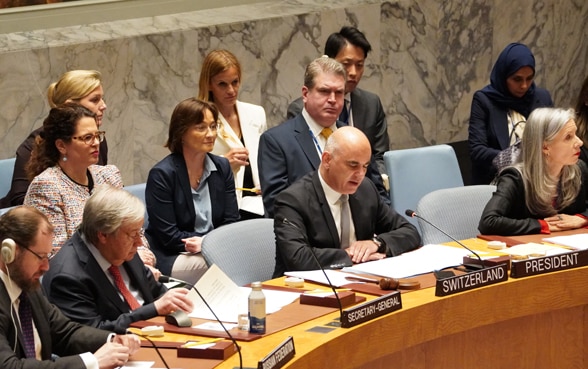
The five points include, firstly, ending attacks on supplies of essential goods. Second, assuring full, rapid, safe and unimpeded humanitarian access to all those in need. Third, parties to the conflict that use the starvation of civilians as an instrument of war must be held accountable. Fourth, Switzerland calls for the full inclusion of women in all processes to protect the civilian population. And fifth, the civilian population must remain well protected when UN peace missions withdraw.
More lives are lost in armed conflicts as a result of shortages of essential goods and services such as water, food and access to healthcare than through the direct effects of hostilities. Those taking part in the open debate included members of the UN Security Council and representatives of other states, as well as UN Secretary-General António Guterres, the president of the International Committee of the Red Cross (ICRC), Mirjana Spoljaric Egger, and a civil society representative from West Africa. The debate highlighted the importance of international humanitarian law in armed conflicts, an issue that Switzerland, as depositary state of the Geneva Conventions and host state of the ICRC, has long been strongly committed to.
18.05.2023 – Iraq: Addressing the consequences of climate change to promote security
At the end of May, the UN Security Council will vote on extending the mandate of the UN Assistance Mission for Iraq (UNAMI). After decades of insecurity, slow reconstruction after the Gulf War and the presence of the Islamic State, which was pushed back in 2017, positive developments have been seen in Iraq in recent years. As of 2018, reconstruction was underway. The number of internally displaced people has dropped from 5 million to 1.2 million. Nevertheless, Iraq remains politically and confessionally divided. UNAMI is doing important work to secure Iraq's future as a stable state in which all of society - especially women and girls - participate equally without discrimination.
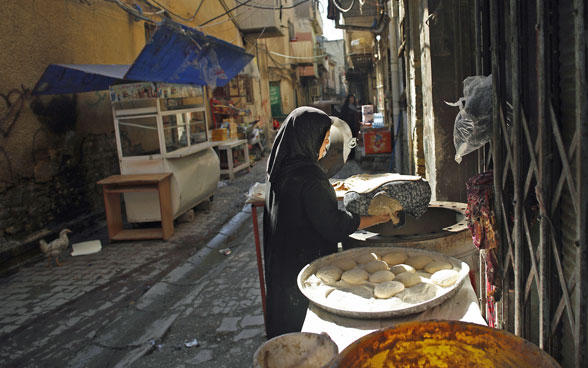
Switzerland welcomes the Iraqi government's efforts and reforms to fight corruption, protect human rights and mitigate the effects of climate change. "Indeed, climate change is a destabilizing factor in Iraq. It is contributing to droughts and water scarcity, with serious consequences for agriculture and livelihoods, which increase the threat of social unrest and internal displacement. Every measure aimed at mitigating the effects of climate change also serves the purpose of prevention," said Swiss UN Ambassador Pascale Baeriswyl at the UN Security Council on 18 May. Switzerland is committed to maintaining or strengthening the climate change aspects of UNAMI's mandate. In addition, Switzerland stressed that the protection of minorities and those in need of protection is central to social cohesion and national reconciliation among different ethnic groups.
UNAMI is a civilian assistance mission that was created in 2003 at the request of Iraq by a decision of the UN Security Council. In 2007, the mission's role was strengthened. It advises and supports the Iraqi government and people in promoting inclusive political dialogue and reconciliation at the national and local levels, on the electoral process, on dialogue with its neighbours, and on the protection of human rights and judicial and legal reforms.
Statement by Switzerland on the situation in Iraq, UN Security Council, 18.05.2023
17.05.2023 – Video: Addressing climate security in the Horn of Africa
This week, we are focusing on the priority of "addressing climate security" for Switzerland's membership in the UN Security Council. Climate change also threatens peace and international security. Rising temperatures or droughts can, for example, cause food price fluctuations and fiercer competition for natural resources, make livelihoods more insecure and displace people. Climate change is a risk multiplier with the potential to exacerbate existing political, social, economic and ecological stress factors. The most vulnerable population groups are usually the most exposed to climate risks. Switzerland also has the expertise and know-how necessary to mitigate climate-related risks in this area.
The Horn of Africa is one of the most fragile regions in the world. Armed conflicts, but also the consequences of climate change, have far-reaching consequences for the civilian population. These include food security and access to basic services such as health care. Find out what Switzerland is doing on site in the video.
11.05.2023 – 129 states set an example for responsible action in the case of war crimes
During Switzerland's presidency of the UN Security Council, the ACT Group, which advocates for an effective UN, celebrated its tenth anniversary.
Within the group, Switzerland has promoted a code of conduct by which states voluntarily commit themselves not to vote against resolutions in the UN Security Council aimed at preventing or ending war crimes and crimes against humanity. 129 UN members or observers have signed it to date. This is a strong signal to the Council and should strengthen its effectiveness – a priority for Switzerland for its Council membership.
Article: 129 states set an example for responsible action in the case of war crimes
10.05.2023 – Promoting unity in Bosnia and Herzegovina is central to sustainable peace and security
In a debate on 10 May 2023, the UN Security Council addressed the situation in Bosnia and Herzegovina. Switzerland has been involved on the ground for over 30 years. More than 60,000 people from Bosnia and Herzegovina live in Switzerland today. "Our countries are closely linked. We contribute to lasting peace, security, prosperity and good governance in the country," said Swiss UN Ambassador Pascale Baeriswyl in the Security Council. She also recalled the important work of the peacekeeping mission EUFOR Althea in Bosnia and Herzegovina, which contributes significantly to securing peace in a region where tensions are once again on the rise.

Almost 30 years after the war, the broader society in Bosnia and Herzegovina still faces challenges that are deeply rooted and require lasting solutions. Despite certain positive developments in the field of human rights, hate speech and the reinterpretation of historical events persist. "We urge to refrain from any rhetoric of discord," Baeriswyl underlined in New York. To overcome these challenges, the promotion of the countries’ unity through fostering respect for the diversity and fundamental freedoms of the people is key. To this end, all political actors must work hand in hand to serve the interest of the entire population. In this context, the participation of women and youth in political decision-making processes is central as it benefits the reconciliation process and society in general. In addition, the rights of minorities must be protected and the freedom of the media and assembly guaranteed and strengthened.
The Balkan state has officially been a candidate for EU membership since December 2022. "Switzerland will continue to support Bosnia and Herzegovina on its European path. We support the sovereignty and territorial integrity of Bosnia and Herzegovina and its peaceful and multi-ethnic future," said Pascale Baeriswyl in the Council.
Statement by Switzerland on the situation in Bosnia and Herzegovina
04.05.2023 – Federal Councillor Cassis chairs briefing on UN-OSCE cooperation
On 4 May 2023, Federal Councillor Ignazio Cassis chaired the annual UN Security Council briefing on cooperation between the UN and the Organisation for Security and Cooperation in Europe (OSCE). At this meeting, the current OSCE Chairperson-in-Office Bujar Osmani, Foreign Minister of Northern Macedonia, briefed the Council on the OSCE’s priorities and activities. The UN Charter recognises the importance of cooperation between the UN and the various regional organisations, including the African Union, the League of Arab States and the European Union. In May, the UN and the OSCE celebrate the 30th anniversary of their cooperation, which was sealed with the signing of an agreement in 1993. Russia's military aggression against Ukraine represents the greatest challenge in the history of the OSCE. Against this backdrop, the leitmotif chosen by the current OSCE Chairmanship, "It’s About People", is more relevant than ever. "Our primary responsibility is to protect the civilian population. This responsibility is the essence of the link between the OSCE and the United Nations," Federal Councillor Cassis underlined in the Security Council.
The OSCE is the largest regional security organisation in the world. Its presence in 13 countries has a stabilising effect in regions such as the Western Balkans, the Caucasus or Central Asia. The OSCE has mechanisms to document violations of human rights and international humanitarian law. It also does important work to counter the negative effects of climate change in the region, for example in the sustainable management of water resources. "We must not allow the future of Europe to be decided by the law of force. Switzerland is committed to holding the force of law against this. It is up to all of us to preserve the OSCE's capacity for action," Federal Councillor Cassis highlighted in New York. For the OSCE should remain central to the promotion of dialogue and the peaceful resolution of conflicts in Europe.
Speech by Ignazio Cassis - Briefing OSCE, UN Security Council, 04.05.2023
03.05.2023 – Federal Councillor Cassis calls for mutual trust for peace and security
On 3 May, as President of the UN Security Council, Switzerland organised an open debate in which it highlighted its priority of "promoting sustainable peace". Mutual trust and strong focused multilateralism are central to finding solutions to global challenges such as climate change, pandemics, world economic crises and last but not least peace and security. "The multilateral system is under strain, but it has not failed. The time has come to optimise our instruments to restore trust and secure lasting peace," said Federal Councillor Ignazio Cassis, who chaired the Council debate.
The head of the FDFA highlighted the ways in which multilateralism can offer added value. First, a normative framework respected by all strengthens predictability, which, in contrast to arbitrariness, fosters mutual trust. Second, peacebuilding should take an inclusive approach. Third, trust must be underpinned by scientifically sound facts. "Science and new technologies offer us the opportunity to better anticipate and understand the risks of today and the opportunities of tomorrow. We must respond to the challenges of the 21st century with 21st century answers," said Ignazio Cassis in New York. It is also important to use this knowledge to prevent conflicts and secure peace. "Today's debate is an opportunity to gather ideas from UN member states and to use the synergies that unite us. Trust is won through deeds, not intentions," Federal Councillor Cassis underlined during the debate.
01.05.2023 – Sustainable peace based on trust
On 3 May, Federal Councillor Ignazio Cassis will preside over the first flagship event organised by Switzerland at the UN Security Council. The Security Council's debate will be held under the banner 'Futureproofing Trust for Sustaining Peace' to advance one of the Swiss priorities in the Council, 'building sustainable peace'.
The aim of the debate is to review and strengthen the Security Council's confidence-building approaches and instruments in order to build sustainable peace in the face of current and future challenges.
27.04.2023 – UN Security Council condemns ban on women working for the United Nations in Afghanistan
Today, the UN Security Council unanimously adopted a resolution condemning the Taliban's decision to ban Afghan women from working for the UN in Afghanistan. These decisions have a devastating impact on a large part of the population and constitute a serious obstacle to a united, peaceful, prosperous and inclusive Afghanistan. This new work ban affects the ability of the UN Assistance Mission in Afghanistan (UNAMA) to fulfil its mandate, which was extended by the Security Council for 12 months on 16 March 2023.
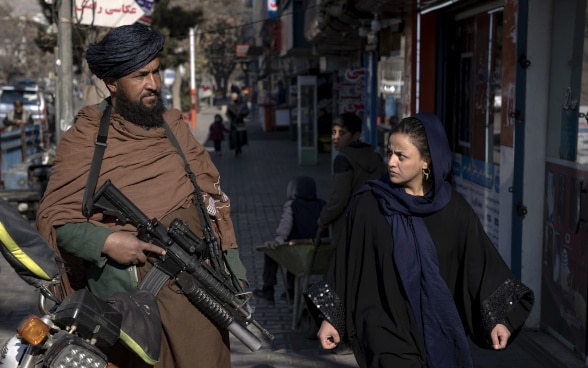
Switzerland voted in favour of the resolution in the Security Council. The resolution is a clear signal from the Security Council in this alarming situation and calls on the Taliban to lift their decrees. The ban is a violation of the UN Charter and women's rights, hinders humanitarian aid and the social and economic development of the country.
The entire Afghan society, especially women and girls as well as ethnic minorities, must be able to participate in public life without fear of reprisals. This is indispensable for the urgently needed development as well as for a lasting peace in Afghanistan.
27.04.2023 – The future of Kosovo is close to Switzerland's heart
Today, for the first time since joining the Security Council, Switzerland pronounced itself on the report of the UN mission UNMIK and the situation in Kosovo. The people who came to Switzerland from the Western Balkans over 20 years ago are now an important part of Swiss society. "The future of Kosovo, its people as well as a lasting peace in the Western Balkans are close to our hearts," said Swiss UN Ambassador Pascale Baeriswyl at the Security Council in New York.
Switzerland is committed to peaceful and multi-ethnic societies in Kosovo and throughout the Western Balkans that respect human rights and the rule of law. "Peaceful coexistence can only be achieved through honest, constructive, and inclusive dialogue," Baeriswyl emphasised. This also includes the equal and effective participation of women. Cooperation between Kosovo and international actors on the ground has borne fruit. Kosovo has been able to achieve success in the fight against corruption and organised crime, for example.
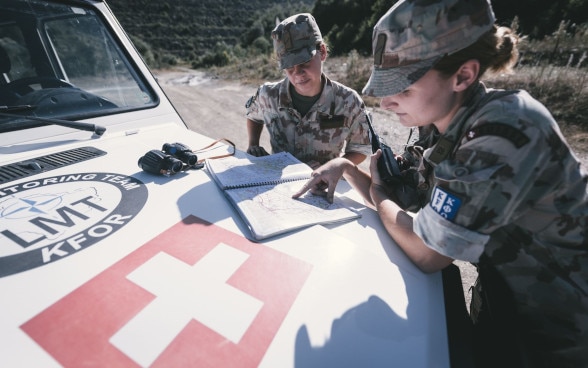
The agreement on the path towards normalisation of relations between Kosovo and Serbia is a welcome achievement. Now it's time to build on this positive momentum and fully implement the commitments made. The security situation, especially in northern Kosovo, remains tense. Switzerland deplores actions and statements that lead to further tensions and calls on the parties to strive for reconciliation and lasting peace. It condemns inter-ethnic incidents in Kosovo, which are an obstacle to building trust. In this context, the Kosovo Force (KFOR), to which Switzerland also contributes a military contingent, continues to play an important role as guarantor of a stable and secure environment in Kosovo.
Statement by Switzerland in the UN Security Council on the situation in Kosovo
24.04.2024 – Open debate on multilateralism day
During an open debate on 24 April, the UN Security Council discussed the effectiveness of multilateralism. Especially in a time of multiple crises, multilateralism needs to be strengthened and focused. The international community should ensure, that its efforts are concentrated on the major issues that cannot be solved in isolation, such as climate change, pandemics or extreme poverty; the world economic crises or the threat of war.
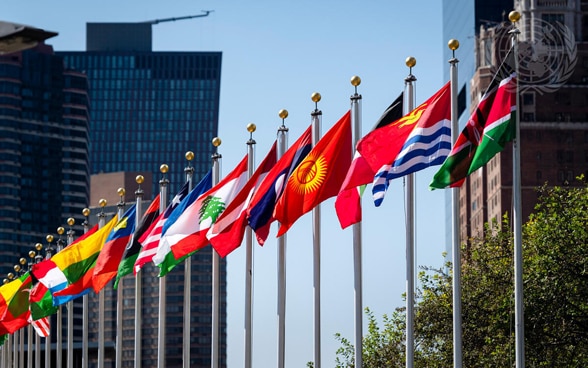
The UN Charter, adopted shortly after the end of the Second World War in June 1945, is the basis of the multilateral system. Territorial expansion by force – formerly a privilege of the great military powers and a legitimate means of foreign policy – was prohibited by the Charter. "Switzerland is convinced that effective multilateralism remains the only way to achieve the vision of a peaceful and just world. A world where the rule of law prevails and not the law of the strongest and where human dignity is always respected. A world in which, finally, the entire population benefits from social and economic progress", said Swiss UN Ambassador Pascale Baeriswyl in New York.
However, the impact of the UN Charter is only as great as the will of the international community to implement it. All too often, this will is lacking. The principles of the Charter are not a menu from which we can pick and choose. "We call for unconditional respect for international law by all actors in all circumstances. And we call for the courage to finally and seriously engage in reforms of the multilateral system, including this Council, in order to restore confidence in and within that system", Baeriswyl underlined at the Security Council.
18.04.2023 – Outlook for Switzerland's Presidency of the UN Security Council
In May 2023, Switzerland will hold the presidency of the UN Security Council. This role is bound by rules. Its primary purpose is to ensure that Security Council business runs smoothly so that the council can take decisions. The members of the Security Council assume the presidency in turn, in the English alphabetical order of the names of the member states.
In this capacity, the country holding the presidency of the Security Council chairs meetings and, if necessary, represents the council externally and before other UN bodies such as the General Assembly. Switzerland's one-month presidency will allow it to focus on its thematic priorities for its 2023–24 membership and to give impetus to the Security Council's work.
Article: Switzerland's presidency of the UN Security Council
30.03.2023 – "Silencing the Guns in Africa" initiative: fewer weapons, strong institutions, dialogue and inclusion of the consequences of climate change
In an open debate on 30 March, the UN Security Council discussed the "Silencing the Guns in Africa" initiative of the African Union (AU) – an association of African states. The initiative aims to end war, conflicts and gender-based violence on the African continent.
Switzerland supports efforts to achieve sustainable peace in Africa. The initiative is ambitious and faces numerous challenges. "Unfortunately, as in other parts of the world, weapons are still not silent in Africa. The illicit proliferation of small arms and light weapons and their ammunition continues to spur violence, threaten peace, tear apart the social fabric and hinder development," said Swiss Deputy UN Ambassador, Adrian Hauri, at the UN Security Council.
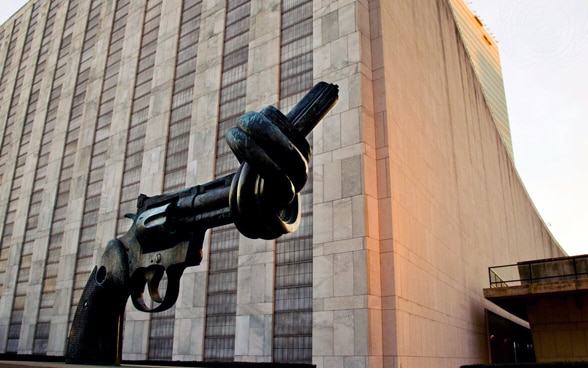
Against this background, Switzerland underlined four areas in the Council that can contribute to the success of "Silencing the Guns". First, the supply of and demand for weapons must be reduced. The consideration of political, economic and social factors, as well as respect for international law, are central to the prevention of violence and conflict. Second, local institutions must be strengthened so that they can provide sustainable public services, which strengthens the population's trust in state structures. Third, the link between climate change and conflict should be considered in all humanitarian and peace policy activities as well as in development cooperation. There is an urgent need for affected states to reduce their vulnerability to climate shocks in order to contribute to peace and security. Fourth, dialogue between conflict parties is central to defusing tensions before violence erupts and resolving existing conflicts. Such dialogue should systematically involve women and youth. In line with its tradition of engaging in mediation and good offices, Switzerland remains committed to providing platforms for dialogue.
"The weapons will not be silent as long as they are easier to obtain than a job or an apprenticeship. Our peace efforts must go hand in hand with confidence-building measures, the strengthening of institutions and the rule of law, the promotion of social cohesion, respect for human rights and international humanitarian law, and the creation of economic prospects, especially for young people," Hauri stressed in New York.
Statement by Switzerland at the UN Security Council: "Silencing the Guns in Africa", 30.03.2023
27.03.2023 – Nord Stream Investigations
On 26 September 2022, the Nord Stream 1 and Nord Stream 2 gas pipelines were damaged by several explosive devices. The motive and authorship of the acts of sabotage remain unknown. On 27 March 2023, the UN Security Council rejected a resolution tabled by Russia calling for a UN investigation into the authorship of the acts of sabotage.
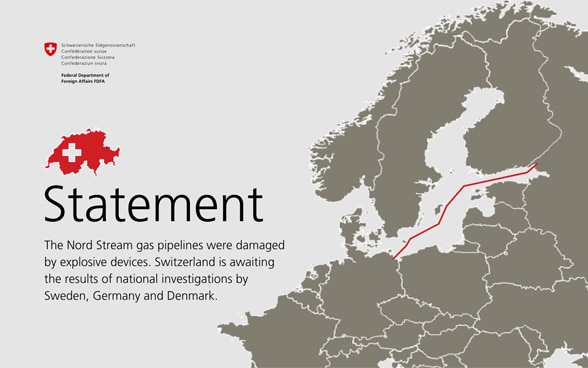
In principle, UN investigations can add value, for example in the absence of credible national investigations by competent authorities. In this specific case, investigations by Denmark, Germany and Sweden are already under way. Switzerland considers it more appropriate to await the results of these investigations, while at the same time calling for a rapid clarification of the acts of sabotage. Switzerland has therefore abstained from voting.
22.03.2023 – Access to water must be guaranteed at all times, even in times of war
At the initiative of Switzerland and Mozambique – both elected members of the Council – the UN Security Council held an informal meeting on 22 March on the occasion of the World Water Day to discuss the protection of access to water and sanitation infrastructure in armed conflicts. This protection is a central pillar for the protection of civilians in armed conflicts.
"Water is essential to all life on earth and access to water is a fundamental right. It must be guaranteed at all times, including in times of war", stressed Christian Frutiger, Deputy Director-General and Head of the SDC's Thematic Cooperation Division, representing Federal Councillor Cassis, at the Security Council. Despite existing obligations under international humanitarian law, which is also reflected in several Security Council resolutions, water facilities continue to be destroyed or damaged in armed conflicts.
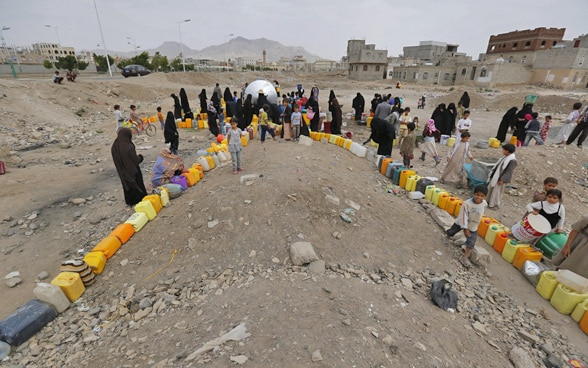
Today, some two billion people are at risk of water scarcity as a result of conflict. This not only results in a lack of water for people and agriculture, but also the spread of infectious diseases such as cholera due to poor hygiene. This is why Switzerland emphasised in the Council, that international humanitarian law must be respected and enforced everywhere and without fail. International humanitarian law fundamentally protects water infrastructure as a civilian object. It also prohibits attacking, destroying and rendering useless goods that are essential for the survival of the civilian population, such as drinking water supply facilities, water supplies and irrigation systems.
A functioning water infrastructure is also central to the consolidation of sustainable peace after hostilities. The absence of such structures prevents the resumption of economic and social activities in areas already severely affected by the war. This can result in a perpetuation of instability and a heightened risk that old tensions will flare up again. The meeting also highlighted the negative impact of climate change as an factor that further compounds the protection of water services and infrastructure in armed conflicts. This is why Switzerland also focused on the importance of prevention, reconstruction and the support of the international community for conflict-affected states and regions in its statement to the Security Council.
"The current challenges in terms of access, management and governance of water are manyfold and require multilateral solutions", Frutiger emphasised in New York. This is why Switzerland is committed to the permanent inclusion of this topic in the priorities of the UN.
Statement by Switzerland on the protection of access to water and sanitation in armed conflicts
Newsticker: Swiss participation at the UN Water Conference, 22-24 March 2023
16.03.2023 – UN Security Council extends UN Assistance Mission in Afghanistan
On 16 March, the UN Security Council unanimously extended the mandate of the United Nations Assistance Mission in Afghanistan (UNAMA) for 12 months. As an elected member of the Council, Switzerland voted in favour of this resolution. UNAMA provides humanitarian assistance and good offices in Afghanistan, promotes and protects human rights, supports gender equality, and protects children affected by armed conflict. The mission is also mandated to promote development and governance in Afghanistan, including the rule of law. These are all issues that lie at the centre of Swiss foreign policy. On the ground, Switzerland is working with partner organisations such as the UN, the ICRC and NGOs to reduce human suffering.
The Security Council also unanimously adopted a resolution mandating an independent assessment of the situation in Afghanistan to ensure a coherent approach by political, humanitarian and development actors. A common political strategy is particularly important given the gravity of the situation. Switzerland expects the voices of women and civil society to be taken into account during this assessment.
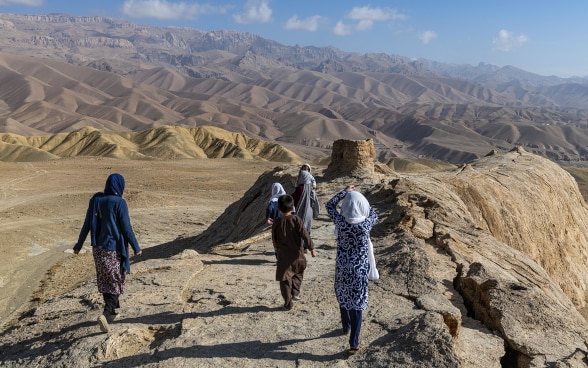
Afghanistan is confronted with numerous, mutually reinforcing crises that have plunged the country into deep insecurity. The fall of the government in summer 2021 has led to the further deterioration of the situation – especially for women and girls. The list of incidents of violence against women and girls is long. It includes murder, honour killings and forced marriages, among others. Their access to education and work is virtually non-existent, especially since the decrees imposed by the Taliban at the end of 2022, which further restrict the rights of women and girls. Switzerland is calling on the Taliban to reverse these decrees.
Switzerland welcomes the renewal of UNAMA's mandate, as its activities are vital for the Afghan people. Two thematic areas are central to Switzerland: On the one hand, the whole of Afghan society, especially women and girls as well as ethnic minorities, must be able to participate in public life without fear of reprisals. This is essential for economic and social development as well as for lasting peace in Afghanistan. On the other hand, the plight of the civilian population is immense. More than 28 million people in the country are dependent on humanitarian aid for their survival. What is needed are not only quick but also long-term solutions, especially for food insecurity. To ensure that these efforts are successful, the Taliban must recognise the key role of women in Afghan society, economy and politics.
Swiss statement in the UN Security Council on the situation in Afghanistan
15.03.2023 – Fragile peace in South Sudan: UN Security Council extends mandate of peacekeeping mission
On 15 March, the UN Security Council extended the mandate of the UN Mission in South Sudan (UNMISS) for another year by resolution. In the Security Council, Switzerland supported the renewal of the Mandate to ensure that the mission continues to be equipped for the challenges that lie ahead in the country. The mandate is in line with Switzerland’s priorities for the Council membership - namely protecting civilians, promoting sustainable peace and addressing climate security. After decades of conflict, South Sudan gained independence from Sudan in 2011. When the new government collapsed in 2013, the young state fell into a spiral of civil war, which ended at the national level in 2018 with a peace agreement. Hundreds of thousands of people fell victim to the war and millions were displaced, over half of them women and children.
But the peace is fragile. The implementation of the peace agreement is slow. The formation of a transitional government in February 2020 only slightly accelerated this process. At the sub-national level, violence unfortunately remains a daily occurrence. "In order to reduce violence and strengthen peaceful coexistence, peace dialogues among the population are essential. In recent years, Switzerland has worked with the South Sudan Council of Churches to support such dialogue processes. UNMISS also promotes such dialogue," Swiss UN Ambassador Pascale Baeriswyl mentioned at the UN Security Council. Next year, elections and the end of the transition period are coming up, which will bring further challenges.
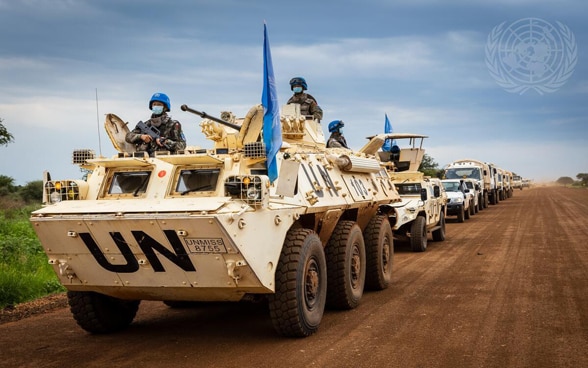
Driven by conflict and severe food insecurity, the country is facing a massive humanitarian crisis. "This crisis is exacerbated by the impact of climate change, which further compounds the effects of the conflict. We encourage the South Sudanese government to address these challenges with the support of UNMISS," Baeriswyl underlined in New York. This is why, during the negotiations on the mandate, Switzerland also advocated for the UN Secretary-General to include a reference to the risks associated with the effects of climate change in his report on UNMISS to the Security Council. The mandate also now mentions the UNs goal of increasing the use of renewable energies in peace missions in order to ensure the responsible use of natural resources. As co-chair of the Council's informal expert group on climate and security, Switzerland also advocates for this issue at a broader level.
The tasks of UNMISS include the protection of civilians, logistical support for humanitarian aid, support for the implementation of the peace agreement, the promotion of international humanitarian law and the strengthening of human rights. 2023 will be an important year to prepare for the end of the transition phase.
07.03.2023 – Women play a key role in achieving sustainable peace
President Alain Berset also addressed the UN Security Council for the first time on 7 March as part of his participation in the 67th session of the UN Commission on the Status of Women (CSW). The topic of "Women, Peace and Security" was at the centre of the open debate of the Council. The President of the Confederation underlined the importance of women's participation in political decision-making and peace processes. In reference to his recent trip to Mozambique in February 2023, he said: "Women are committed to peace, both in their communities and at the national level. They contribute to building a just and equal political and economic future for their country."
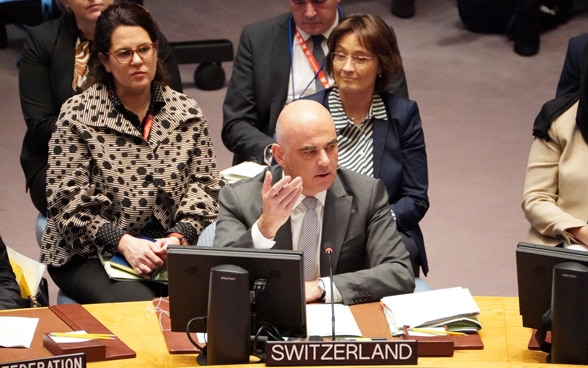
The agenda "Women, Peace and Security" was adopted by the UN Security Council in 2000: Resolution 1325 and its follow-up resolutions recognise the role of women in all efforts to achieve lasting peace and call for the protection of women's rights. Nevertheless, women often continue to be the first targets of violence, hate speech, threats, retaliation and sexual assault in conflict situations - such incidents are also increasingly taking place in the virtual space.
The implementation of the agenda still needs to be strengthened across the globe. Berset called on the Council to take concrete action to address these challenges: "Words must now be matched with concrete actions in terms of budget, personnel and policy. This is a prerequisite for women to be able to speak out and contribute to sustainable peace - safely, freely and without fear of reprisals."
24.02.2023 – UN Security Council: Ignazio Cassis calls for respect of Geneva Conventions and withdrawal of Russian forces from Ukraine
Federal Councillor Ignazio Cassis, head of the FDFA, took part in a high-level UN Security Council debate in New York on 24 February 2023. Mr Cassis called for the withdrawal of Russia's armed forces present on Ukraine's sovereign territory for a year and for respect of the Geneva Conventions. He also underscored Switzerland's commitment to a peaceful resolution of the conflict.
"After a year of war, we must combine our strengths, ideas and resources to restore a sense of security in Europe and ensure a return to a comprehensive, just and lasting peace in Ukraine," said Mr Cassis before the Security Council.
As a permanently neutral country, Switzerland fully respects its obligations under the law of neutrality. It does not favour any of the belligerents militarily. Still, as Mr Cassis recalled, "neutrality does not mean indifference to violations of international law". He stressed that "Switzerland stands ready to bring all parties to the table in order to bolster respect for international humanitarian law and ultimately achieve peace."
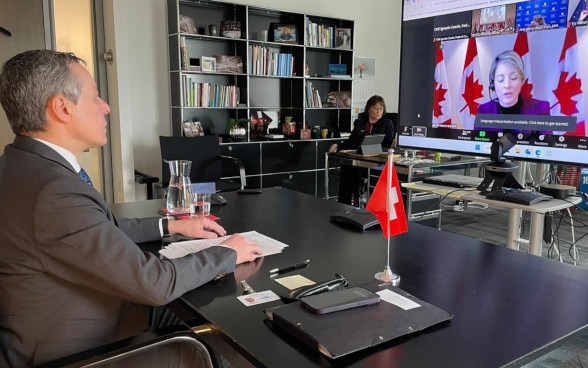
23.02.2023 – UN General Assembly: Ignazio Cassis condemns Russian aggression and calls for path to lasting peace in Ukraine
Mr Cassis is at the United Nations headquarters in New York this weekend, one year after the outbreak of the war in Ukraine. He is taking part in an emergency special session of the General Assembly, as well as in a Security Council debate. This serves as an occasion for him to reiterate Switzerland's strong condemnation of the Russian aggression against Ukraine, still under way, and to call for an immediate end to the conflict and the withdrawal of Russian troops from Ukraine's sovereign territory.
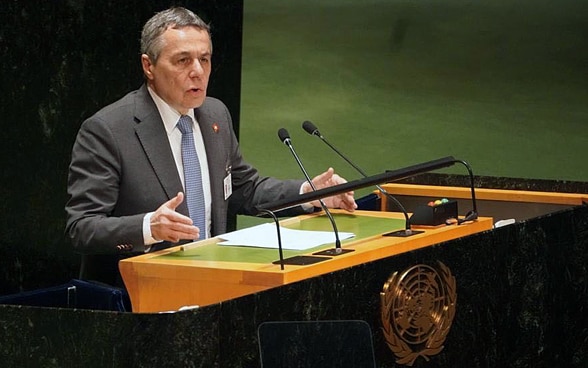
The UN General Assembly adopted a resolution by a large majority (141 votes), with Mr Cassis in attendance. The resolution calls on states and international organisations to strengthen their support for diplomatic efforts to achieve a comprehensive, just and lasting peace in Ukraine in keeping with the UN Charter, and on Russia to withdraw its troops from Ukrainian territory.
"With today's resolution, we are sending out a strong message of peace and respect for the principles that unite us," said Mr Cassis before the General Assembly. The new text calls on UN member states and international organisations to strengthen their support for peace. For Mr Cassis, who stressed his appeal to the entire international community "to work hand in hand towards a peaceful settlement of this conflict," it is a clear signal from the international community to Russia.
14.02.2023 – Rising sea levels threaten world peace and security
"The facts are clear: our planet is getting warmer, causing water levels to rise and glaciers to melt. Switzerland is at the forefront of the latter phenomenon" said Thomas Gürber, FDFA deputy state secretary and head of the UN division at a meeting at the UN Security Council. Malta, which chairs the Security Council in February 2023, organised the debate.
Rising water levels and more frequent flooding due to climate change threaten infrastructure in coastal areas. In addition, agricultural production, food security and habitat are threatened by soil erosion and salinisation. As a result, some regions become uninhabitable, forcing millions of people to leave their region or country. This issue challenges the entire UN system and thus also the Security Council. "The Security Council has a key role to play. It must face one of the greatest contemporary risks for humanity," Thomas Gürber underlined.
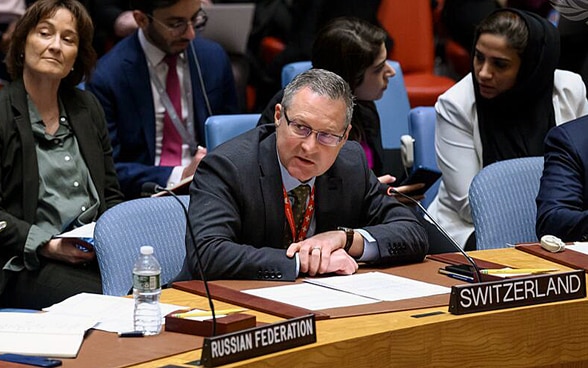
Displacements caused by rising sea levels have the potential to exacerbate conflicts between communities. Switzerland is working within the UN Security Council to counteract the negative effects of climate change on global peace and security. The deputy state secretary called on the Council increase the integration of the effects of climate change into its activities and into the mandates of peacekeeping missions.
"The impacts of climate change and sea level rise are already being felt today, in a differentiated fashion depending on the contexts," Gürber stressed in New York. Through its foreign policy , Switzerland has been active in this area for years. For example, it launched the Nansen Initiative together with Norway in 2012 and the Geneva-based "Platform on Displacement in the Context of Natural Disasters" in 2015. The aim of the latter is to improve protection for people who have to flee their country because of natural disasters and negative consequences of climate change.
13.02.2023 – Switzerland calls in the UN Security Council for rapid humanitarian access to the civilian population in Syria after the earthquake
In its role as co-penholder in the UN Security Council for the humanitarian dossier on Syria, Switzerland, together with Brazil, has requested a meeting of the council in the wake of the catastrophic earthquake in Turkey. This event also affected northern Syria, where the humanitarian situation was already extremely worrying prior to the earthquake. At the meeting, UN Emergency Relief Coordinator Martin Griffiths briefed the Security Council on the situation in the earthquake zone and the humanitarian needs on the ground.
Following the meeting, during a press stakeout, Switzerland and Brazil jointly called on all stakeholders to provide rapid, unhindered and sustainable humanitarian access to the affected civilian population in Syria. To date, the UN - based on a UN Security Council resolution - has been able to provide cross-border aid to Syria only through the "Bab el Hawa" crossing. Switzerland and Brazil were encouraged by Syria's decision to open two more border crossings, as announced yesterday. They also took the opportunity to underline that should it be necessary, they remain ready to facilitate any decision in the Security Council.
Switzerland is in close contact with humanitarian actors on the ground as well as with the coordinating UN agency OCHA and other UN agencies. In its approach as co-penholder, it is guided by the assessments of these humanitarian actors. The focus is placed on the humanitarian needs of the affected civilian population.
13.02.2023 – Protection, reintegration and education for children in armed conflicts
The UN Security Council addressed the situation of children in armed conflict on 13 February 2023. Violent conflicts have a catastrophic impact on children and young people across the globe. Millions of children and young people are affected and deprived of their future prospects.
The issue of children in armed conflicts is closely linked to two of the Swiss Security Council priorities including "protecting civilians" and "promoting sustainable peace". In the Council and through its foreign policy, Switzerland pursues three dimensions of action to mitigate the consequences of conflicts on children. "This Council has developed numerous tools to prevent grave violations. For these tools to maintain their deterrent effect, their independence, impartiality, and credibility must be preserved", said Swiss UN Ambassador Pascale Baeriswyl at the Security Council in New York.

First: Switzerland is committed to ensuring that children are better protected in conflicts. One way it does this is by supporting a United Nations system that documents serious violations in armed conflicts. The UN Security Council Working Group on Children and Armed Conflict reviews these and makes recommendations for possible measures to better protect children. Secondly, for sustainable peace to have a chance, children must be reintegrated into society after their involvement in an armed conflict. Switzerland promotes the transition to civilian life. In addition to having a safe place to live, psychosocial support as well as educational and professional opportunities are key for concerned children. Thirdly: Switzerland is committed to ensuring that children and young people have access to education despite conflicts. Through education, children can realise their full potential, develop their skills and restore a sense of normality and security.
"By seeking to ensure that children have access to education and are reintegrated into society after a conflict, we are making an important contribution to lasting peace and prosperity," says Ambassador Simon Geissbühler, Head of the Peace and Human Rights Division at the FDFA
09.02.2023 – Combating terrorism needs a holistic approach
On 9 February, the UN Security Council addressed the impact of terrorism on international peace and security. In the Council, Switzerland strongly condemned all forms of terrorist activity. This is because terrorism – particularly the Islamic State and sympathising groups in Africa and Central Asia – poses a threat both to individuals and to international stability, peace and prosperity. Terrorism knows no borders or nationalities and is a challenge that the international community must address together. However, this fight against terrorism must be conducted with the rule of law and human rights and international humanitarian law must be respected.
Switzerland, too, has not been spared acts of terrorism. This shows that the terrorist threat has become more diffuse in recent decades, especially in Europe. It now usually emanates from individual radicalised persons.
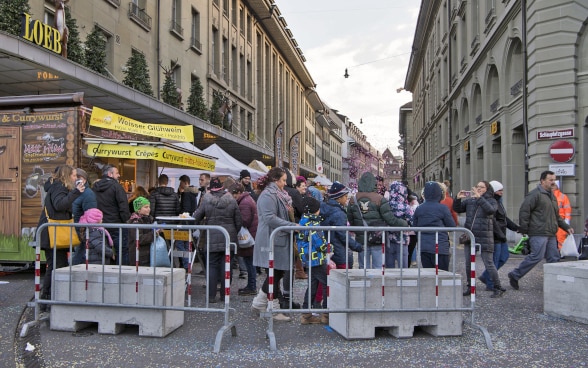
Every terrorist threat has its own root causes and its own dynamics of radicalisation and violence. To address this threat at its core and to be preventive, solutions need to be adapted to the specific context in the state concerned, taking into account the different needs of society to prevent radicalisation and violent extremism that can lead to terrorism. Women and youth can play an important role in this. "The fight against terrorism can only be successful if we look at the situation as a whole, taking into account all the factors that lead to radicalisation and violence. Thus, we can only succeed if we abide by the rule of law", underlined Riccarda Chanda, Deputy Head of the Permanent Mission of Switzerland to the United Nations in New York, at the Security Council.
01.02.2023 – Peace and security for millions of people in West Africa and the Sahel
The mandate of the United Nations Office for West Africa and the Sahel (UNOWAS) conferred by the UN Security Council was extended for a further three years. It covers 16 countries in the region, where millions of people face multiple, complex challenges that pose a threat to regional security. The commitment of UNOWAS is therefore crucial.
As the lead country for this dossier together with Ghana ('co-penholders'), Switzerland is contributing its expertise to the debates in the Security Council. It has long worked for peace and development in the Sahel, pursuing the same goals as UNOWAS, including protecting civilians, promoting sustainable peace and mitigating the negative impacts of climate change on security in the region.
A holistic approach is required for conflict prevention and promoting stability in the affected countries. Switzerland also represents this position in the Security Council as an actor on the ground. Central pillars of its work include climate security and the prevention of violent extremism.
Droughts or floods exacerbated by climate change threaten the livelihoods of many people and can forcibly displace them from their homes. This can further increase the potential for conflict. Switzerland also advocates in the Security Council that addressing these impacts be integrated into the solutions-based approach in the region. On the ground, Switzerland strengthens the resilience of the local population and works to preserve their natural resources. Switzerland is also committed to increasing the participation of women in political decision-making processes in the region.
The prevention of violent extremism is important for the sustainable security of the population in West Africa and the Sahel. In 2016, Switzerland, together with regional partners and UNOWAS, launched an initiative for regional talks on the prevention of violent extremism in Africa. Over 1,000 people regularly take part in this exchange. The focus is on approaches to prevention, networking of regional actors and positive alternatives to violent extremism in West Africa and the Sahel. The next round of talks will take place in Dakar at the end of February 2023. Carol Mottet from the FDFA's Peace and Human Rights Division talks about the context in the following interview.
30.01.2023 – Switzerland advocates a just solution to the Cyprus issue in the UN Security Council
Today, the UN Security Council unanimously extended the mandate of the UN peacekeeping forces in Cyprus (UNFICYP).
In 1960, the Republic of Cyprus became independent. Following the outbreak of violence between the Turkish Cypriot and Greek Cypriot communities on the island, the UN Security Council dispatched UNFICYP in 1964. UNFICYP has thus been contributing to stabilisation on the ground for decades. A setback followed in 1974, when Turkey invaded the northern part of the island and began occupying it. Although a ceasefire was concluded, the country remains divided to this day, without a formal agreement. UNFICYP maintains a buffer zone between the troops of both camps. This is to create the conditions for a political solution. The UN has also maintained political dialogue – for example on the Bürgenstock (2004), on Mont Pèlerin (2016) and in Crans-Montana (2017). Despite these efforts, a decisive breakthrough has so far failed to materialise.
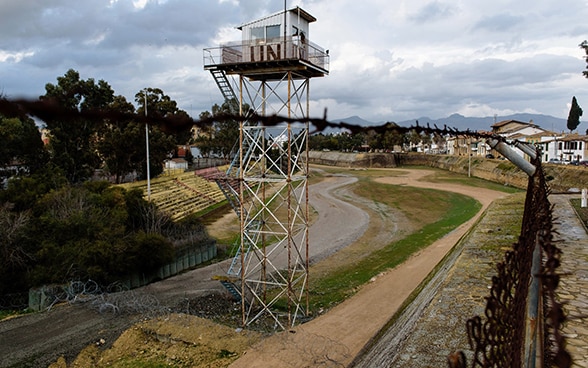
As a host for negotiations, Switzerland has thus been closely following the conflict in Cyprus for some time. It also provides financial support to institutions on the ground, such as the Committee for Missing Persons. As a member of the Security Council, Switzerland has now participated in the negotiations to extend the UNFICYP mandate. In the UN Security Council, Switzerland advocates a lasting, comprehensive solution that is fair to both sides. According to UN Security Council resolutions, this solution should be founded on the principle of a federation consisting of two community-based zones. In particular, Switzerland supports the appointment of a UN envoy to closely accompany the process towards a just and lasting solution to the conflict. In addition, Switzerland continues to offer to host reunification talks.
25.01.2023 – International Criminal Court gives voice to victims and survivors in Sudan
At its meeting on 25 January 2023, the UN Security Council addressed the conflict in the Darfur region of Sudan, which remains unresolved to this day. In 2003, various ethnic groups in western Sudan had rebelled against the government of dictator Omar al-Bashir, who was overthrown in 2019. In an attempt to quell these protests, some 300,000 civilians were killed and 2.5 million people displaced, according to UN figures. Shortly afterwards, the UN Security Council assessed the situation in Sudan as a threat to international peace and security. Conflict continues in the region to this day.
In 2005, the Security Council mandated the International Criminal Court (ICC) in The Hague to investigate genocide, war crimes and crimes against humanity in Darfur in order to bring those responsible – including al-Bashir – to justice. "This trial gives a voice to the victims and survivors. It underlines once again the preventive and reconciliatory role of the ICC: the Court is a vector for peace and security and thus shares the core of the mandate of this Council," said Swiss UN Ambassador Pascale Baeriswyl at the Security Council.
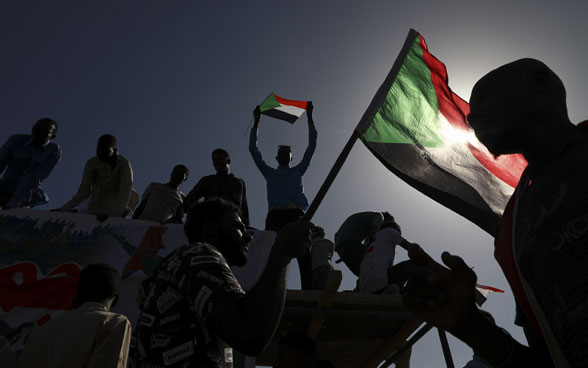
Switzerland, together with Japan, is the focal point for issues concerning the ICC at the Security Council. The ICC is a central institution for dealing with violent conflict in order to promote the foundations for reconciliation and thus sustainable peace. This is why Switzerland was also instrumental in the creation of the ICC in 2001. "For the ICC to be able to exercise its mandate effectively, independently and impartially, it relies on the support of all of us. In this sense, we call on all member states of the United Nations to fulfil their cooperation obligations," Baeriswyl underlined. Switzerland is committed to an efficient interaction between the ICC and UN organs such as the Security Council, to bring justice to the victims of violent acts in conflict through criminal justice and to fight the impunity of perpetrators.
Statement by Switzerland before the UN Security Council on the ICC's engagement in Sudan, 25.01.2023
13.01.2023 – Civilians in Ukraine pay a price that is far too high
The UN Security Council addressed the situation in Ukraine on 13 January. Switzerland marked its first Ukraine meeting as a Council member to once again strongly condemn Russia's military aggression against the Ukraine. It called on Russia to cease all hostilities and to immediately withdraw its troops.
Swiss UN Ambassador Pascale Baeriswyl underlined the far-reaching consequences of repeated Russian attacks on Ukraine's energy infrastructure, including the disruption of vital facilities such as hospitals and water supply systems. The protection of civilians is one of Switzerland's priorities in the UN Security Council. " I reiterate today Switzerland's call for a halt to all attacks on civilians and persons hors de combat, on civilian property and on essential infrastructure", Baeriswyl stressed.
Efforts are needed to find peaceful, just and lasting solutions. In addition to its engagement at the diplomatic and multilateral levels, Switzerland is also working bilaterally to alleviate the humanitarian crisis in the war-torn country. Switzerland stated in the Council it will continue its engagement directly in Ukraine. The engagement takes the form of contributions to partner organisations, the delivery of humanitarian goods such as mobile generators or heating equipment and through supporting the reconstruction efforts in Ukraine, which were launched in Lugano in the summer of 2022.
"As members of this Council, it is our responsibility to do our utmost to ensure that this year is a year of just peace, in accordance with international law, in Ukraine and elsewhere in the world", Baeriswyl underlined in her vote.
Declaration by Switzerland at the UN Security Council, 13.01.2023
12.01.2023 – Federal Councillor Ignazio Cassis calls for respect of the UN Charter in the Security Council
Federal Councillor Ignazio Cassis took part in a UN Security Council ministerial debate on the rule of law in New York on 12 January.
In his address, the Mr Cassis called on UN member states to respect international law and adhere to the principles of the UN Charter. The Charter prohibits the threat or use of force targeted at the territorial integrity or political independence of another state. "The principles of the Charter are being put to the test today. They have been flagrantly violated in the case of the Russian military aggression against Ukraine," Mr Cassis stressed at the Council.
He continued: "The work of international bodies such as the Human Rights Council, the International Criminal Court and the various UN investigation and fact-finding mechanisms is of great importance. It is crucial that all states, as well as the Security Council, cooperate fully with these bodies." Switzerland will work towards further strengthening rule of law during its tenure in the Security Council.
Mr Cassis took part in the debate on the rule of law at the invitation of Japan. Like Switzerland, Japan is a non-permanent member of the UN Security Council since the beginning of the year. It holds the presidency of the Council in January.
Address by Federal Councillor Cassis at the UN Security Council, 12.01.2023
09.01.2023 – UN Security Council renews cross-border humanitarian aid into Syria
On 9 January 2023, the United Nations Security Council extended unanimously the mandate for cross-border humanitarian aid in Syria until 10 July. Together with Brazil, Switzerland introduced the respective resolution in the Security Council as co-penholder of the Syria humanitarian file.
The cross-border resolution allows UN agencies to provide humanitarian aid in north-western Syria, where more than 4 million people depend on it. Most live in camps or temporary shelters. Each month, around 800 lorries cross the Bab-al Hawa border from Turkey into Syria to deliver humanitarian goods. The cross-border humanitarian aid encompasses food, assistance regarding emergency shelters, education, the protection of the civilian population, and health, as well as equipment required to provide water and sanitation.
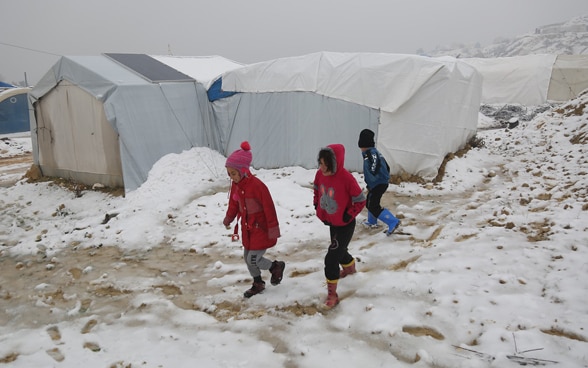
With the Syria file, Switzerland has taken on a crucial Security Council dossier. Council members have long held divergent views on the issue of humanitarian aid on the ground. After the last attempt to extend the mandate in July 2022 failed due to a veto, a compromise was reached to extend the mechanism by six-months. The council once again extended unanimously the mandate for a six months period. The Council's cross-border resolution has enabled the delivery of humanitarian aid across the border into Syria since 2014. The Council has renewed it since it was first adopted.
UN Security Council renews cross-border humanitarian aid into Syria, press release, 09.01.2023
03.01.2023 – Switzerland takes its seat on the UN Security Council
Today, Switzerland took up its work in the UN Security Council. Activities are already in full swing in Bern and at the mission in New York. Currently, the focus of the staff is on preparations for the upcoming Security Council meetings on the situation in Syria and West Africa, as well as reporting to the Federal Council and Parliament.
Especially in the current global context with its various crises, membership of the Security Council is an important opportunity. The UN Security Council has a significant role to play for peace in the world. In addition to the five permanent members (China, France, Russia, the USA and the United Kingdom), the following ten states are non-permanent members in 2023: Albania, Brazil, Ecuador, Gabon, Ghana, Japan, Malta and Mozambique, Switzerland and the United Arab Emirates.
Speech Pascale Baeriswyl, 03.01.202
Switzerland takes its seat on the UN Security Council, Press release 03.01.2023

